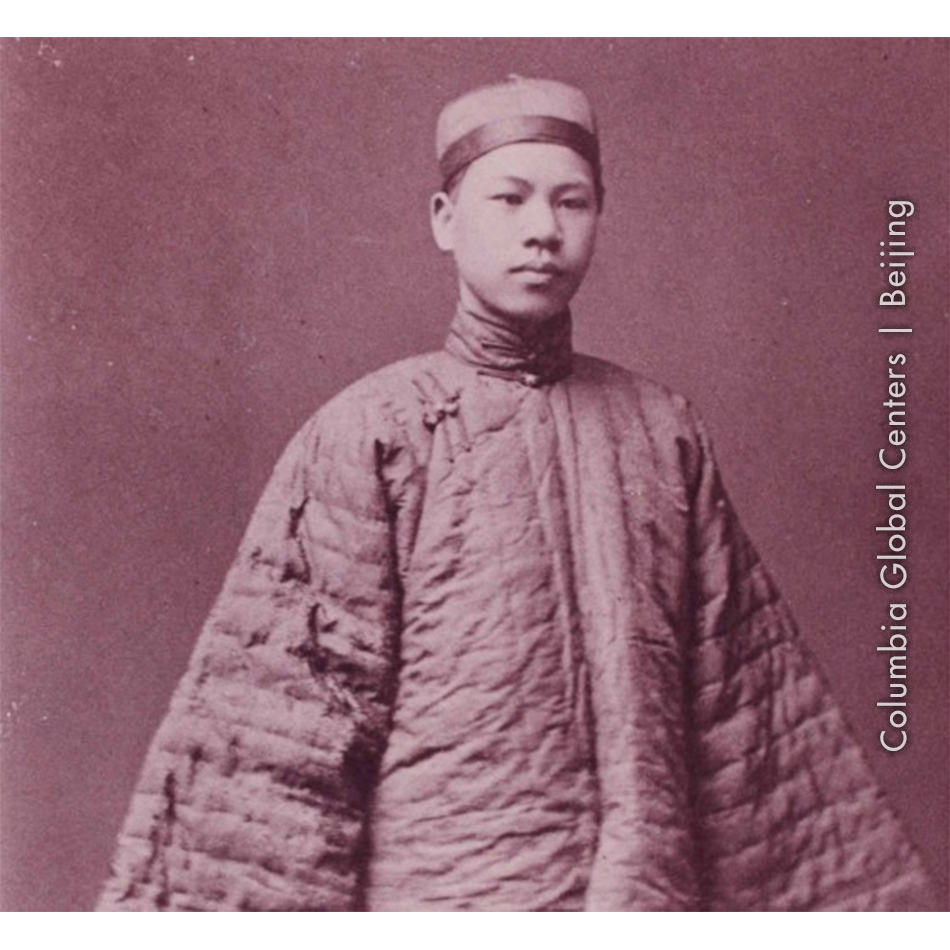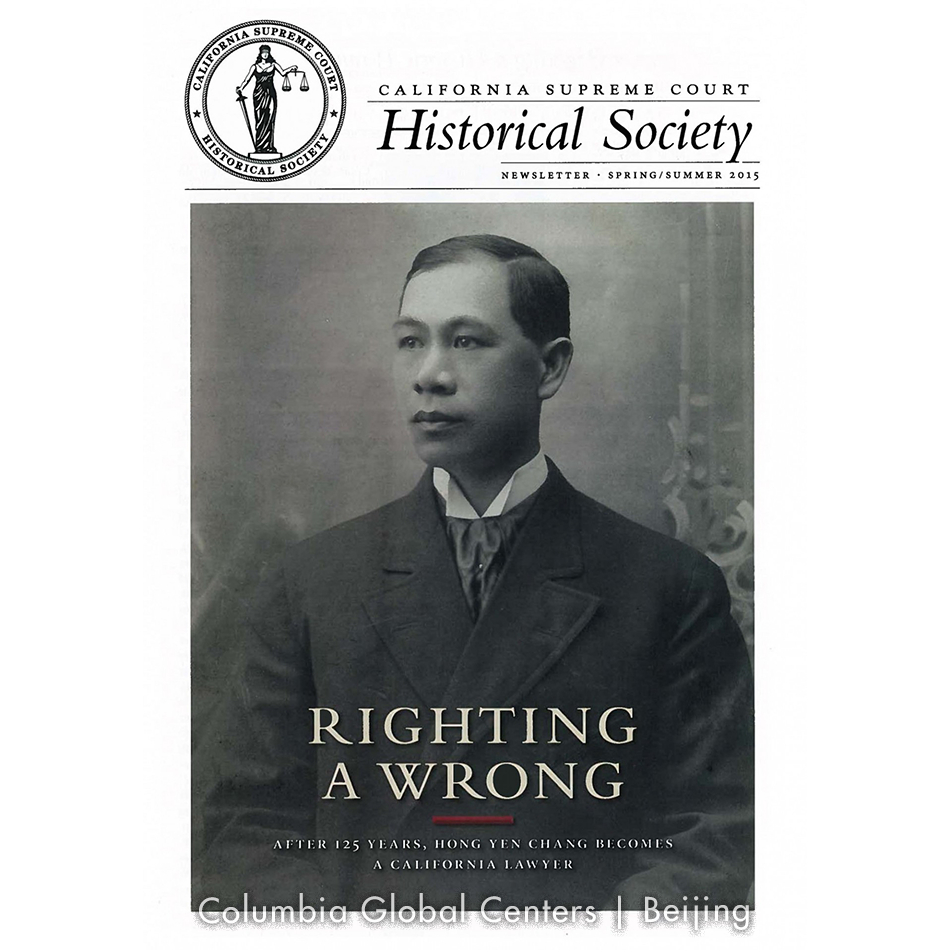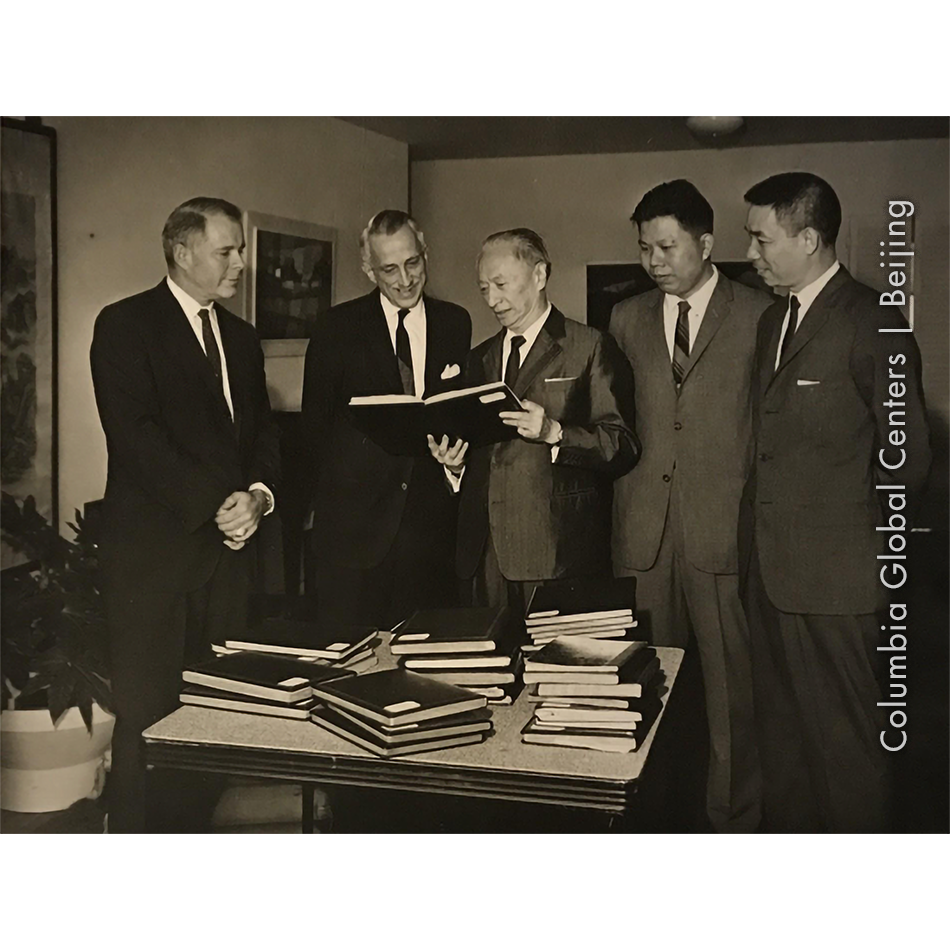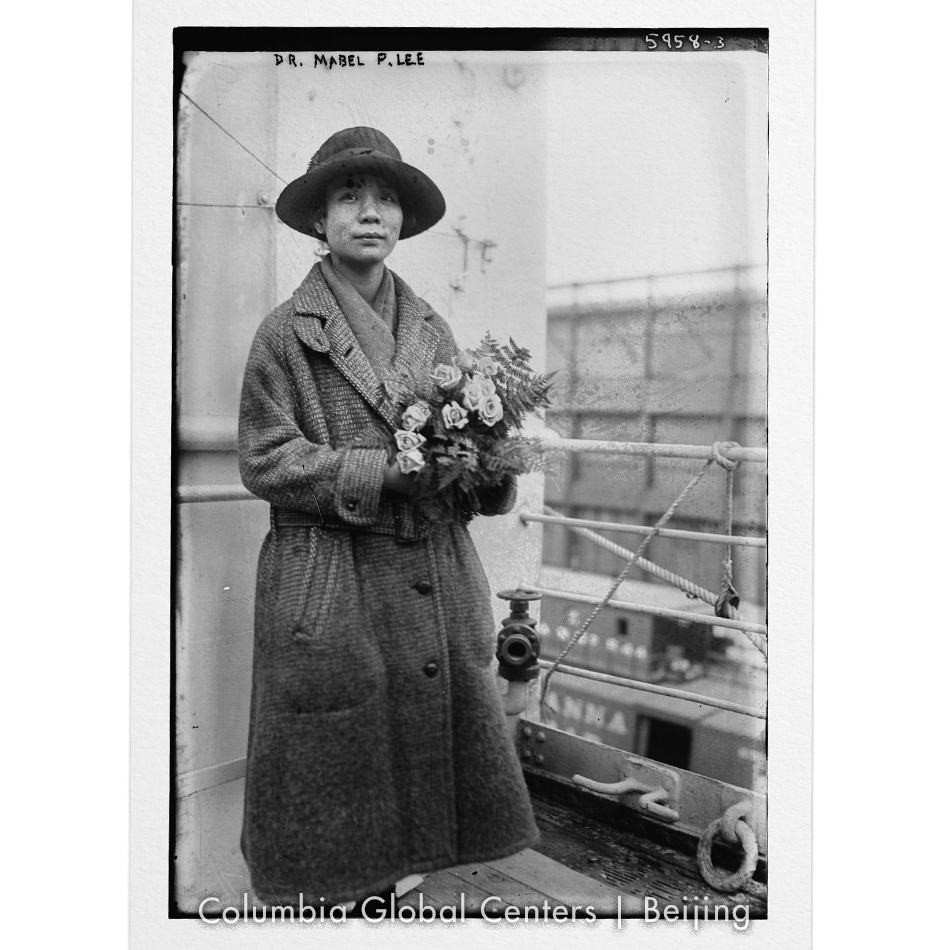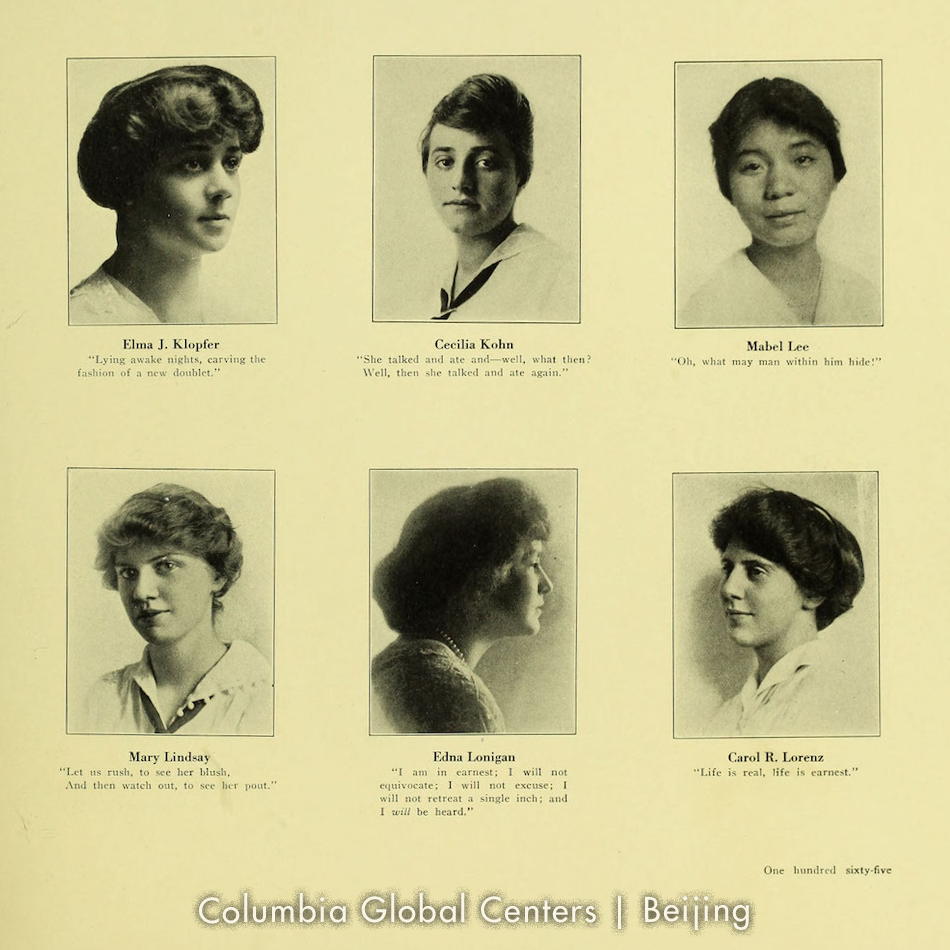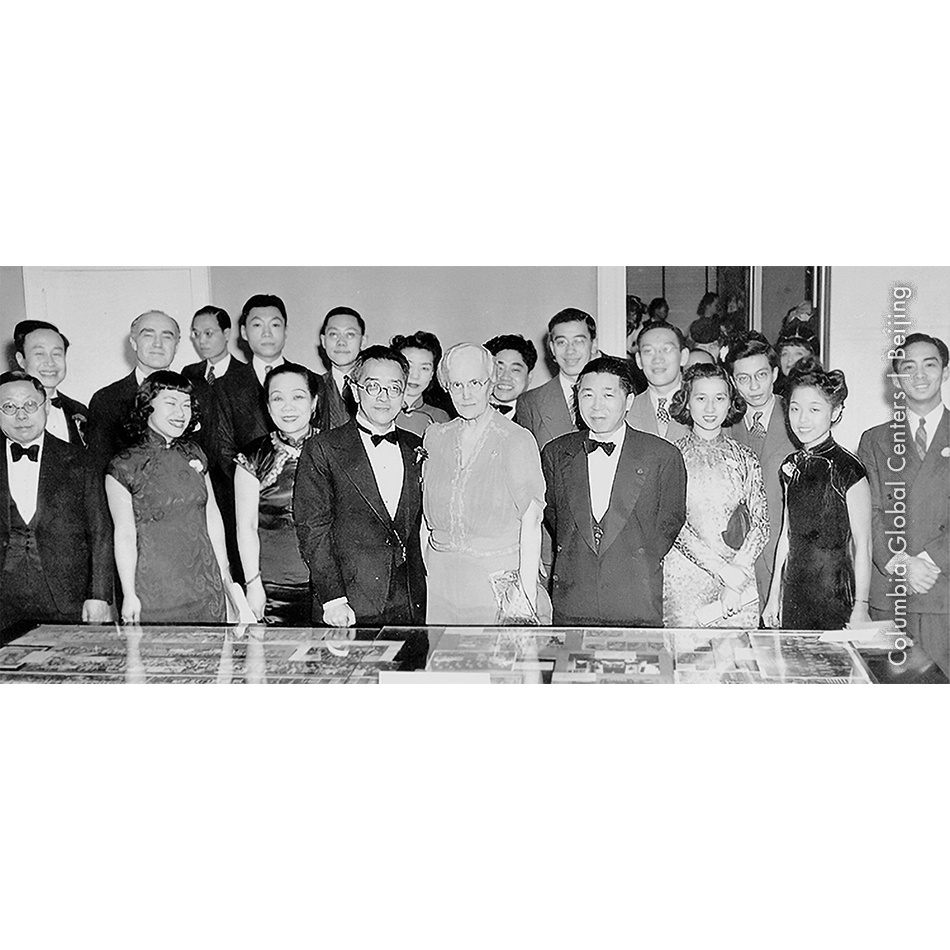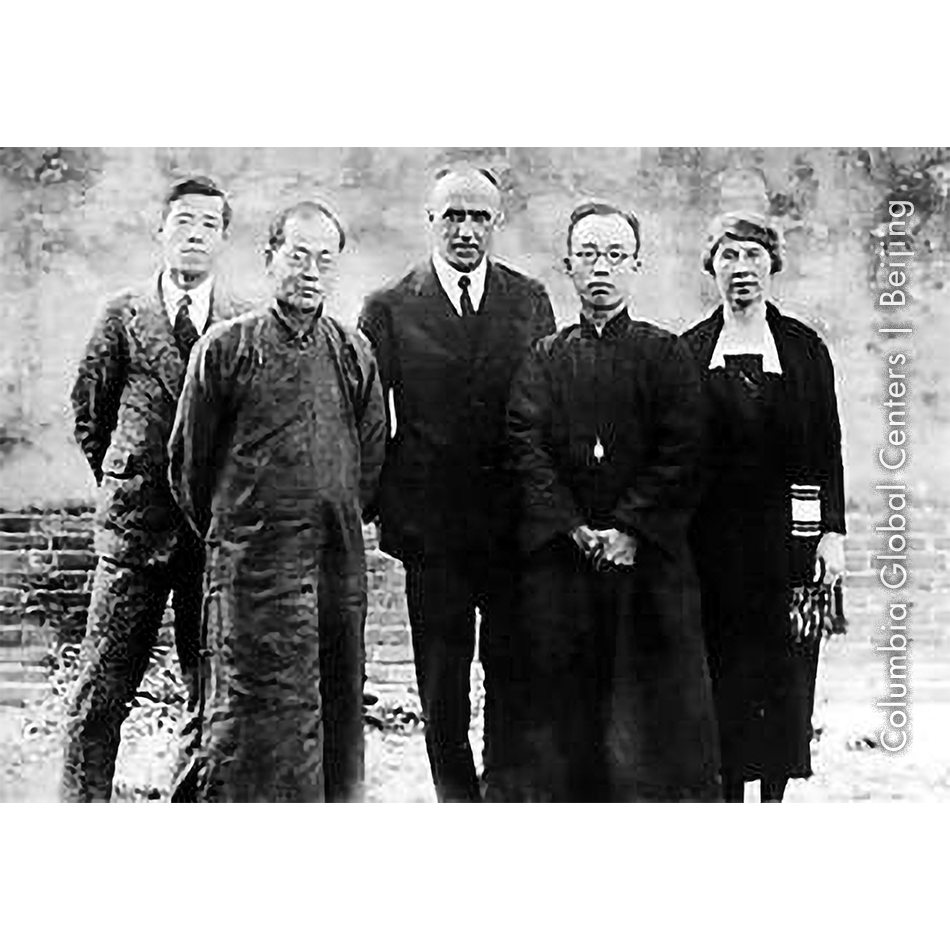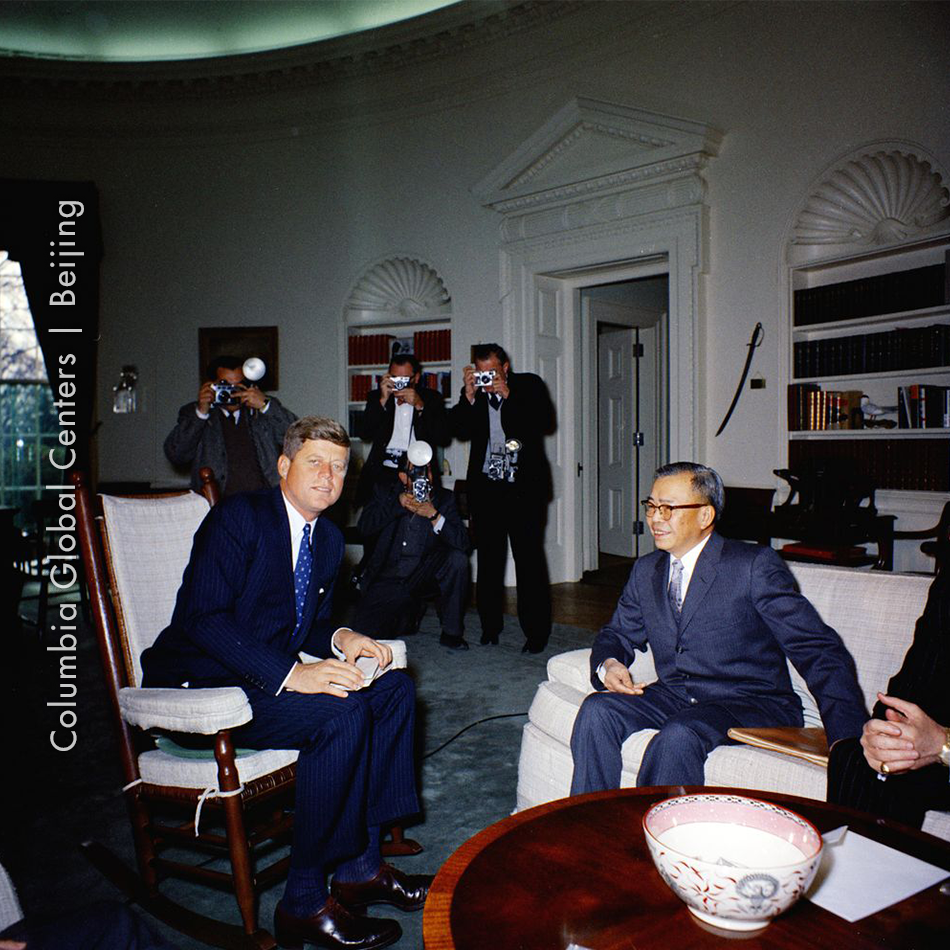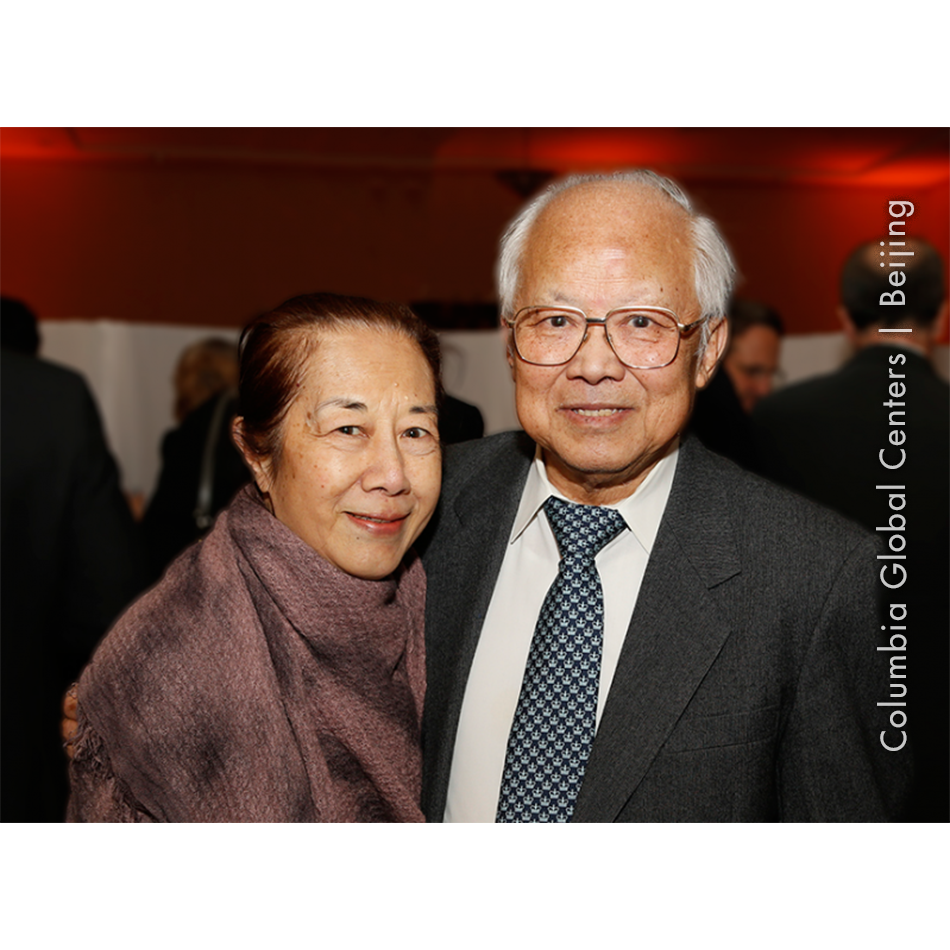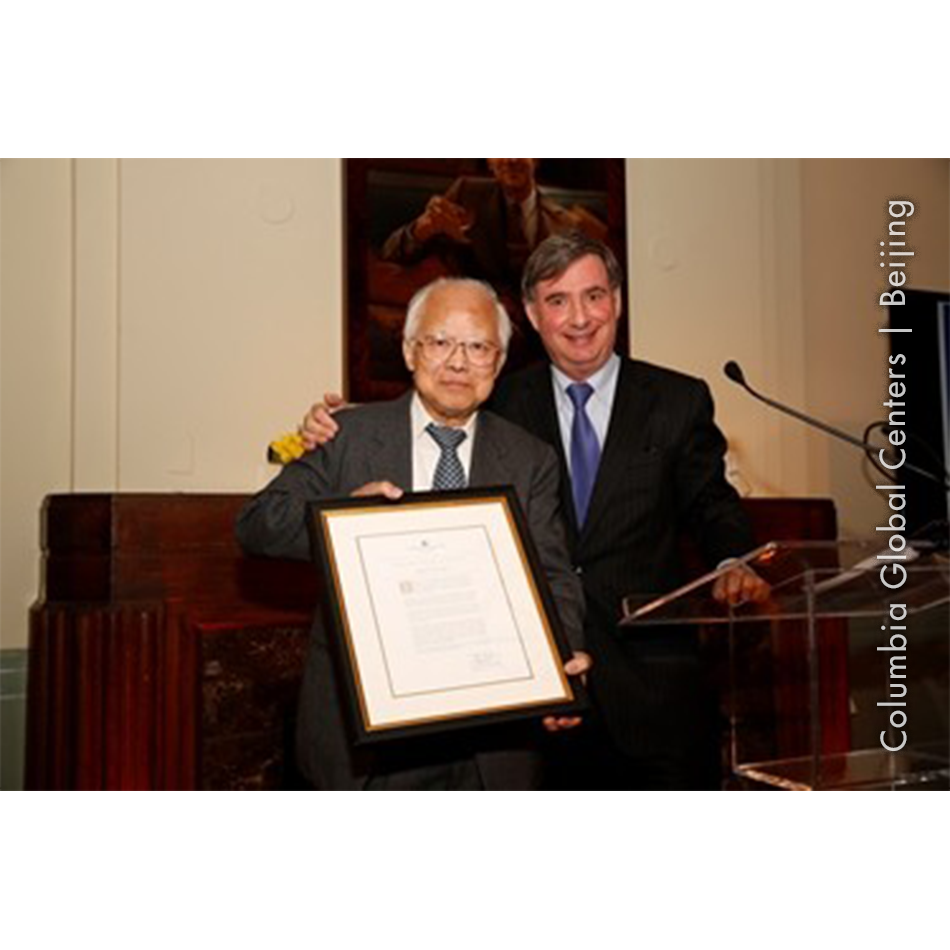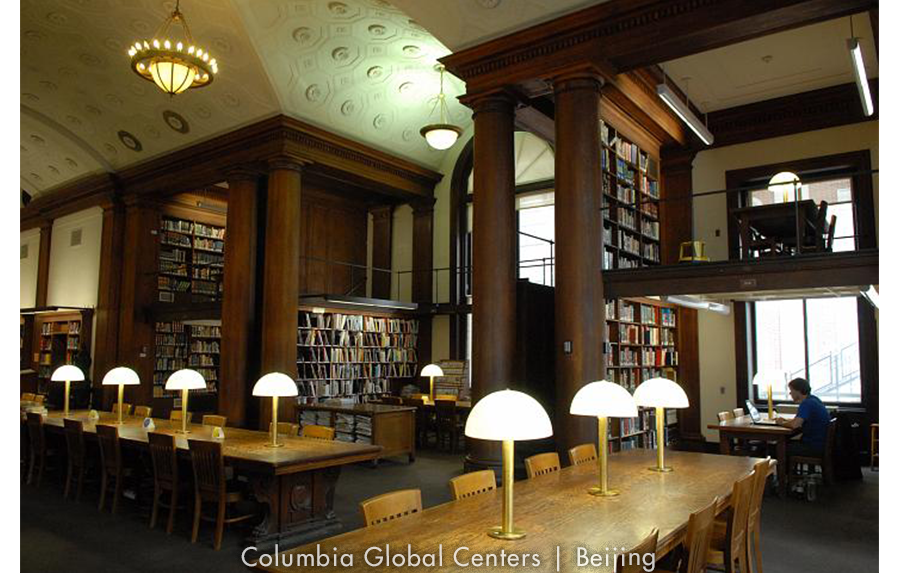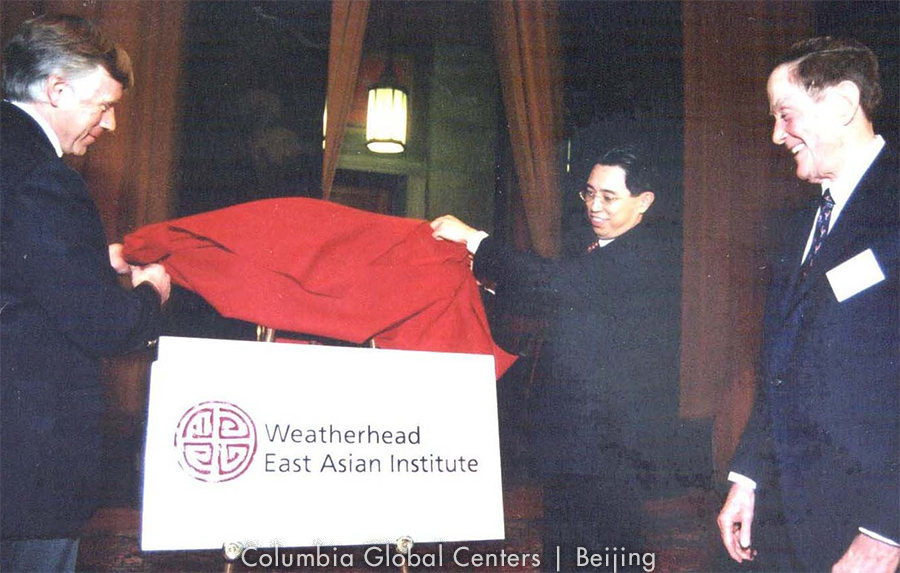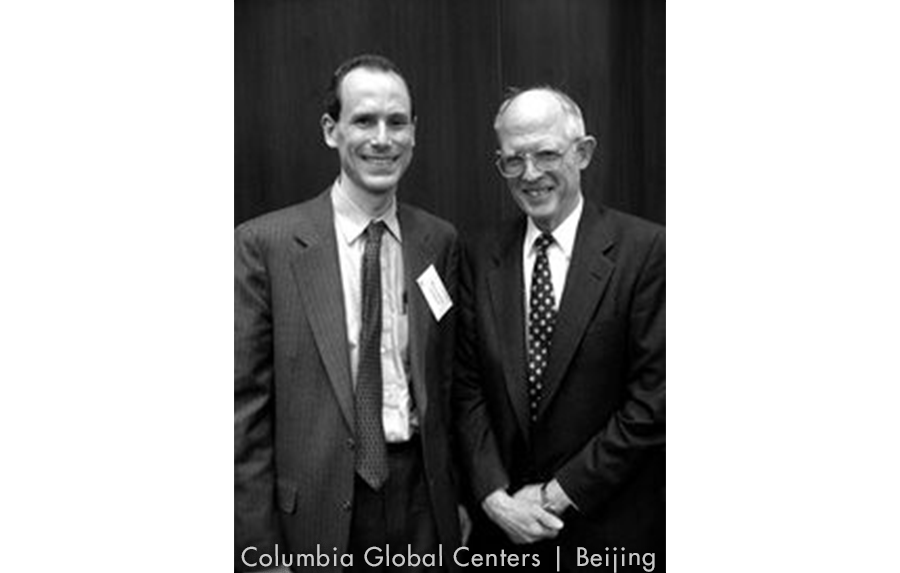The “Columbia University and China” history series, launched by Columbia Global Centers | Beijing, is aiming to retrospect the close relationship between the University and China that spans over a century to honor and extend its profound influence.
The connection between Columbia University and China can be traced back to the Qing Dynasty in the late 19th and early 20th centuries. In 1871, suggested by Yung Wing (1828-1912), the first Chinese student to graduate from an American university, the Qing government initiated the Chinese Educational Mission, sending a group of Chinese students to live and study in New England, where they received American college education.1 TANG Shaoyi, the first Prime Minister of the Republic of China2, WU Yangzeng, one of the primary founders of the modern mining engineering in China3, and ZHOU Changling (also known as Shouson Chow), a successful businessman and a pioneer in the development of Chinese telegraphy technology4, pursued their study at Columbia University5. Although they were called back by the government before finishing college due to political interference, these predecessors greatly contributed to the modernization of China in many of the key sectors, such as philosophy, education, literature, chemical engineering, business, law, and politics6.
Starting from 1909, a remarkable group of Chinese students came to study at Columbia University under the guidance of world-renowned scholars like John Dewey and Paul Monroe7, which included TAO Xingzhi, a leading educator and reformer applying liberal ideas to the Chinese education system8, CHANG Poling, the founder of Nankai system of schools and the early advocates of Olympic game promotion in China9, KUO Ping-wen, the founder of the first Chinese modern university, National Southeastern University, JIANG Menglin, the former president of Peking University and National Chekiang University10, and HU Shih, a prestigious Chinese philosopher and writer. This group of pioneers adapted progressive education ideas to Chinese conditions and initiated reforms that laid the foundation for the modern Chinese education system11.
Till today, generations of Chinese students and scholars came to Columbia University to work towards their academic goals and broaden their view. Their achievements as scientists, educators, artists, investors, business leaders, doctors, and lawyers have been widely recognized by both their nation and the world. According to the incomplete statistics from the International Students and Scholars Office at Columbia University, in 2020, there were more than 6,200 Chinese students in the 16 schools of the University12. Their footprints have been scattered throughout the campus and their outstanding performances have added to the uniqueness and essence of the Columbia community.
Columbia Global Centers | Beijing, as an important regional hub for the University community and the Global Centers network in East Asia, has been striving for enriching learning experience and increasing global engagement of Columbia students and alumni.
An ancient Chinese proverb says “A journey of a thousand miles begins with a single step” (千里之行,始于足下). The “Columbia University and China” history series will dig into the ties between the University and China to reflect on the huge legacy, in the hope of inspiring more intercultural communication and collaboration that generate a deeper understanding between the U.S. and China.
(References see bottom of the page)
MEMORABLE MOMENTS & OCCASIONS
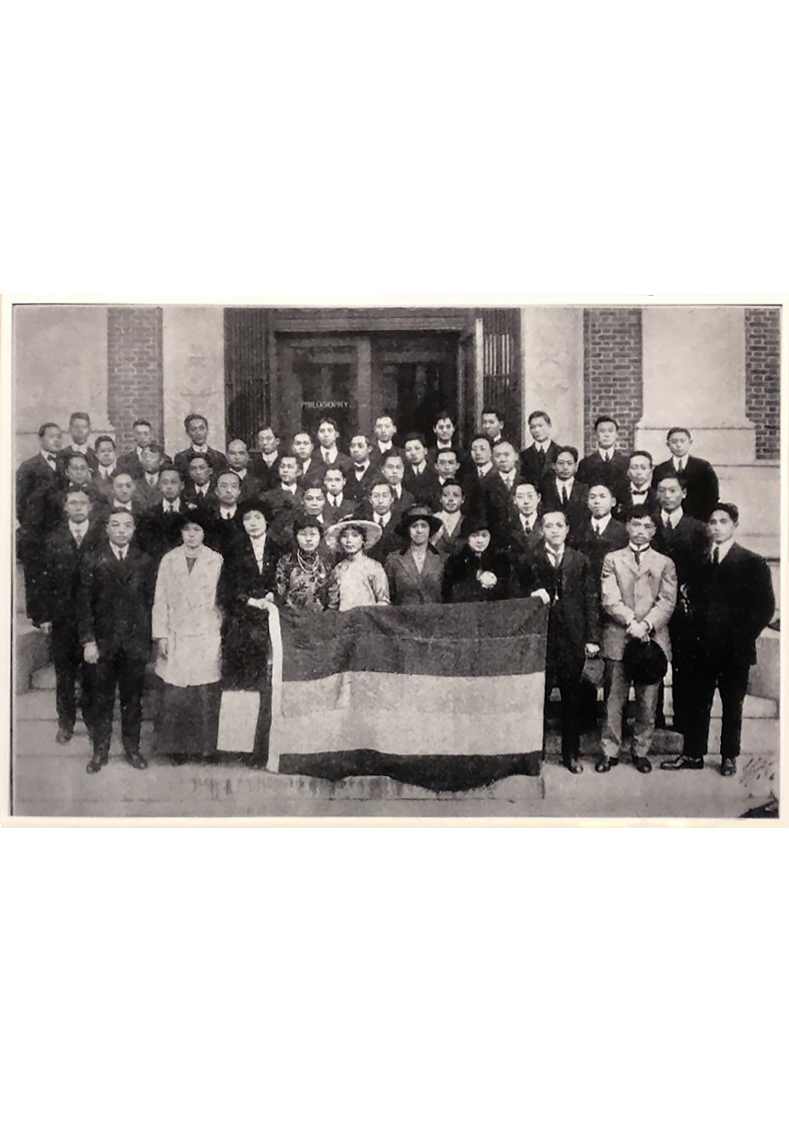
Chinese Students' Monthly, June 1910, No.8
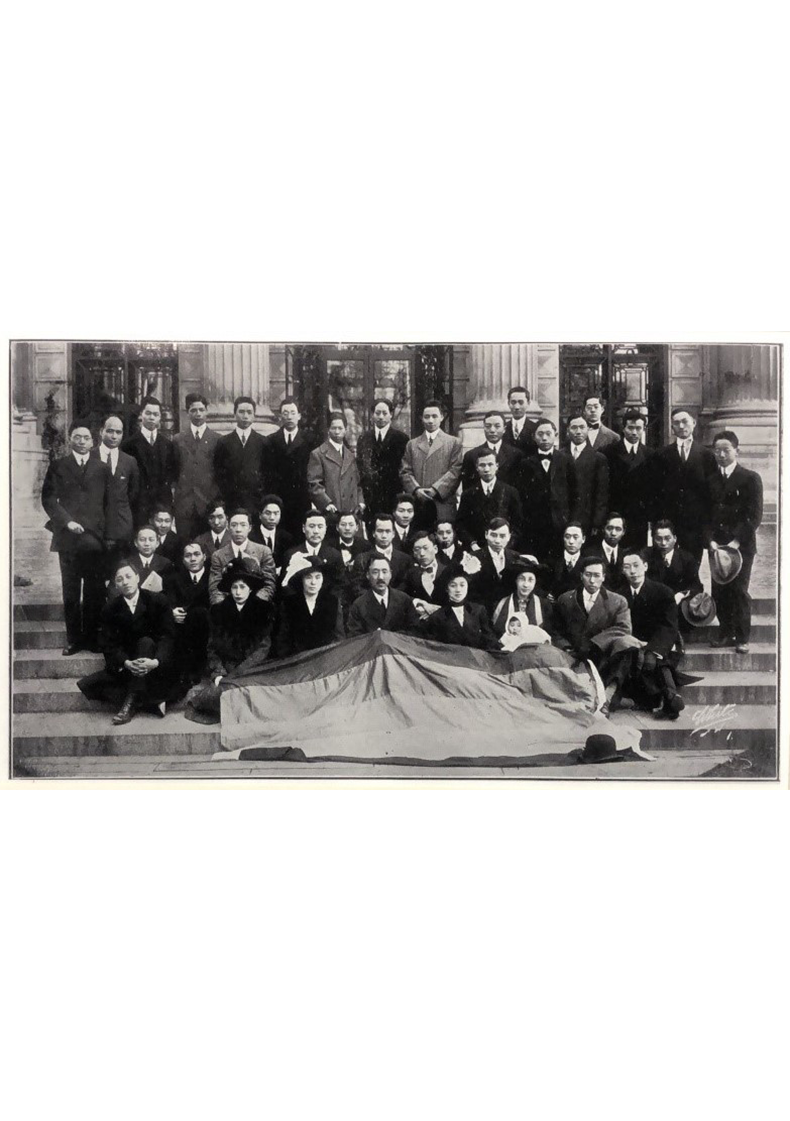
Chinese Students' Monthly, Nov. 1912
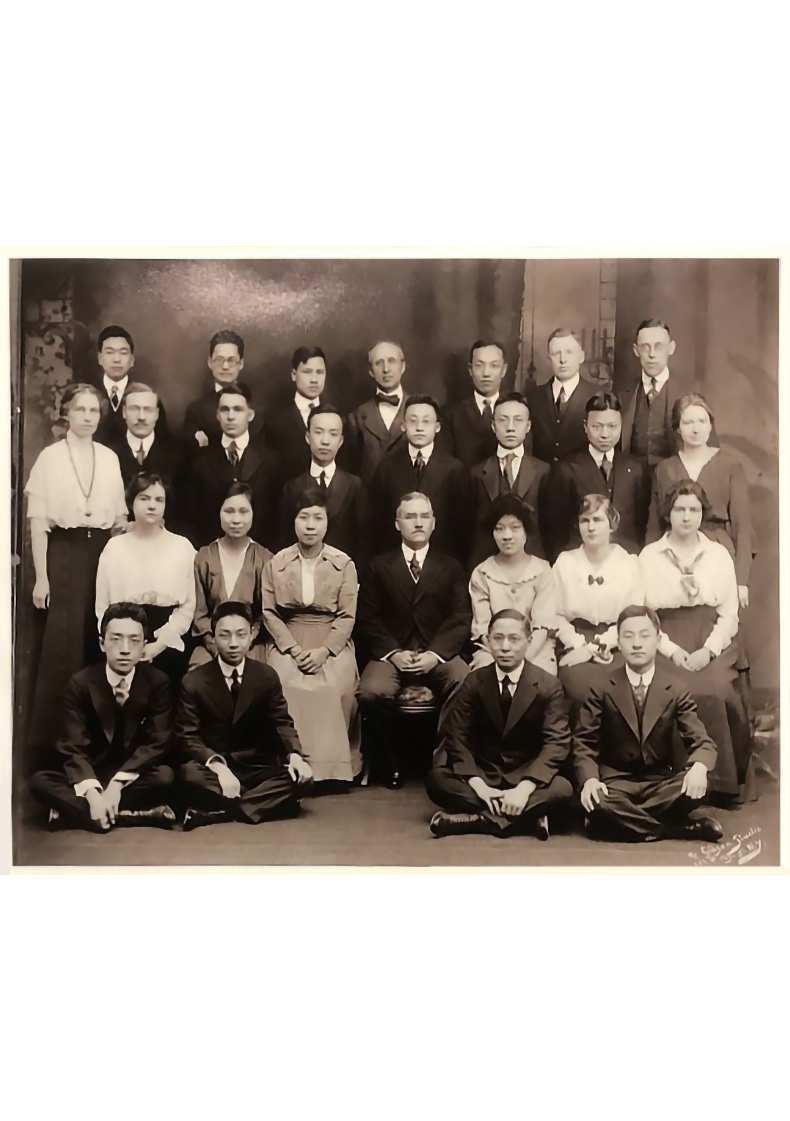
In the middle is Professor Paul Monroe. Jiang Menglin, Hu Shi, Sun Ke, Tao Xingzhi, Lin Bing. Upon their return to China, these members became the initiators of the May Fourth New Culture and New Education Movements that changed the outlook of China in the educational field.
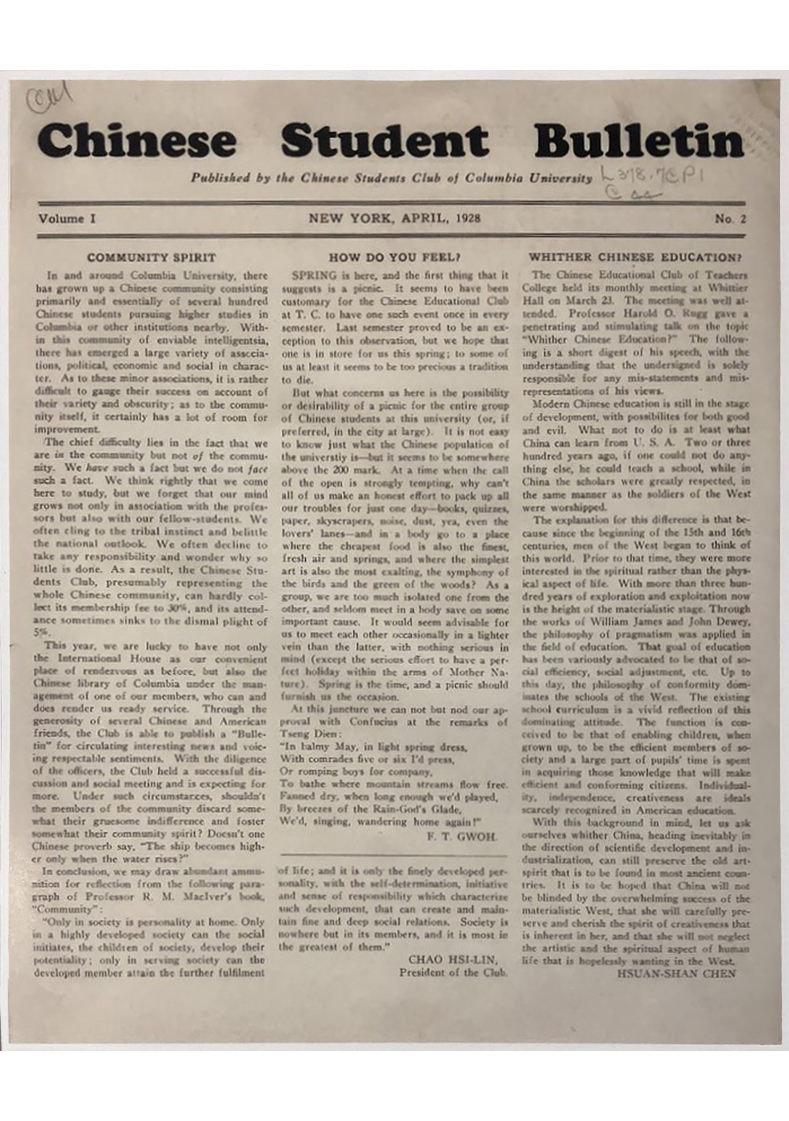
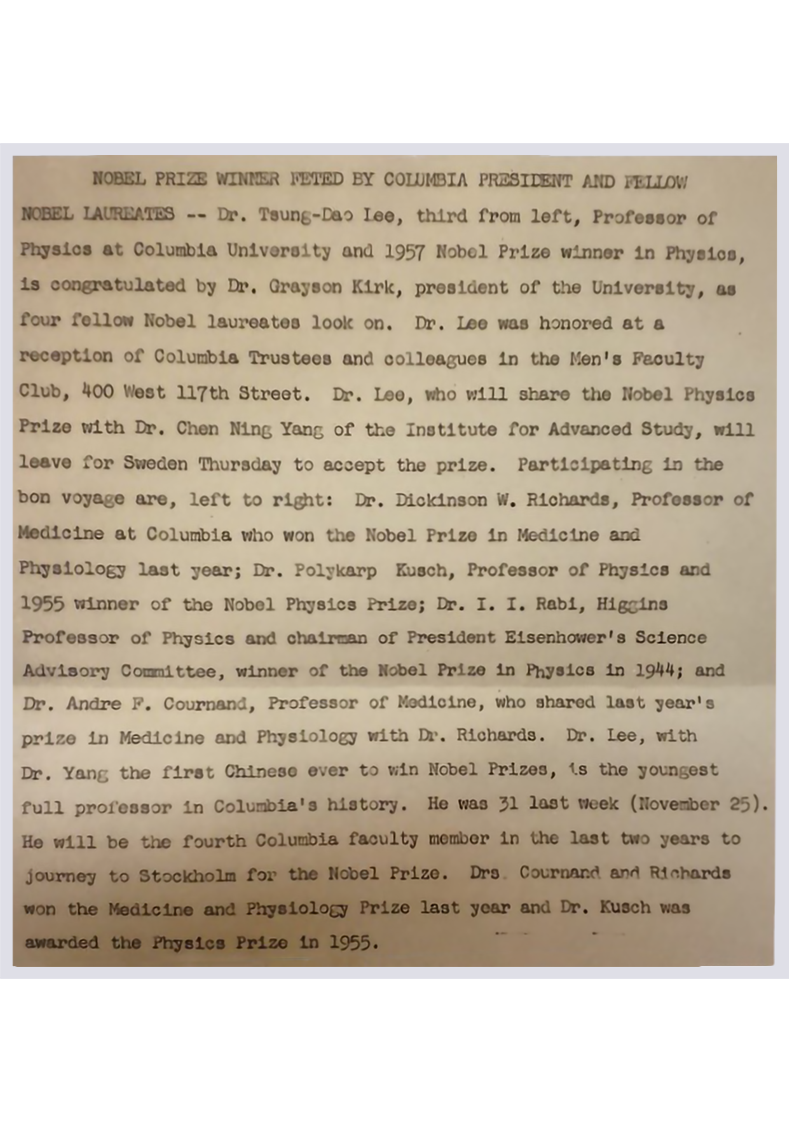
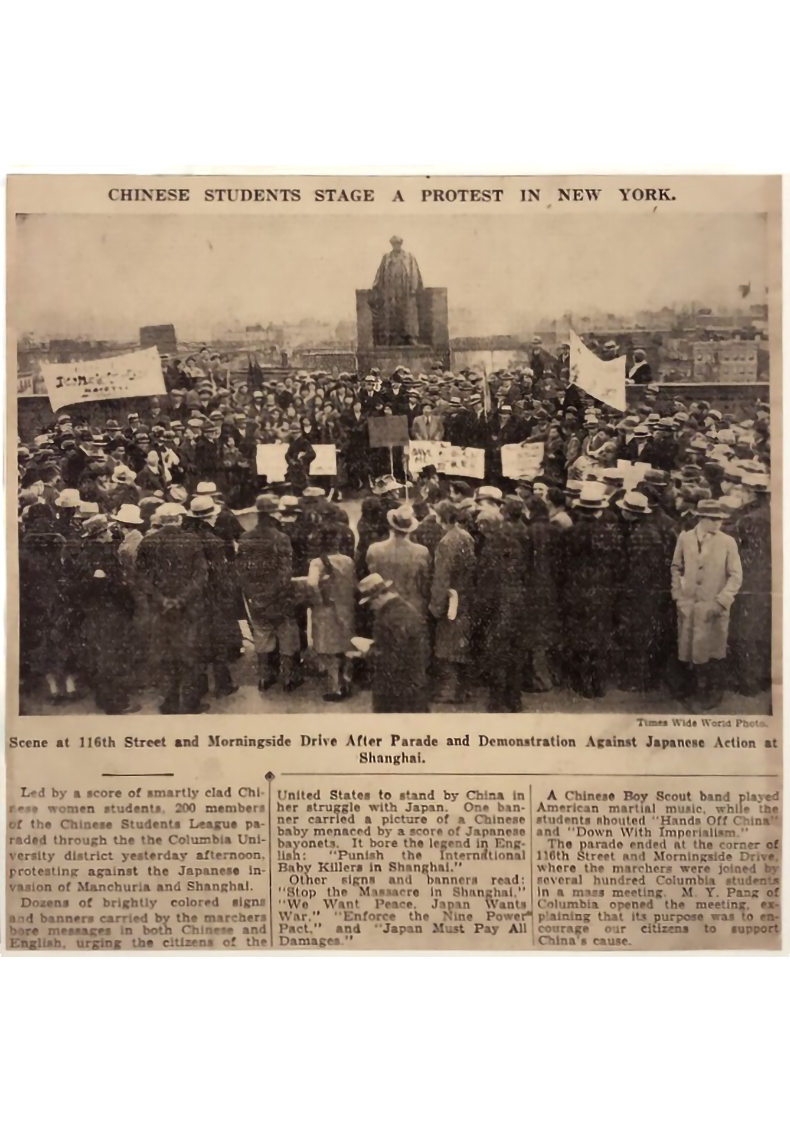
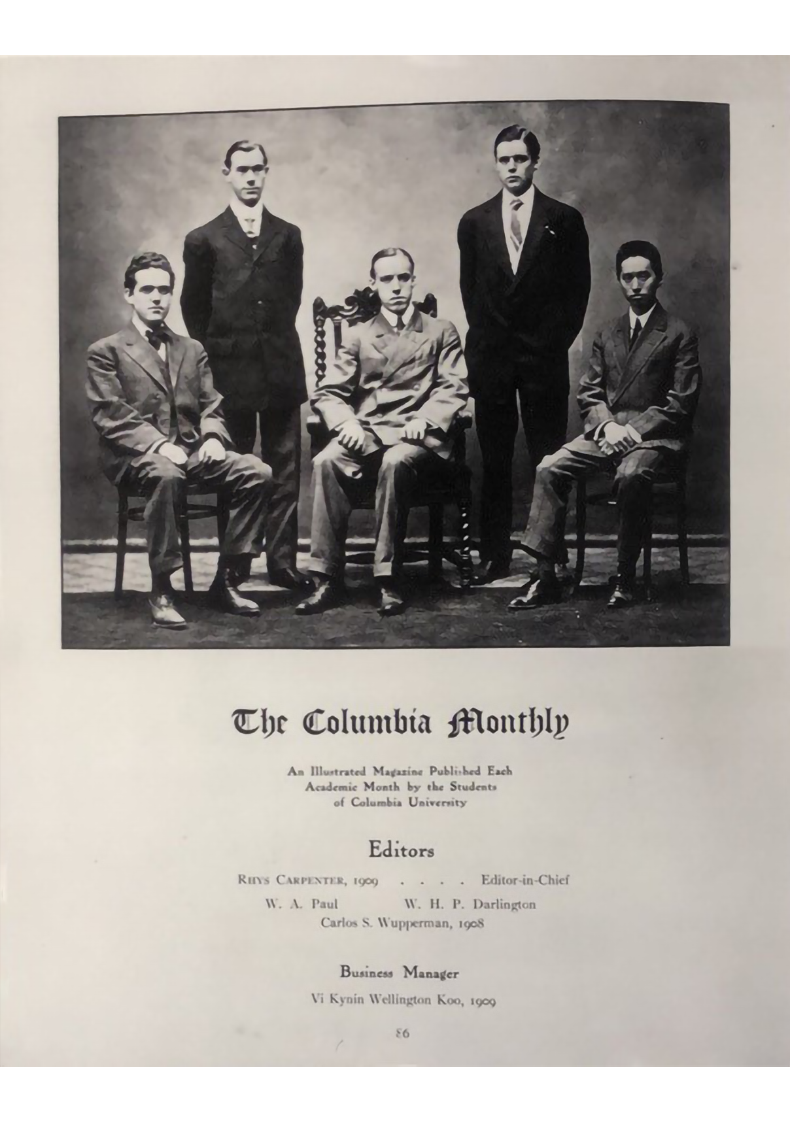
Business Manager 1909
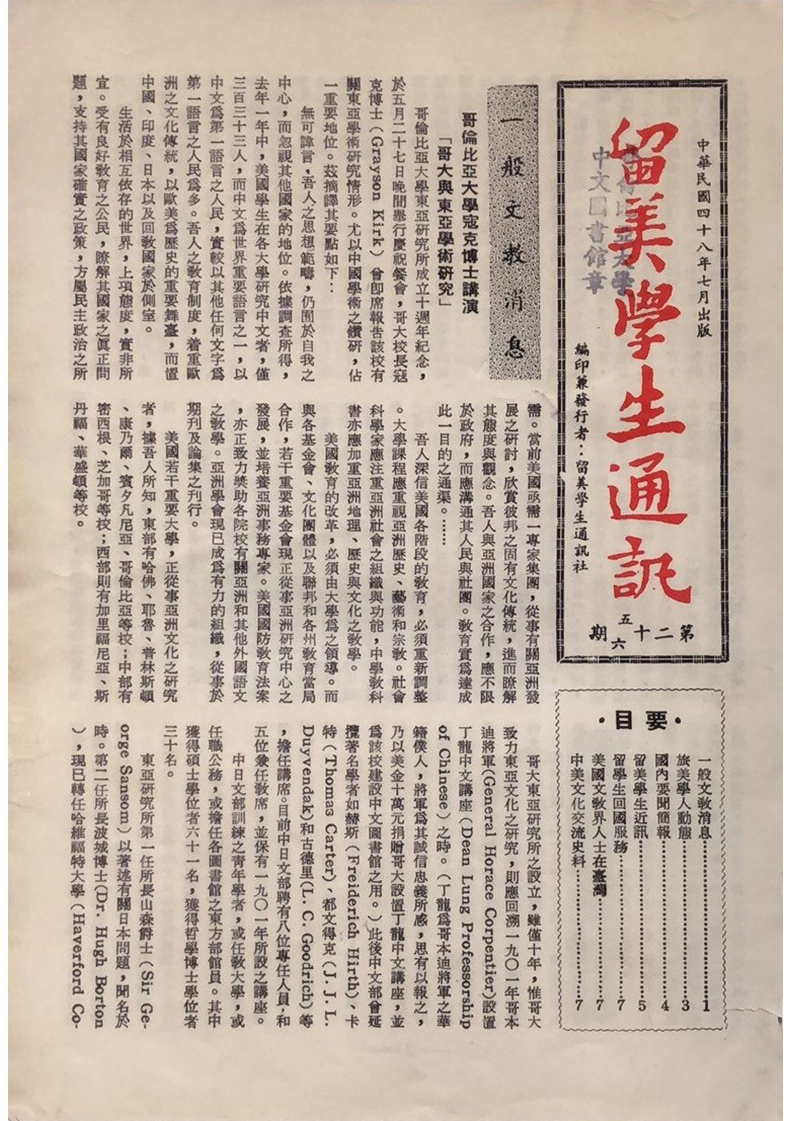
Published in Liu Mei Xue Sheng Tong Xun (1959)
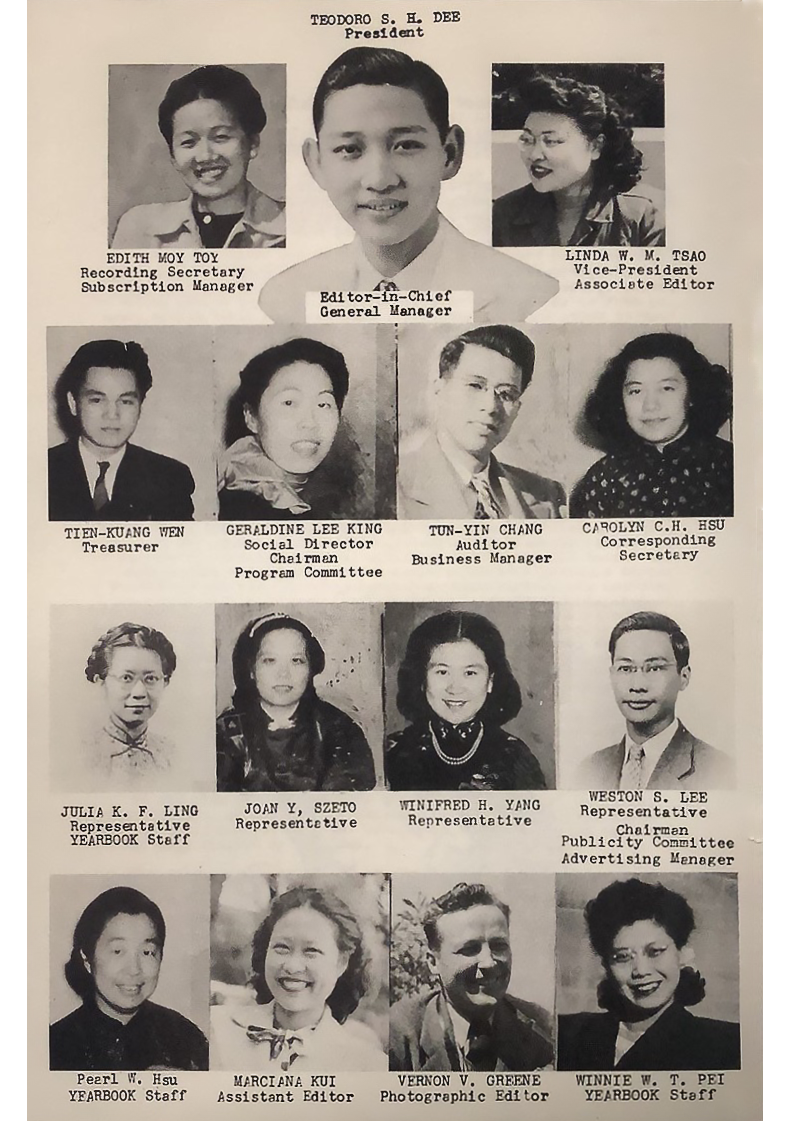
NOTABLE ALUMNI OF CHINESE ORIGIN
Listed roughly by date of admission to the university.
张康仁 Hong Yen Chang
- Enrolled at Columbia Law School in 1883, was the school's first Chinese graduate;
- Was one of the first batch of Educational Mission students the Qing government sent abroad to study in the United State in 1872;
- After a two-year pursuit, he was finally admitted to the New York Bar by special act of the New York State legislature in 1888; he was the first Chinese American to be admitted as a lawyer in the United States;
- Chang moved to California in 1890 hoping of serving the large Chinese community of San Francisco as a lawyer, he sought admission to the California State Bar, but he was denied under the federal Chinese Exclusion Act; In 2015, Chang was granted posthumous admission to the California State Bar;
- Joined the Chinese Diplomatic Service, rising to the role of chargé d'affaires at the Chinese embassy in Washington, D.C.;
- As of January 1, 2021, Columbia Law School's Center for Chinese Legal Studies will be known as the Hong Yen Chang Center for Chinese Legal Studies (Read More).
唐绍仪 Tang Shaoyi
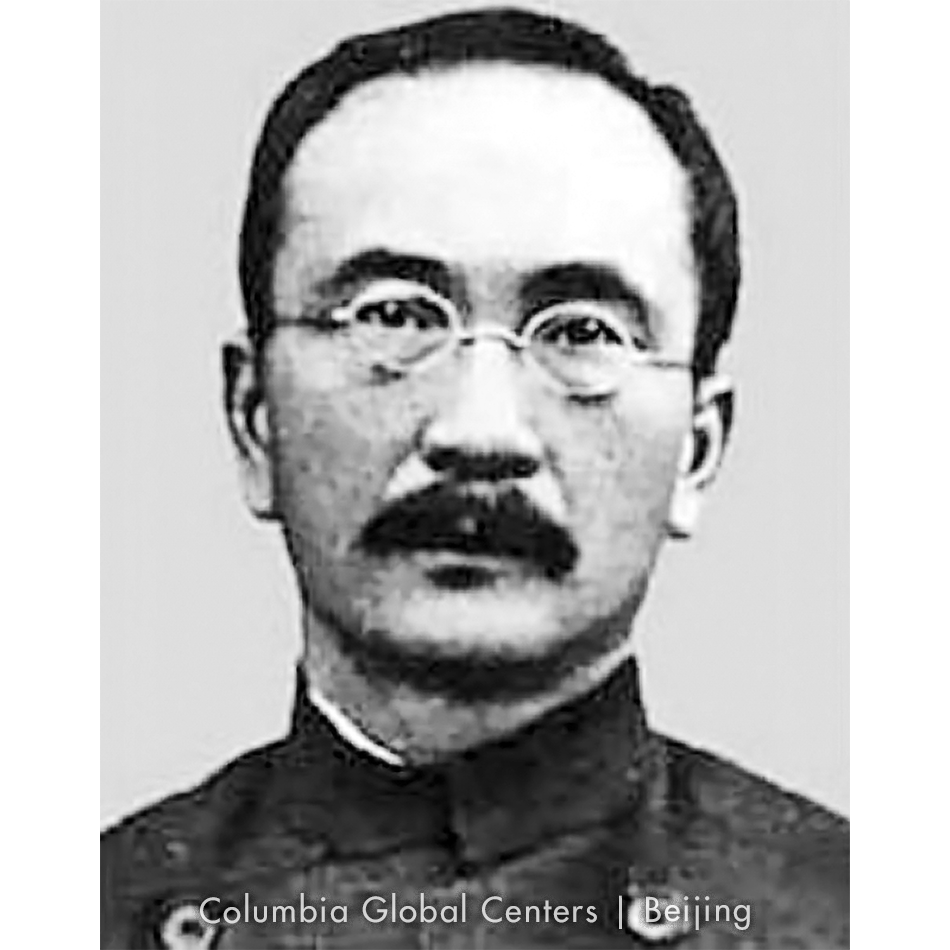
- Amongst the third batch of international students sent by the Qing government to study in the United States in 1874, later studies at Columbia University for a B.A.;
- Political activist and diplomat in the late Qing Dynasty and the early Republic of China also served as the president of the National Peiyang University (now Tianjin University) and Shandong University;
- Later served as the consul-general in the DPRK, the National Railway Corporation Supervisor, and the Minister of the Taxation Office;
- Contributed greatly to China's sovereignty, diplomatic rights and the promotion of democracy and republic.
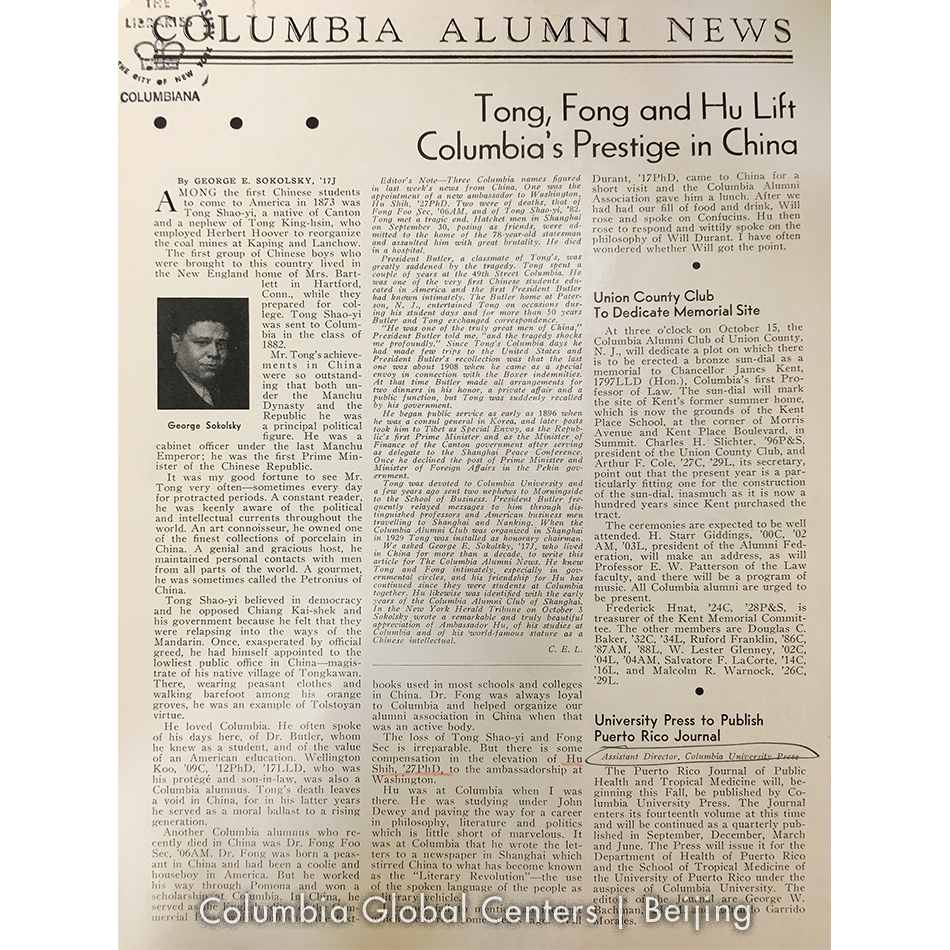
丁龙 Dean Lung
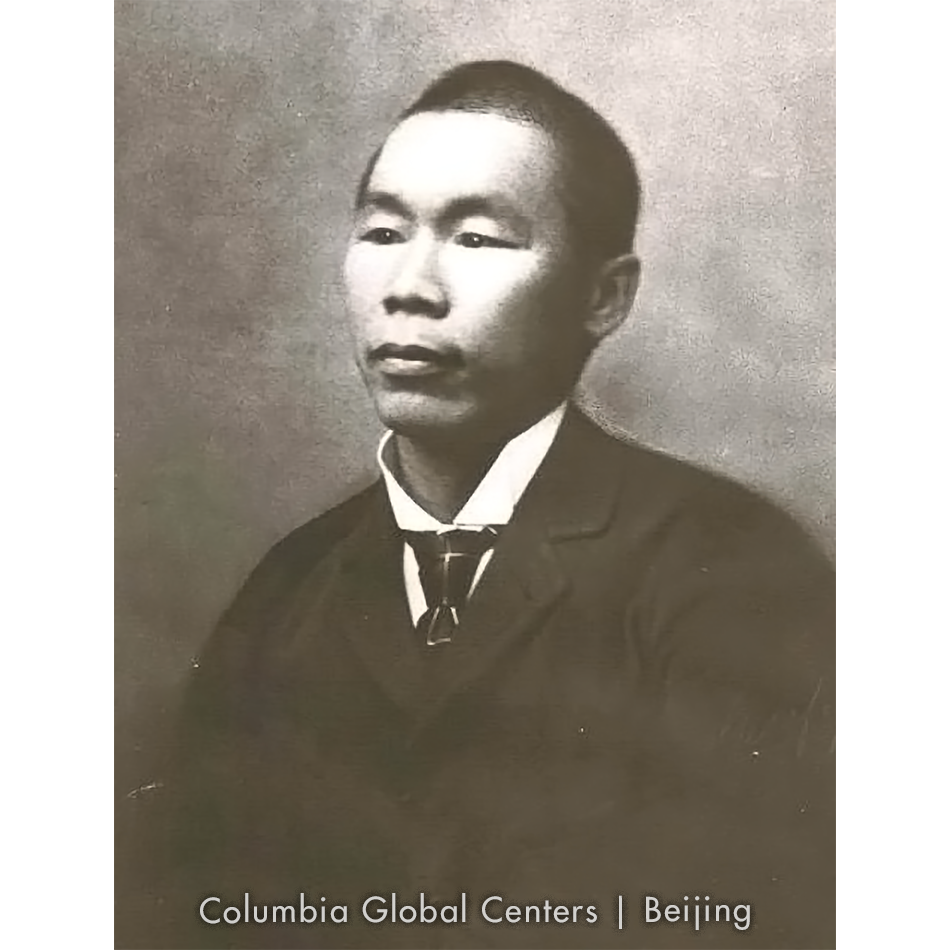
- The letter signed by "Dean Lung, a Chinese Person" was written to Columbia University President Seth Low by the valet of University Trustee General Horace Walpole Carpentier in 1901.
- Valet to wealthy Columbia Trustee, Lung donated $12,000, the majority of his savings for promoting "Chinese Learning" at Columbia in 1901. The following year, Columbia appointed its first Professor of Chinese.
- Inspired by Lung's remarkable generosity, Carpentier later donated $200,000 of his own fortune, which would go on to establish the Department of East Asian Languages and Cultures, as well as establish the Dean Lung Professorship, in honor of his old friend.
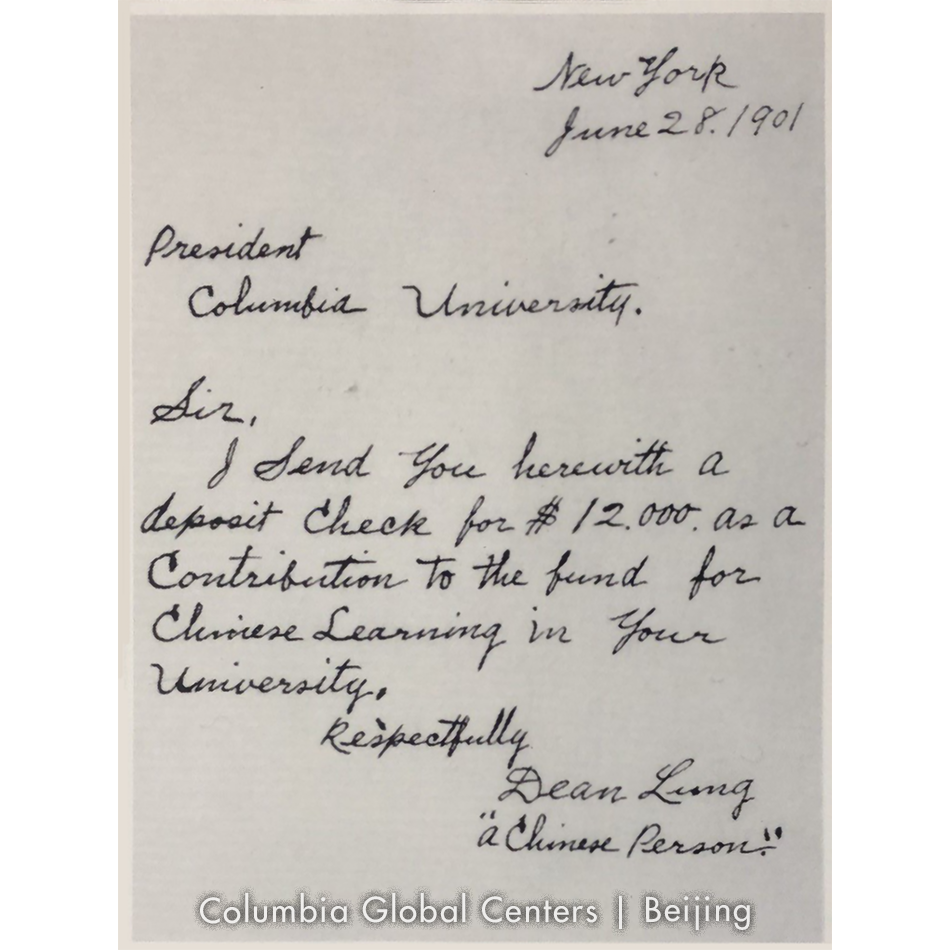
顾维钧 Wellington Koo
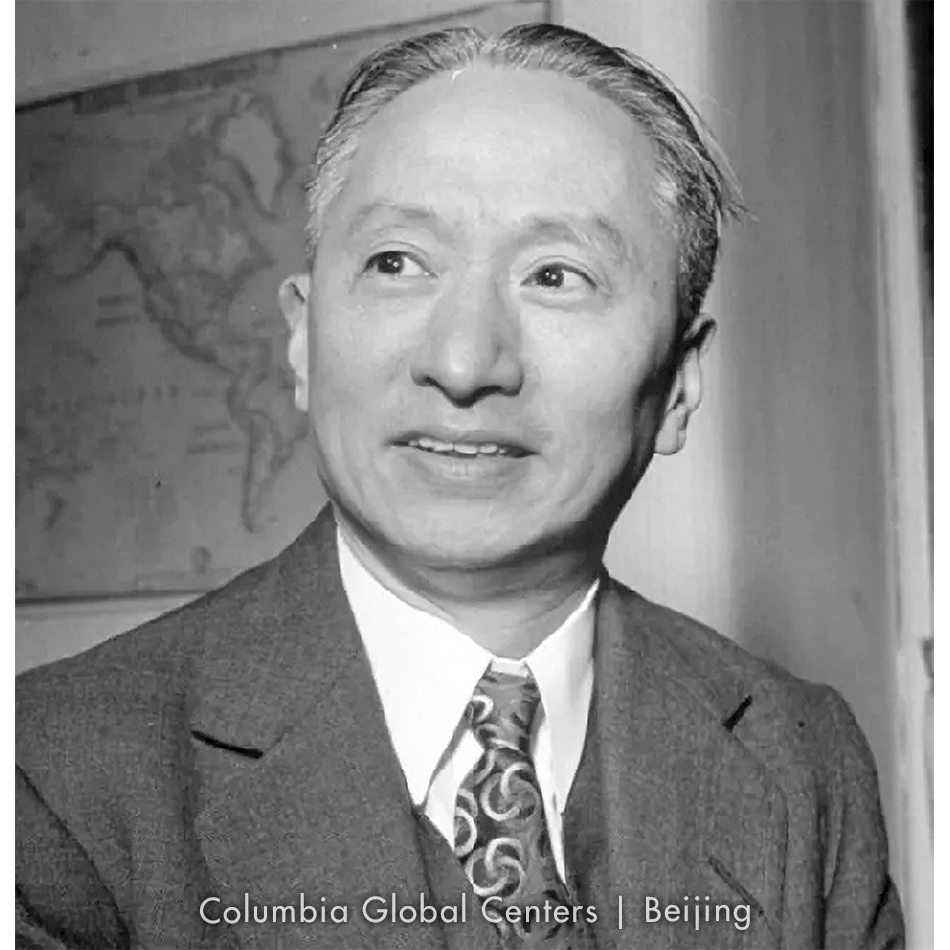
- Entered Columbia University in 1905, obtained a Bachelor of Arts, a Master of Arts in Political Science and a Ph.D. in International Law and Diplomatic Law;
- One of the most outstanding professional diplomats in Chinese modern history who dedicated his life to developing China's foreign relations;
- Served as Minister of Foreign Affairs, Minister and Ambassador to the United Kingdom, the United States, France and other countries;
- Former Judge and Deputy Chief of the International Court of Justice;
- The first patriotic diplomat who said “no” to Western powers;
- Experienced many major diplomatic events, known as the “first diplomat of the Republic of China“.
马寅初 Ma Yinchu
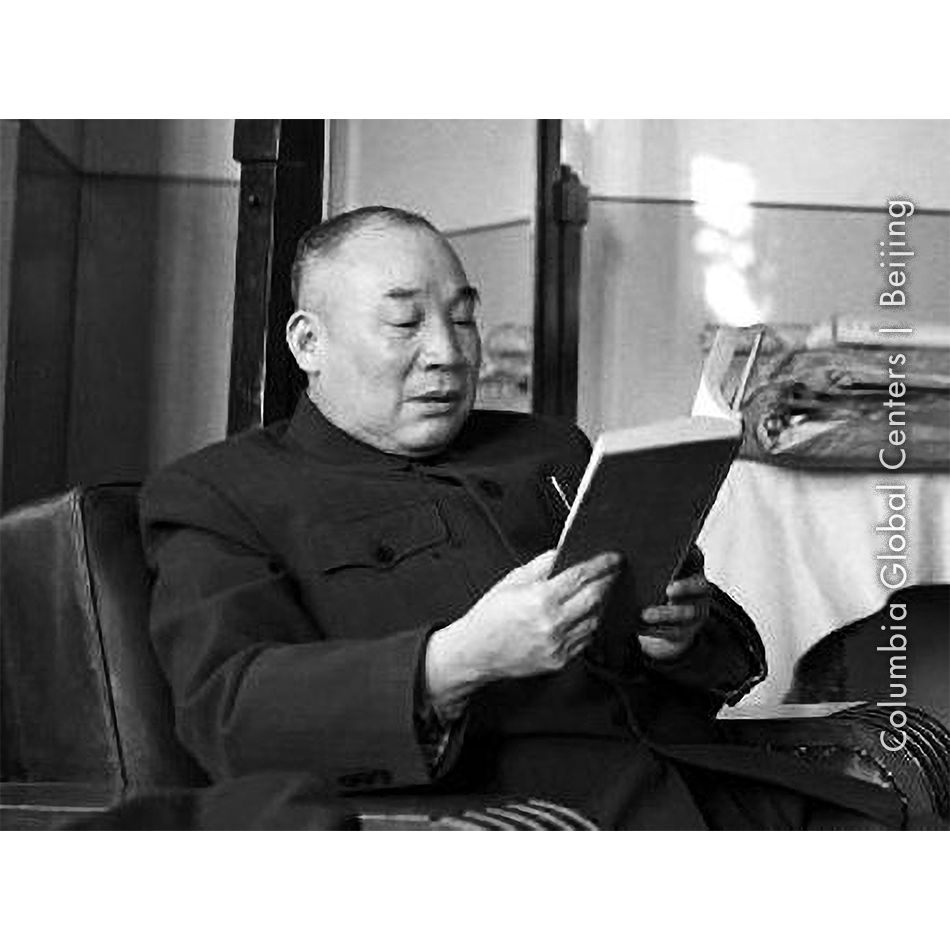
- Entered Columbia University in 1910 for further studies, and obtained a master's degree in Literature in 1911 through a master's thesis entitled “Public Revenues in China”;
- Completed and passed his doctoral dissertation entitled "The Finances of the City of New York" in 1913 and obtained a Ph.D. in philosophy from Columbia University. This dissertation was immediately published by the Columbia University School of Political Science and became the best-selling book at that time, and was also listed as a textbook for freshmen;
- Contemporary Chinese economist, educator and demographer;
- Has made specific contributions to China in areas such as economy, education and population, and is known as the “first person in Chinese demography” in contemporary times.
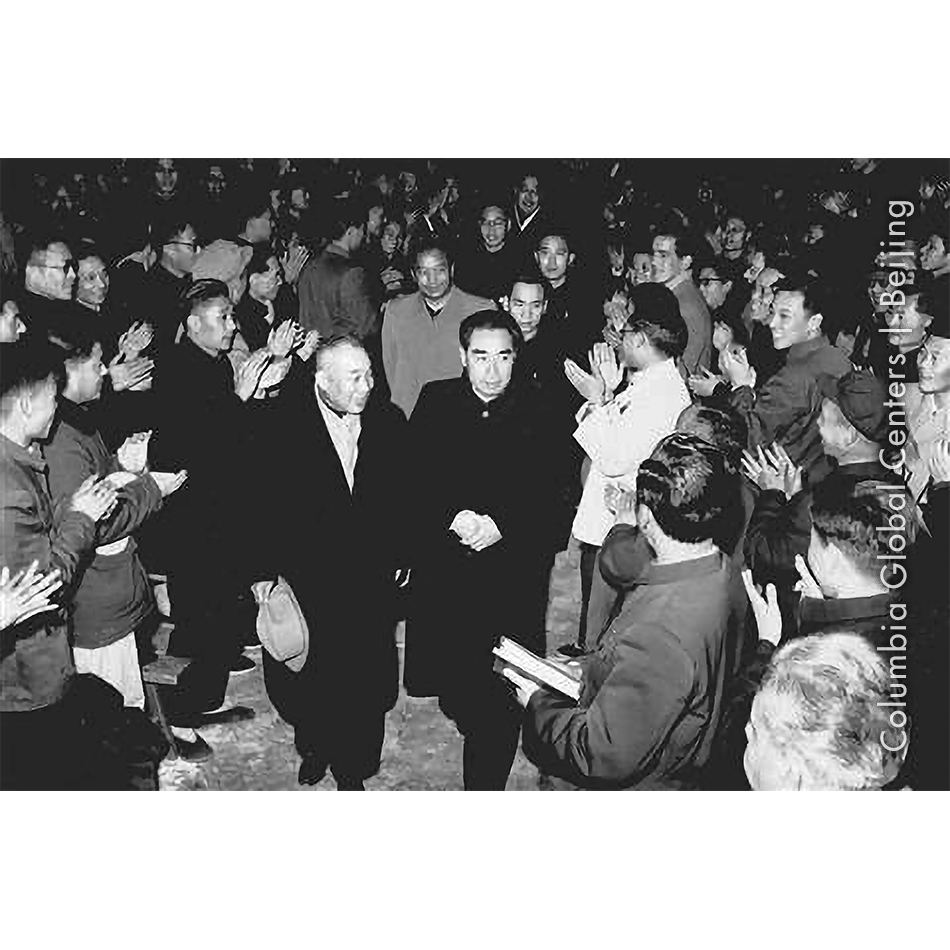
张彭春 Zhang Pengchun
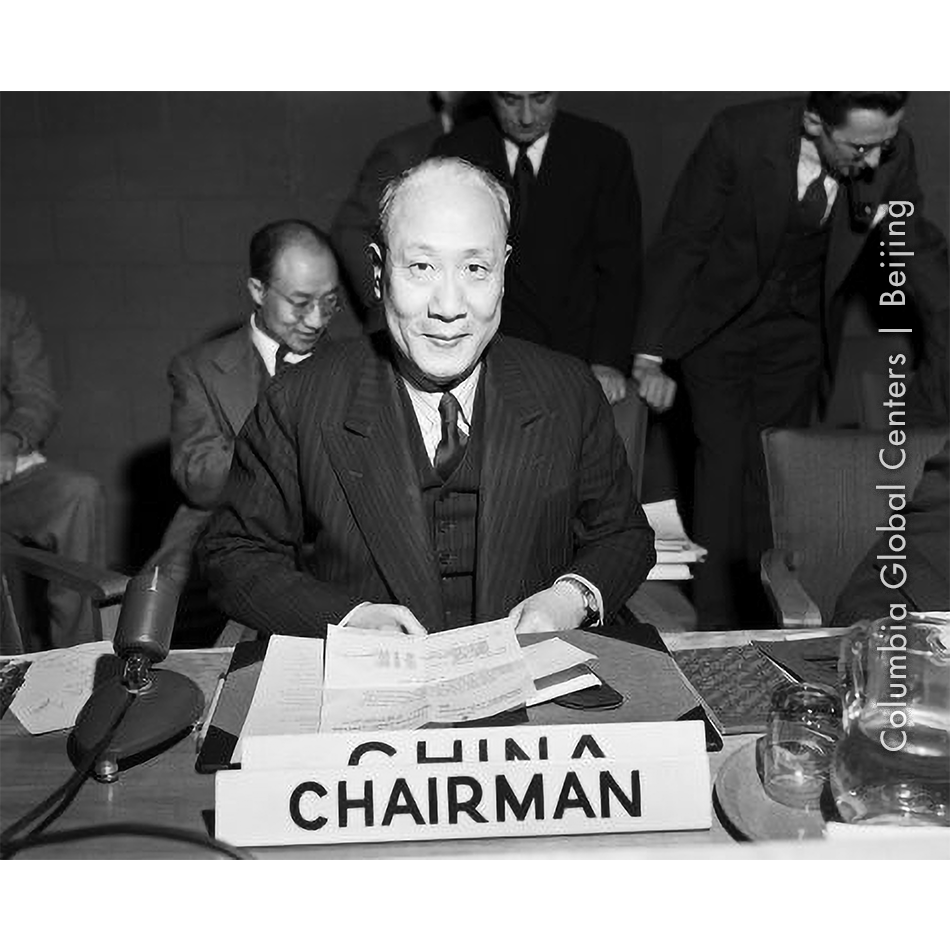
- Entered Columbia University to study Pedagogy and Philosophy in 1910 and received M.A. in both Literature and Education in 1915, and a Ph.D. in Education in 1922;
- Chinese educator, early-stage drama (the New Drama) activist, director and diplomat, one of the main drafters of the Universal Declaration of Human Rights in the United Nations General Assembly;
- On the Universal Declaration of Human Rights drafting committee, he served both as an effective Asian delegate and as a mediator when the negotiations reached a stalemate;
- Advocated the "May Fourth Movement" in 1919 and founded the "Crescent Moon Society" with Hu Shih, Xu Zhimo and others in September 1923.
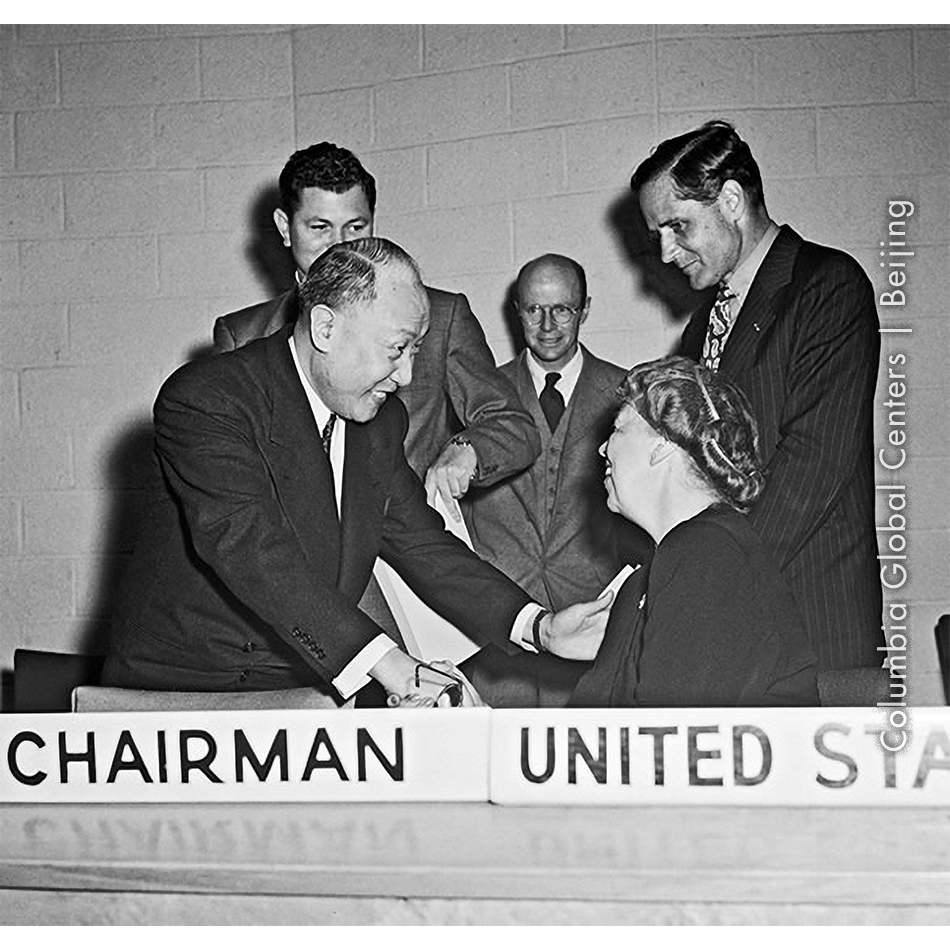
郭秉文 Kuo Ping-Wen
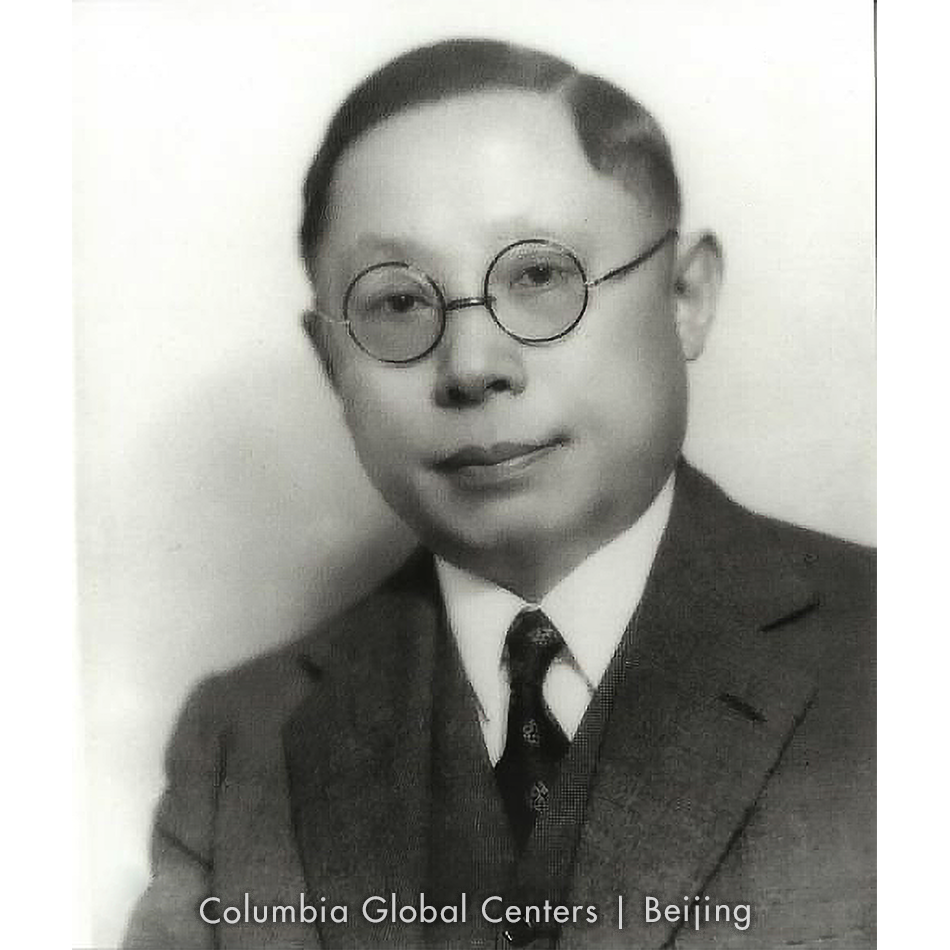
- Entered the Teachers College at Columbia University for a Ph.D. in education in 1911;
- Educator, pioneer of higher education in modern China, and the founder of China's modern university;
- Elected as Vice Chairman of the World Education Congress and Chairman of the Asian division for three consecutive terms since 1923;
- Founded the "China Institute in America" in New York with Paul Monroe in May 1926 and served as the first president, contributing greatly to Chinese cultural exchange;
- Established “modern universities rising from the East” when served as the dean of the academic affairs and president of Nanjing Higher Normal School, and the president of National Southeast University, influencing Chinese modern universities’ development.
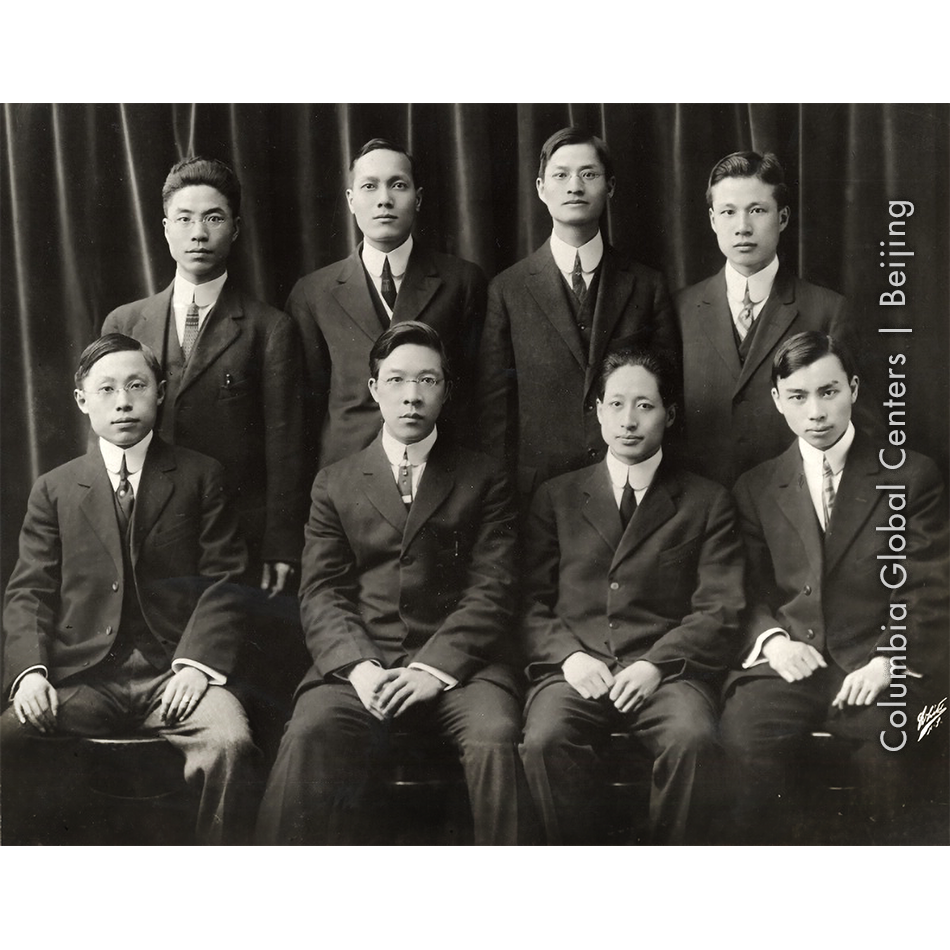
董泽 Dong Ze (Tse)
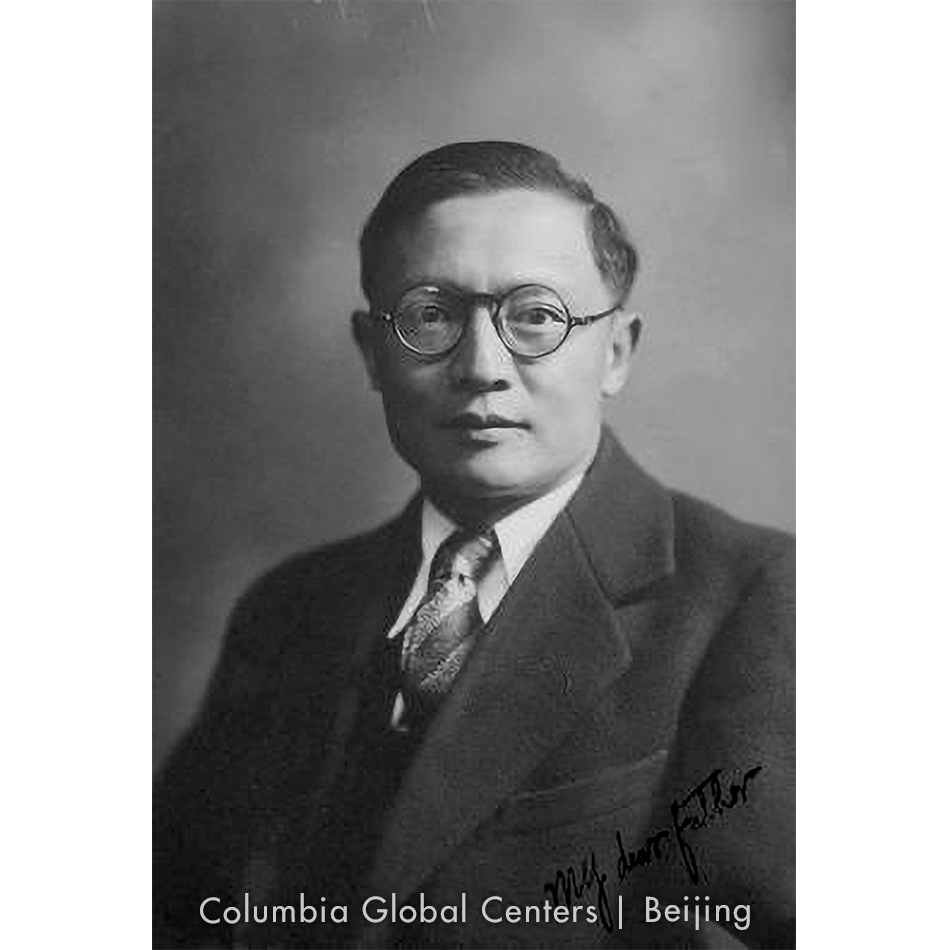
- Entered Columbia University for the study of Politics, Economics and Education in 1912, and obtained a master's degree from in 1920;
- The first president of Yunnan University and Bai educator;
- Won the title of “Academician of Académie des sciences” in 1925;
- Advocated democratic school running and emphasized academic research to educate students following their aptitude, which has made great achievements in China’s national education development.
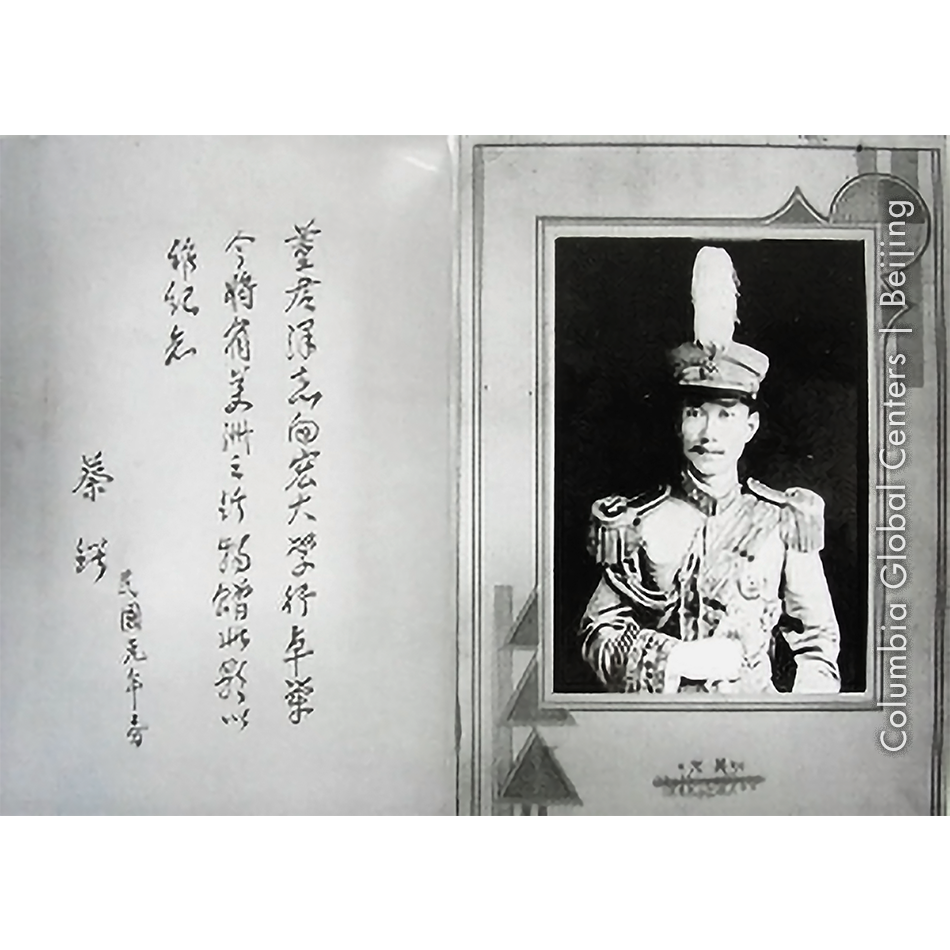
蒋梦麟 Jiang Menglin
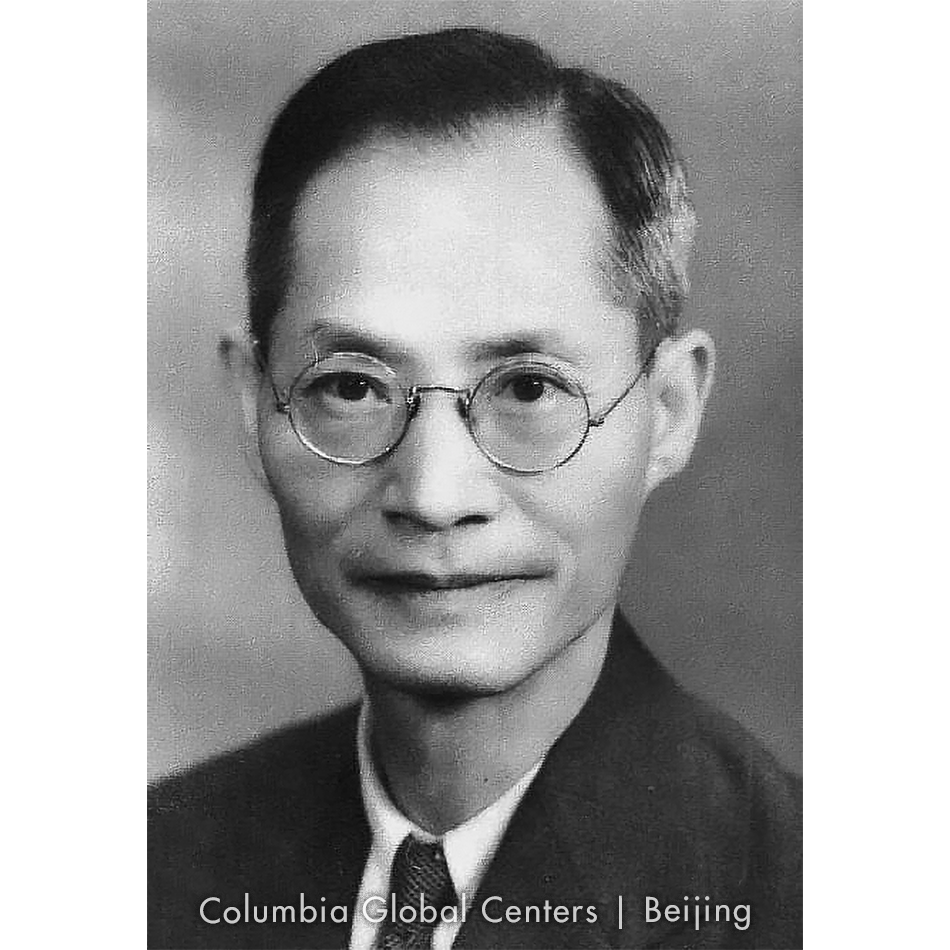
- Entered the School of Education at Columbia University in 1912, and obtained a Ph.D. in education in March 1917 under the tutelage of Prof. John Dewey;
- Famous educator, writer and official in modern China;
- Served as Minister of Education of the National Government, president of the Imperial University of Peking (1919-1927) and president of National Chekiang University (1927-1930);
- Contributed greatly to the development of modern education in China and has made remarkable achievements in the educational theory research.
李美步 Mabel Ping-Hua Lee
- Attended Barnard College in 1913, earned a Master’s degree from Teachers College, and in 1921, earned a Ph.D. in economics at Columbia;
- The first Chinese woman to earn a doctorate degree from Columbia University and China’s first female doctorate of economic;
- Lee’s Ph.D. research book, The Economic History of China: With Special Reference to Agriculture, was the first agricultural economics publication written by Chinese scholars and was compiled into Columbia’s Economic History of China;
- Was the head of the First Chinese Baptist Church in New York's Chinatown for over 40 years. Opened the first Chinese American Kindergarten in the area and offered generous support to the community;
- In dedication to Lee’s contribution to the women’s suffrage movement, United States Postal Service officially named Manhattan's Chinatown Post Office “Mabel Lee Memorial Post Office” on December 2018, the first U.S. post office named after a Chinese American.
陶行知 Tao Xingzhi
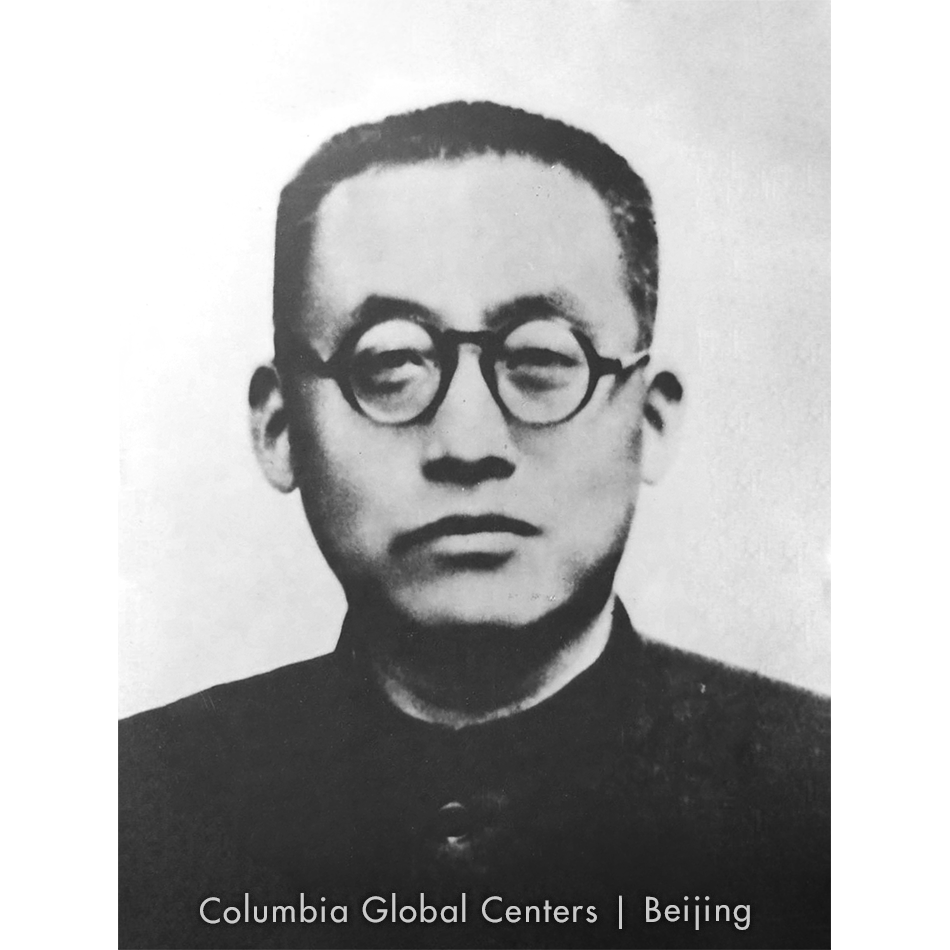
- In 1915, entered the Teachers College at Columbia University for a Ph.D. in Education;
- Served as the annual chairman of the Chinese Students and Scholars Association (CSSA) of the Teachers College and the “Chinese Education Research Association” in 1916;
- Famous Chinese educator, ideologist, great democratic warrior, and patriot;
- One of the main leaders of the Chinese People’s Salvation Association and the Chinese Democratic League;
- Dedicated to education throughout his life, made a pioneering contribution to modern education and created a complete theoretical educational system.
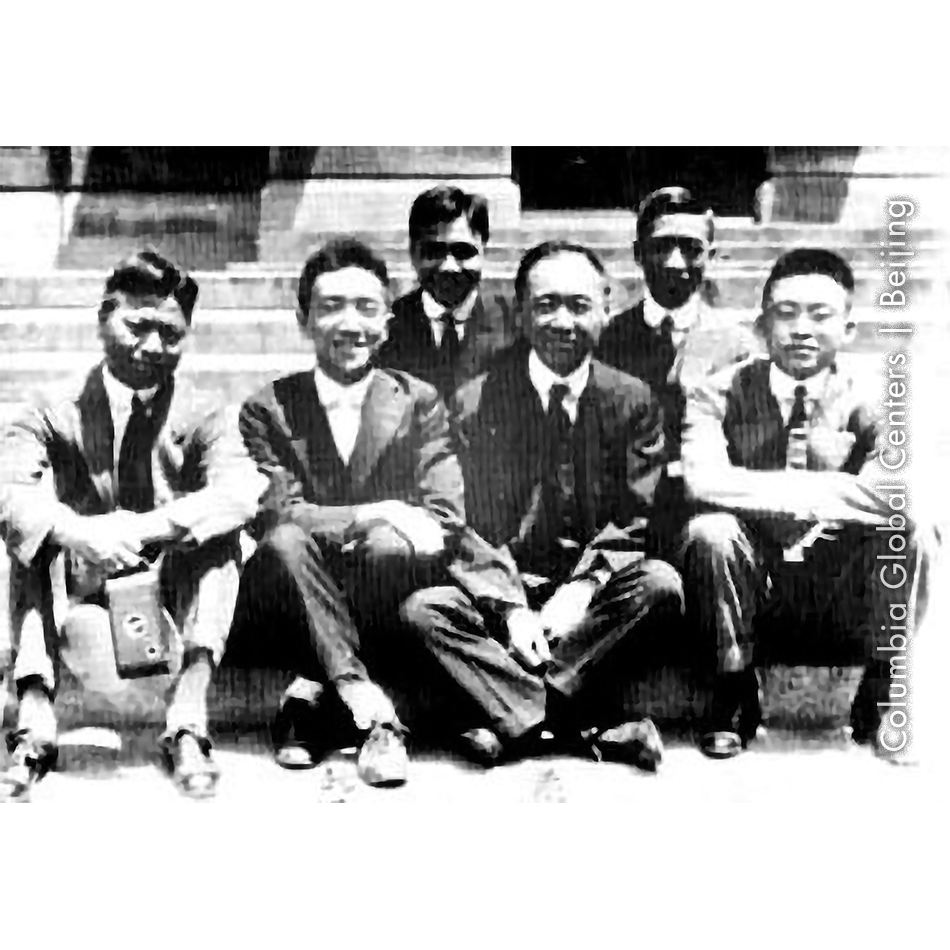
胡适 Hu Shih
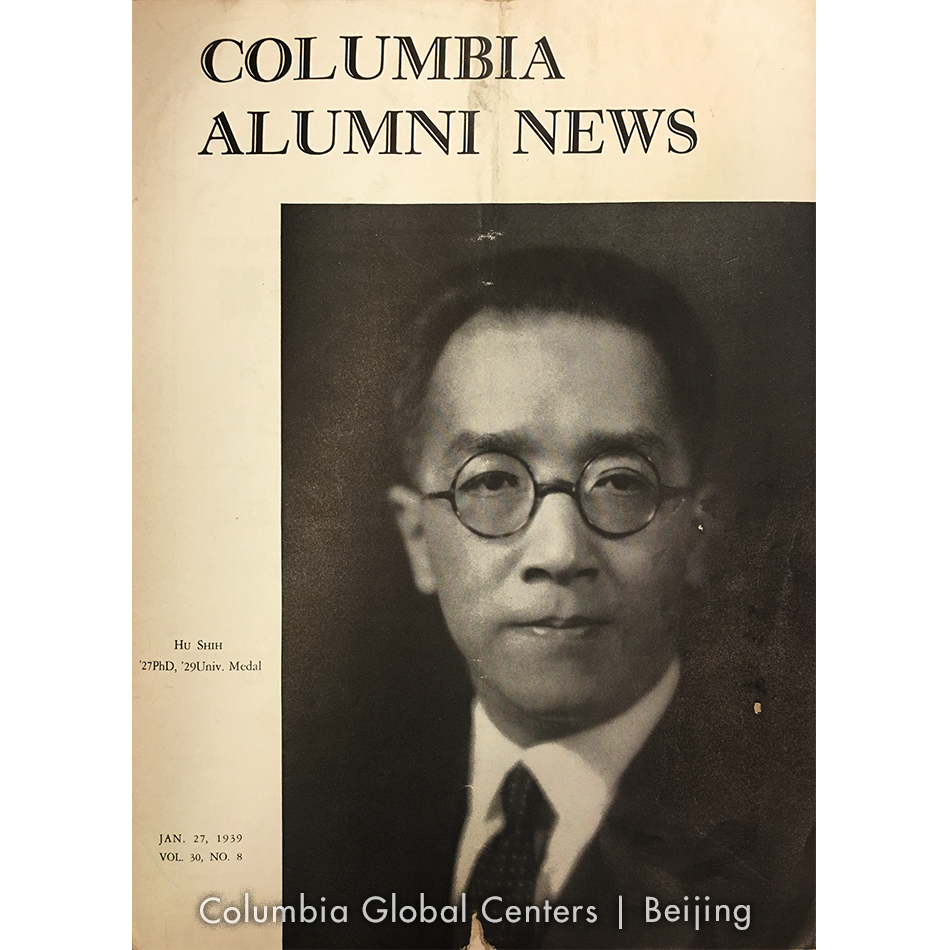
- Entered Columbia University to study under the tutelage of Professor Dewey in 1915 and obtained a Ph.D.;
- Modern Chinese ideologist, writer and philosopher, noted for advocating "Vernacular Chinese" and leading the New Cultural Movement with Chen Duxiu;
- Joined the editorial department of "New Youth" in 1918, advocated for liberation of personality and freedom of thought;
- Served as president of the Imperial University of Peking, president of Academia Sinica, ambassador of the Republic of China to the U.S., and director of the Private Nankai University School Board.
任鸿隽 Jen Hung-chun
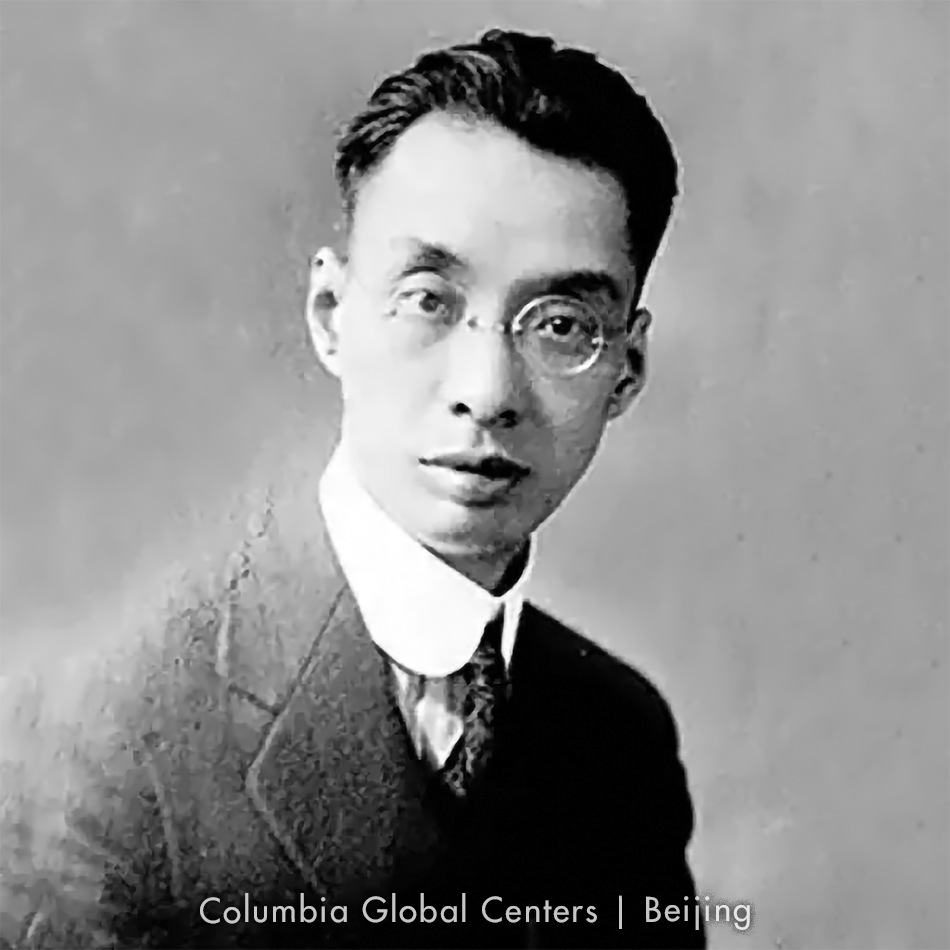
- Obtained a master’s degree in Chemical Engineering in the duration of his study at Columbia University from 1916 to 1918;
- Chinese social activist, one of the main founders and the first president of Science Society of China;
- One of the main trailblazers and founders of modern science in China who promoted the development of modern scientific research and education from scratch;
- Pioneer in disseminating scientific ideas, building scientific systems, formulating science and technology policies.
张伯苓 Zhang Boling
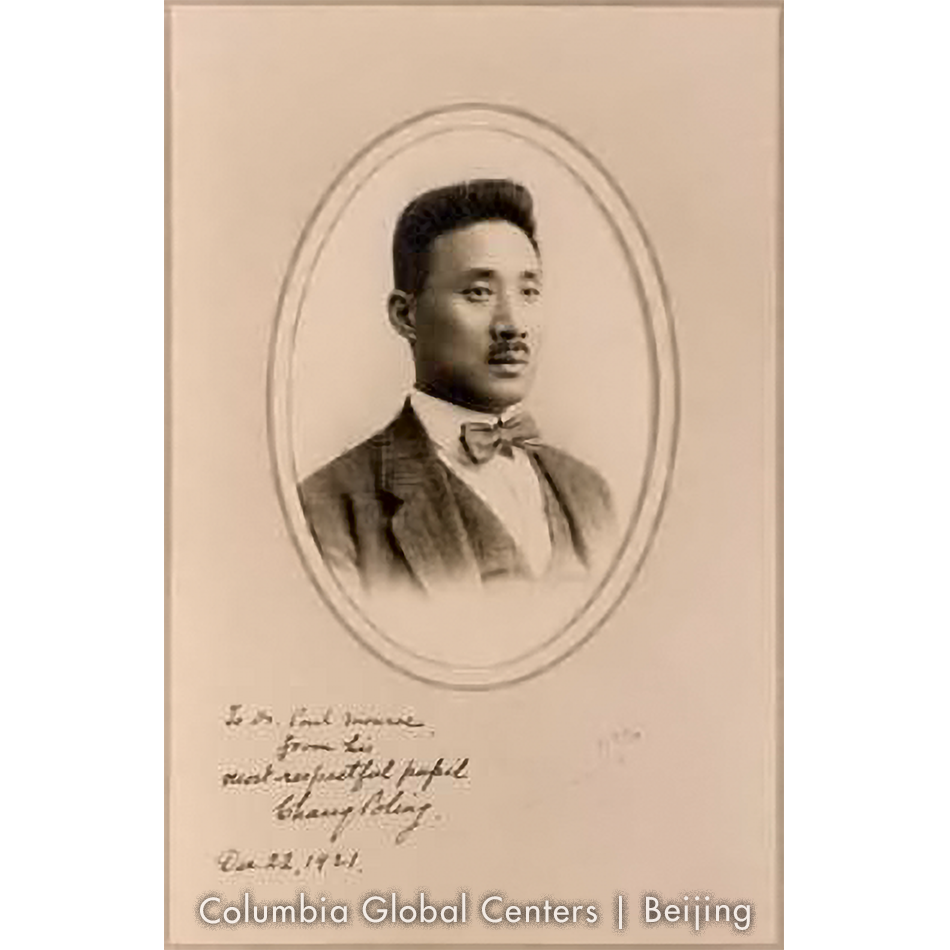
- Entered Columbia University for the study of Education in the autumn of 1917, and received an honorary Ph.D. in Literature in July 1946;
- Modern professional educator in China, the earliest proponent of Western drama and the Olympic Games, known as “the first person of China’s Olympic Games”;
- Taking education to save the country as a lifelong belief and founded Nankai Middle School, Nankai University, Nankai Primary School, etc. successively, forming the distinguished Nankai education system;
- Cultivated many talents for China, including Zhou Enlai, and was honored as “a creator of modern Chinese education”.
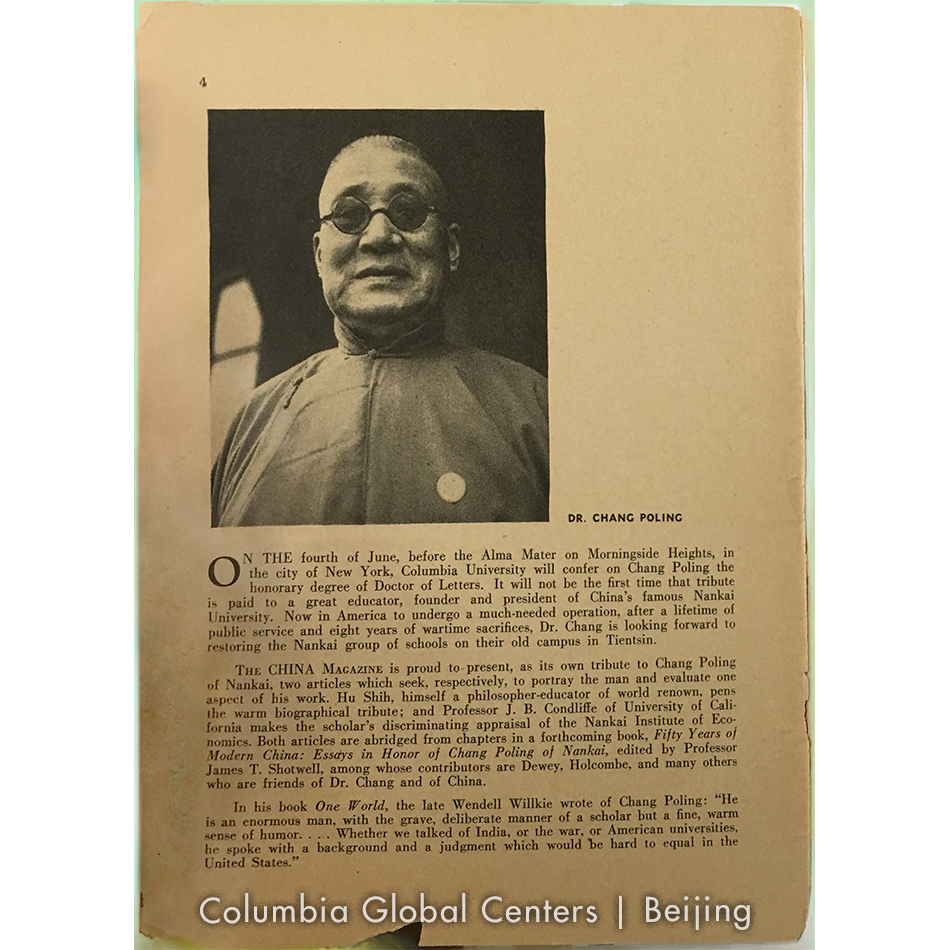
陈鹤琴 Heqin Chen
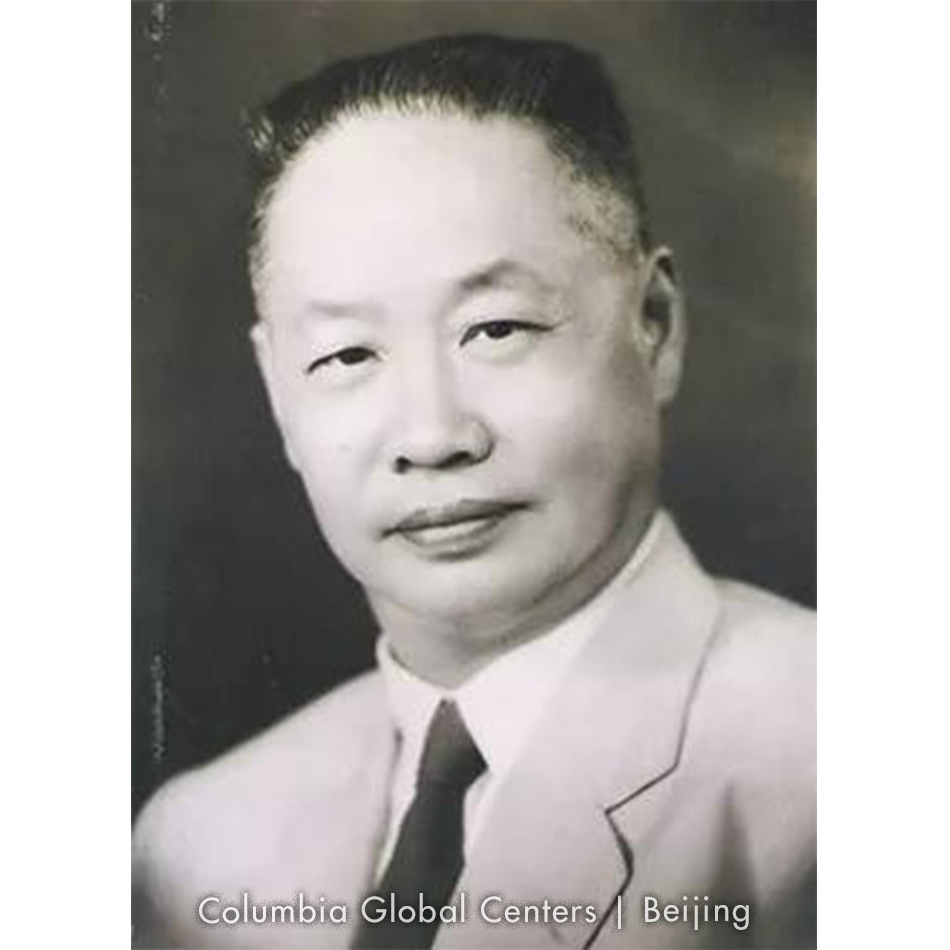
- Studied and obtained Master of Education at Columbia University from 1917 to 1918;
- Modern Chinese Early Childhood Educator and child psychologist, known as "the Father of Modern China Early Childhood Education;
- Dedicated his life to advancing and modernizing China's K-12 education;
- Advocated for equity of education for all children, regardless of wealth or ability.
- In 1937, he was elected as the Director of Education Committee of the Shanghai Charity Joint Disaster Relief during the Second Sino-Japanese War, the Charity continued to make education available to over 27 thousand children despite the on-going war;
- In 1940, Chen established the Jiangxi Province's Public Early Childhood Normal School, the first public early childhood normal school in China.
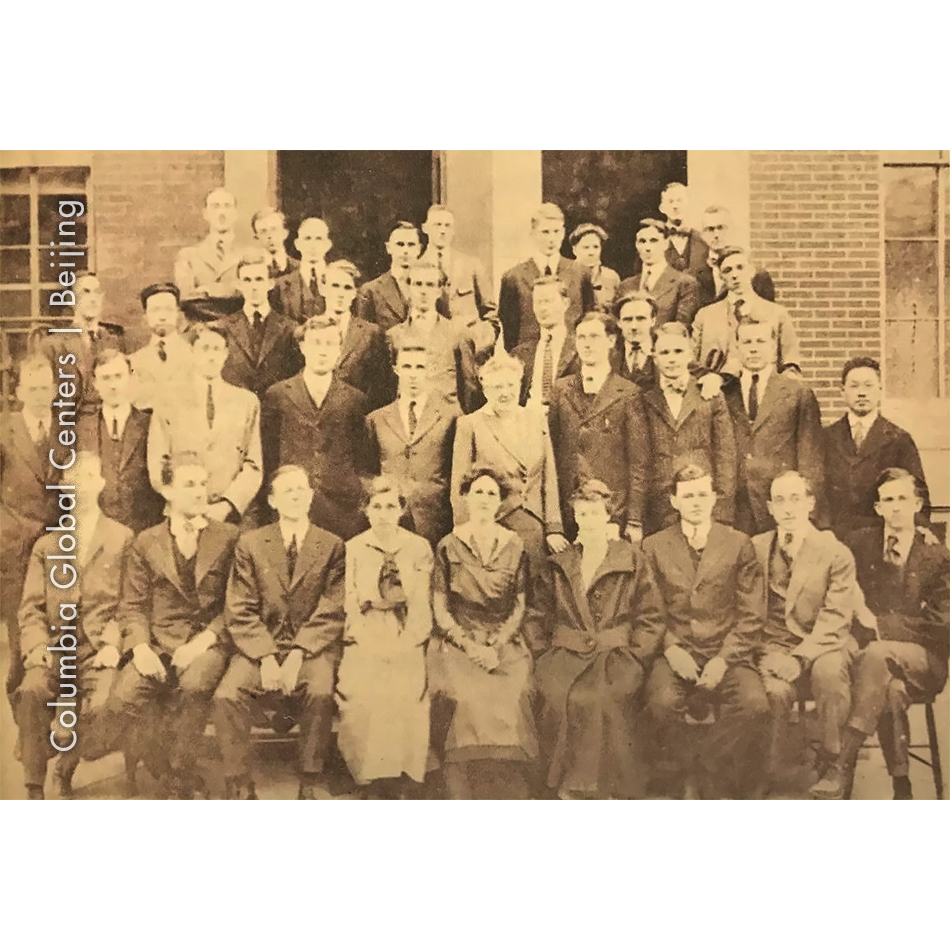
洪业 William Hung
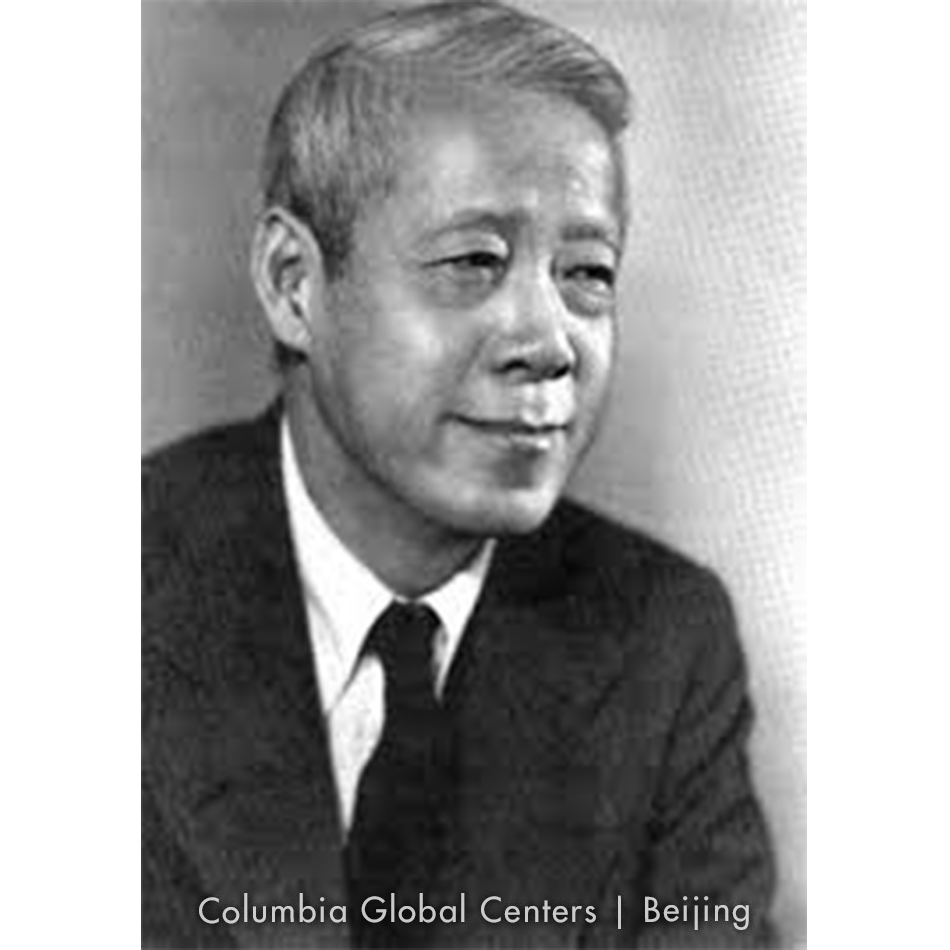
- In 1917, entered Columbia University to study Church History, shifted his focus to China after 1919;
- Chinese historian and sinologist, made instrumental contribution to the study of Chinese classical writing and scientific index methods in China;
- In 1923, John Leighton Stuart, President of Yenching University, invited him to act as the provost at the School of Liberal Arts and Sciences; four years later he established the Yenching Journal of Chinese Studies;
- Devoted to establishing reliable texts and indexes to important Chinese classical works through scientific methods;
- The 64 volumes of index series he edited and publised mark the begining of an organized and planned large-scale modern standards of indexing in China.
候德榜 Hou Debang
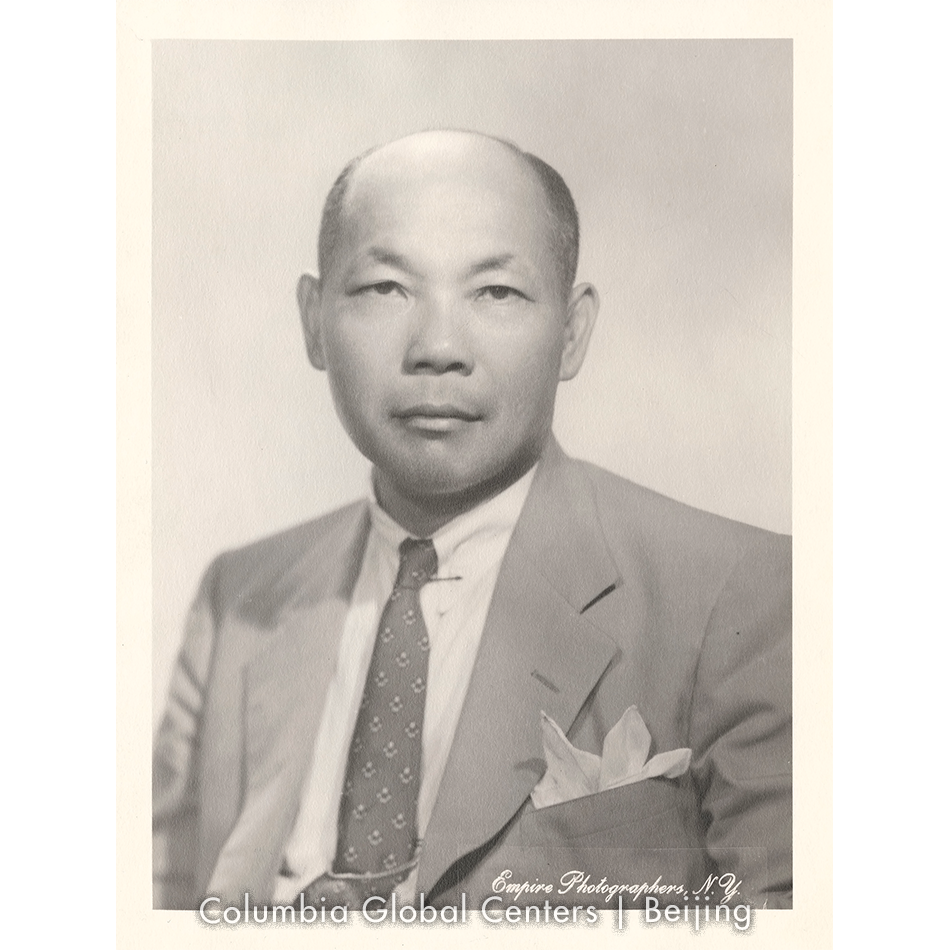
- Participated in the research of leather making at Columbia University Research Institute in 1918, and obtained a master's degree in 1919 and a Ph.D. in 1921;
- Famous scientist, outstanding chemist and the inventor of “Hou's Joint Soda Method”;
- Pioneer of China's heavy chemical industry, one of the founders of modern chemical industry and the leader in the world alkali industry;
- Presided over the establishment of the first soda plant in Asia in the 1920s.
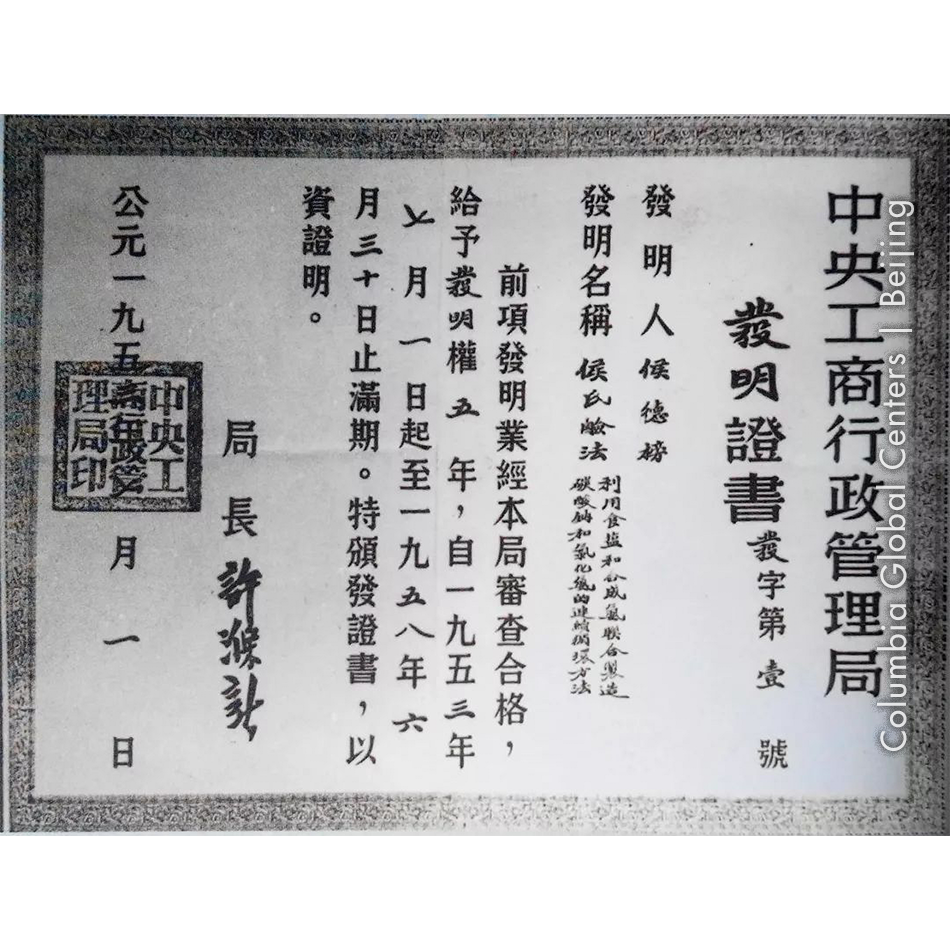
张志让 Zhang Zhirang
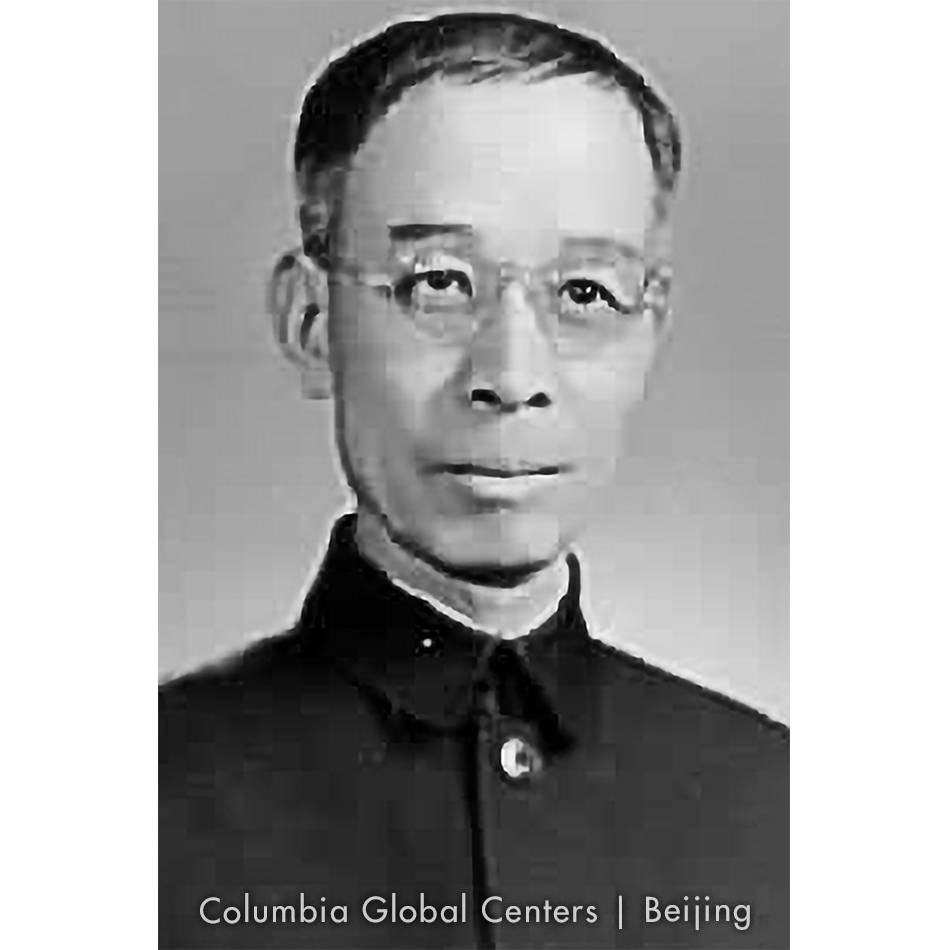
- Graduated from the Law School in Columbia University in 1919;
- Contemporary Chinese jurist and educator in jurisprudence;
- Participated in the first plenary session of the Chinese People's Political Consultative Conference, and was elected as the representative of the first, second, third and fourth National People's Congresses;
- Held various leadership positions in the National People's Congress and the National Committee of the Chinese People's Political Consultative Conference, and served as the vice president of the Supreme People's Court and the vice president of the Chinese Political and Legal Society;
- Made great contributions to the development of Chinese modern law and jurisprudence and strived for New China’s legislative cause by training a multitude of talents, establishing and perfecting the judicial system of New China.
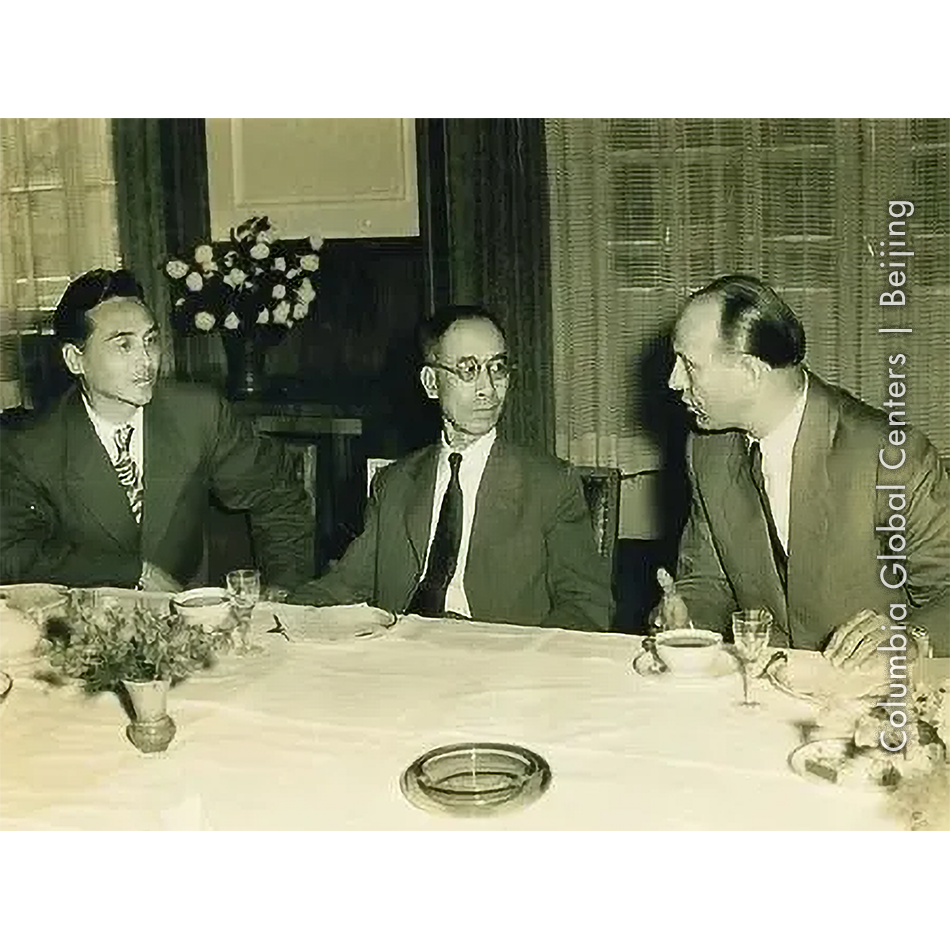
徐志摩 Xu Zhimo
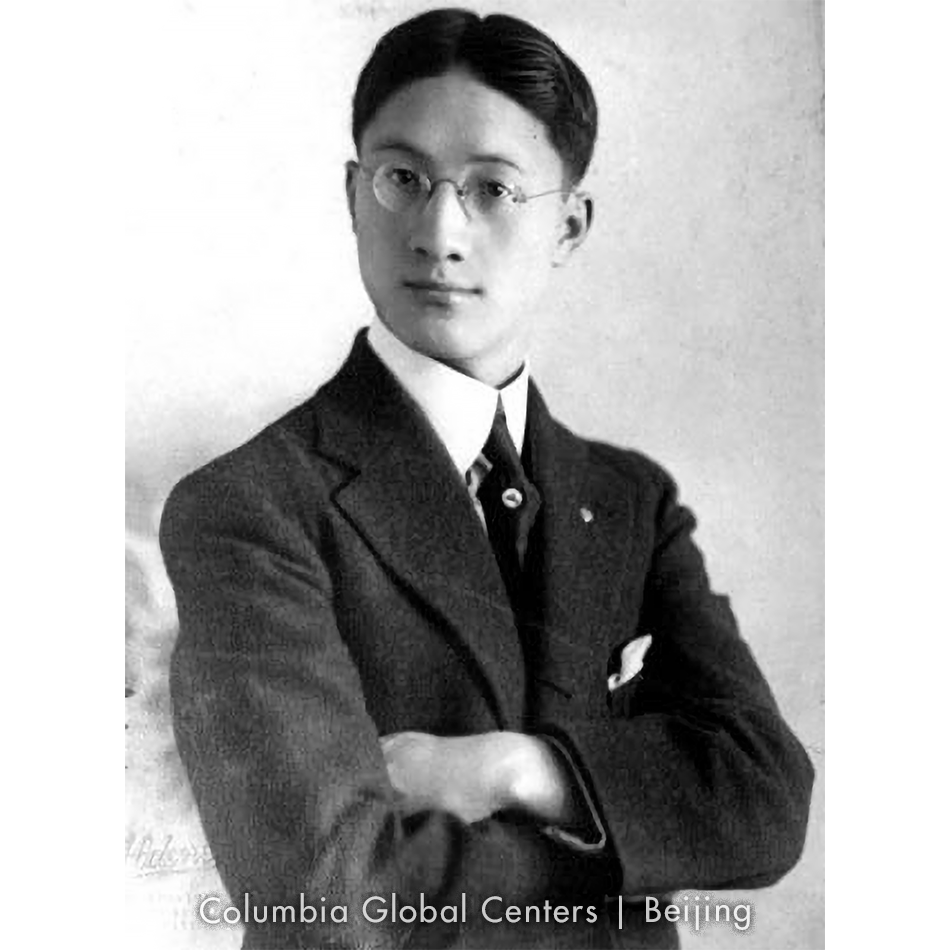
- Entered the Department of Economics of Columbia University to study for a master's degree in September 1919;
- Famous Chinese modern poet and essayist of the Crescent Moon School, who founded Crescent Moon Society with Hu Shih and others in 1923;
- Advocated the meter of new poetry and has made great contributions to the development of Chinese new poetry;
- Outstanding literary translator who played an important role in the communication between Chinese and Western cultures in modern times
- Author of "Saying Good-bye to Cambridge Again", "Sayonara", and other well-known literary works.
蒋廷黻 Tingfu F. Tsiang
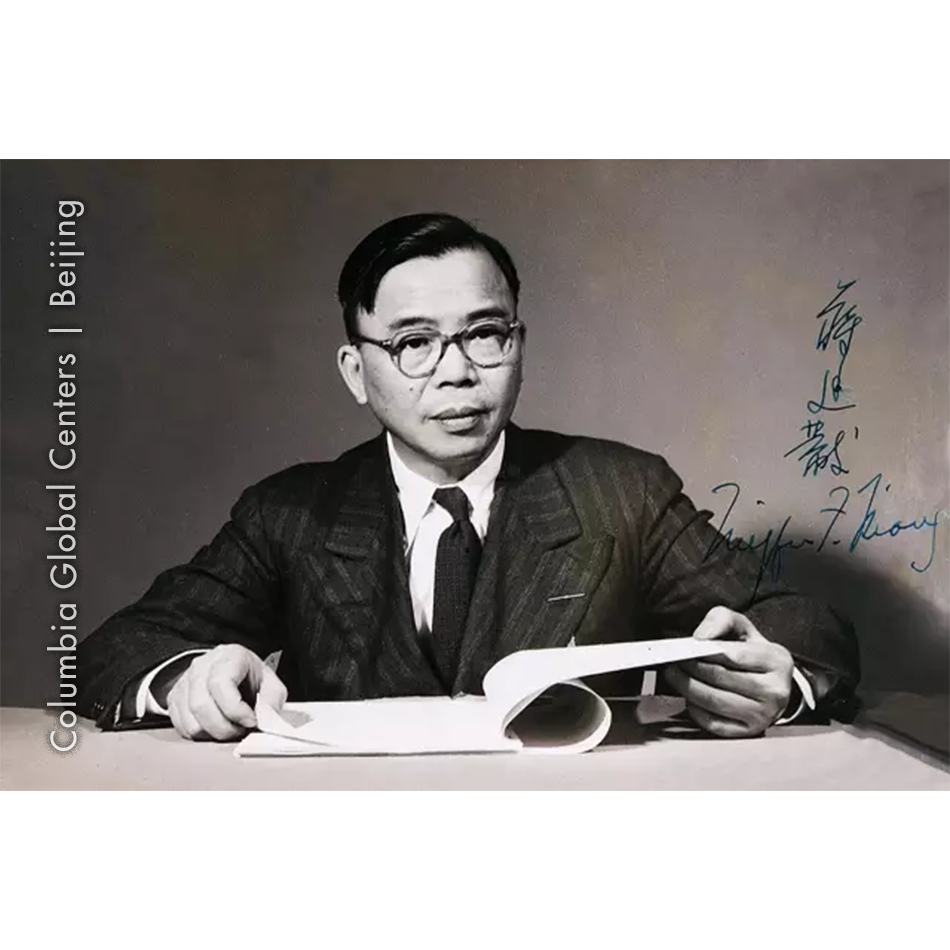
- Entered Columbia University in 1919 and received his doctorate in history in 1923;
- Served as the dean of the School of History and Humanities at Nankai University, and the dean of the School of History and Humanities and a lecturer at the School of Law at Tsinghua University after returning to China in 1923;
- Established the Independence Weekly, with Shih Hu and other famous Chinese scholars, to fulfill the responsibility of intellectuals during the national crisis
- In December 1935, Tsiang left Tsinghua University and served as the chief of administrative affairs in the Executive Yuan of the Kuomintang government as a non-KMT party member;
- He was appointed China’s permanent representative to the United Nations in 1945.
金岳霖 Jin Yuelin
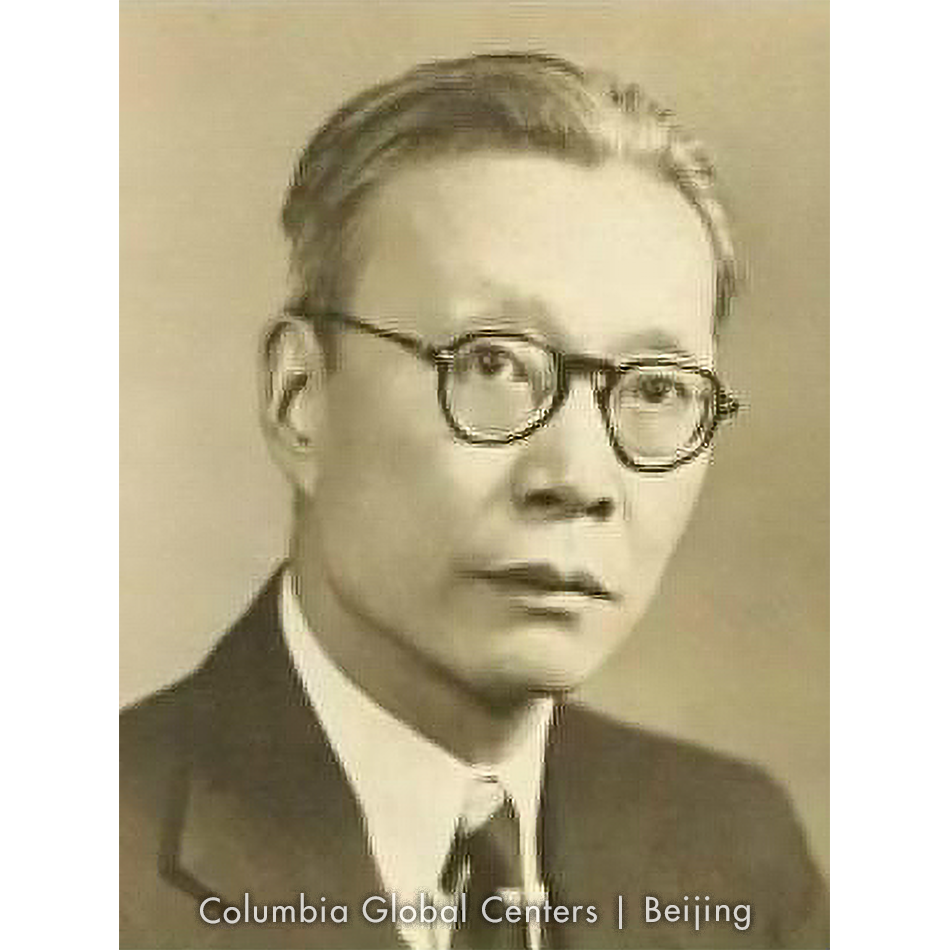
- Entered Columbia University in 1920 for a Ph.D. in Political Science;
- Chinese philosopher and logician;
- Combined western philosophy with Chinese philosophy to establish a unique philosophical system;
- Founded the Department of Philosophy of Tsinghua University in 1926 and was hailed as "the first person in Chinese philosophy".
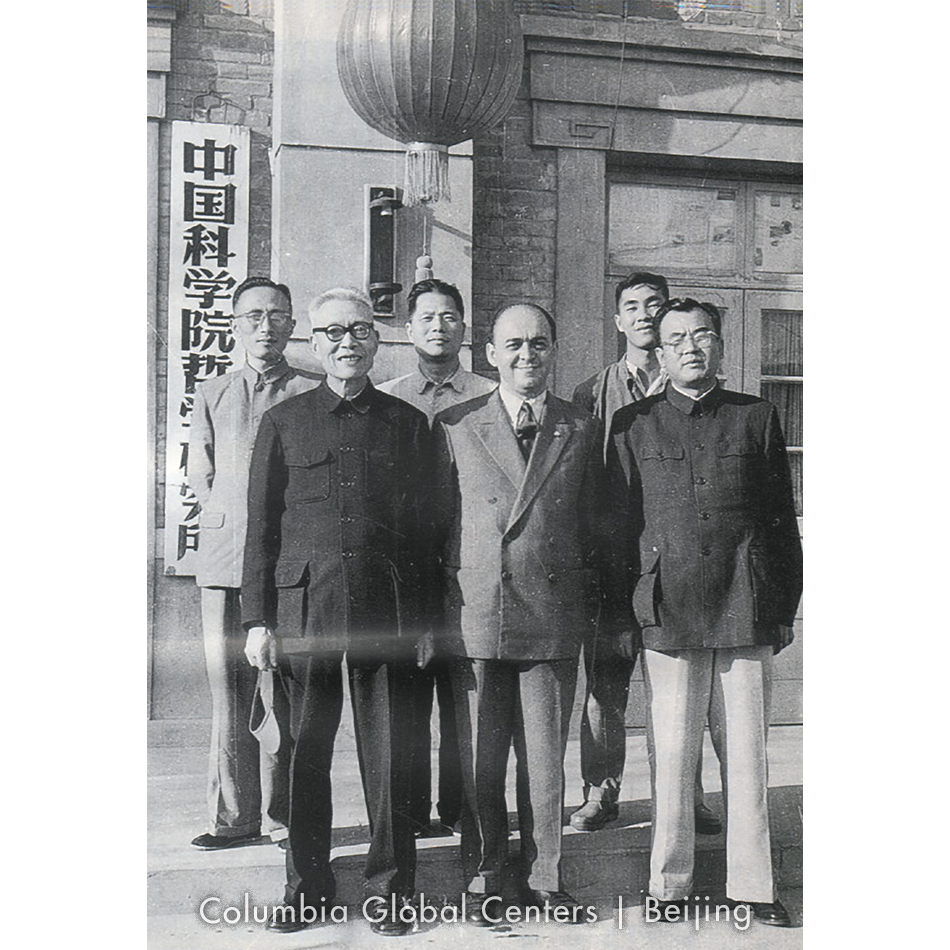
冯友兰 Feng Youlan
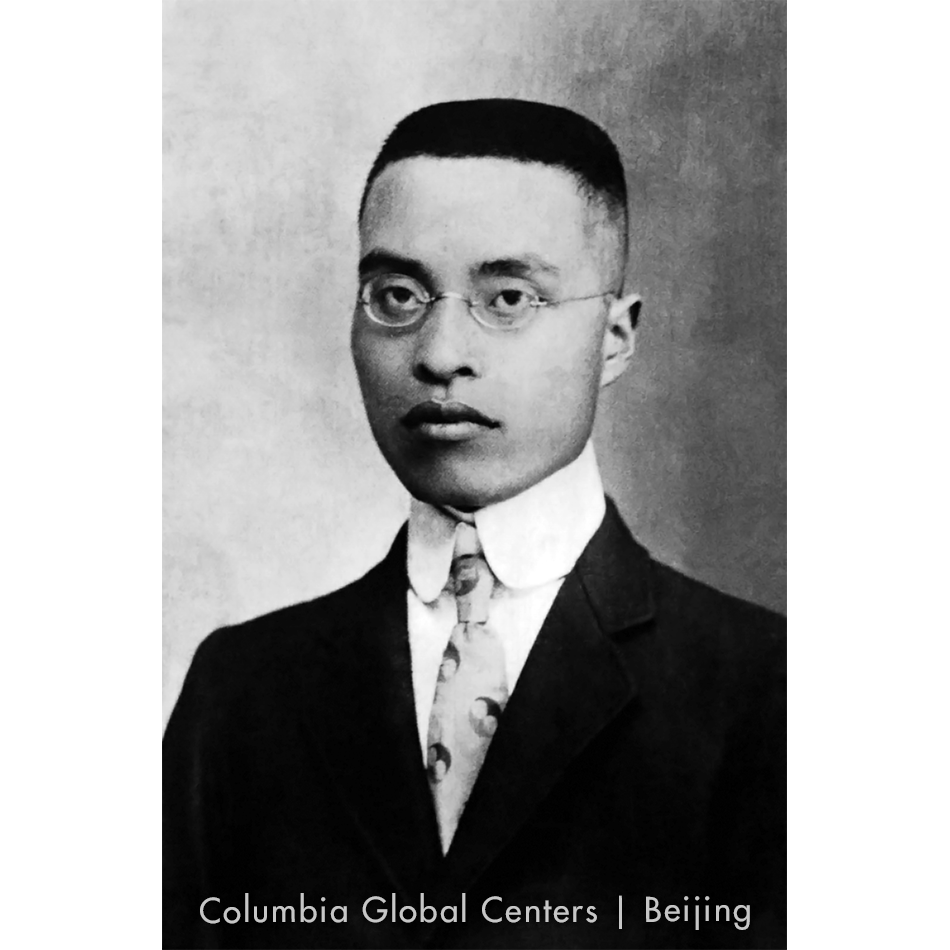
- Entered the Department of Philosophy in January 1920 to study under the tutelage of Prof. Dewey;
- Passed the oral defense in the summer of 1923 and obtained a Ph.D. in philosophy from Columbia University after the publication of his doctoral thesis the following year;
- Chinese philosopher and historian of philosophy, known as “modern new Confucianism”;
- Successively served as professor, dean of the philosophy department, dean of the Faculty of Arts of Tsinghua University, professor and dean of the Faculty of Arts in National Southwest Associated University;
- Had a profound influence on the contemporary academic field in China and abroad.
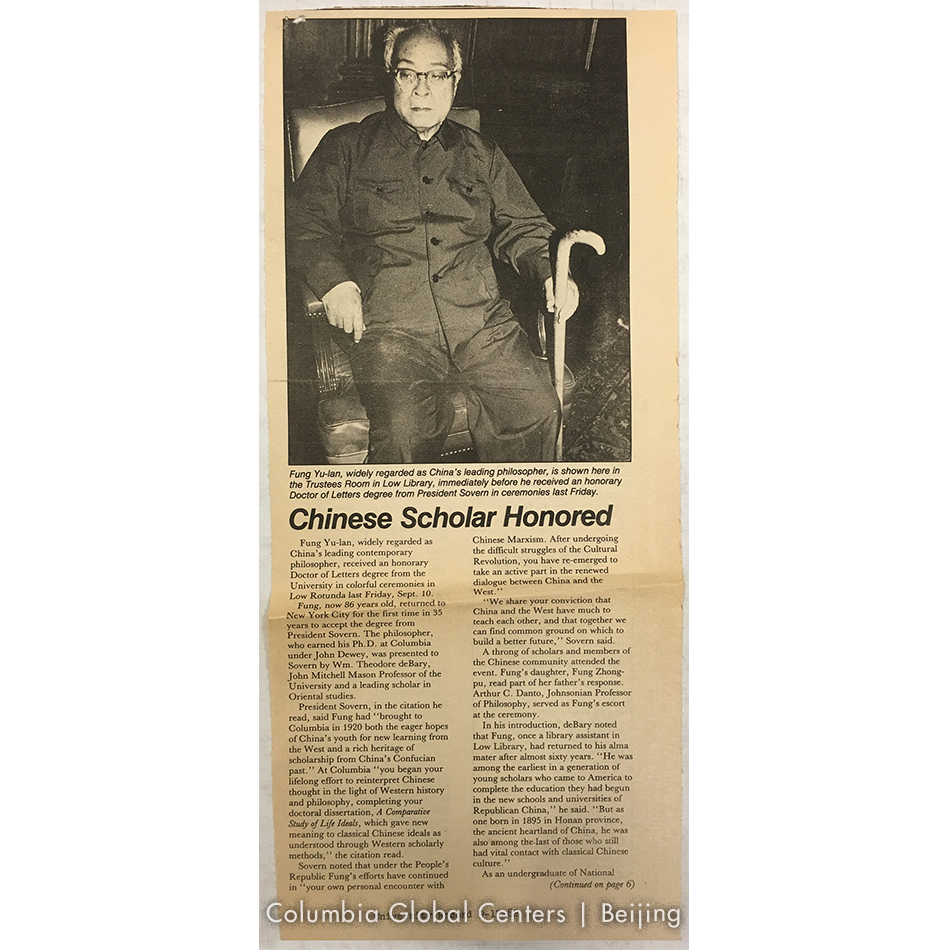
袁同礼 Yuan T'ung-li
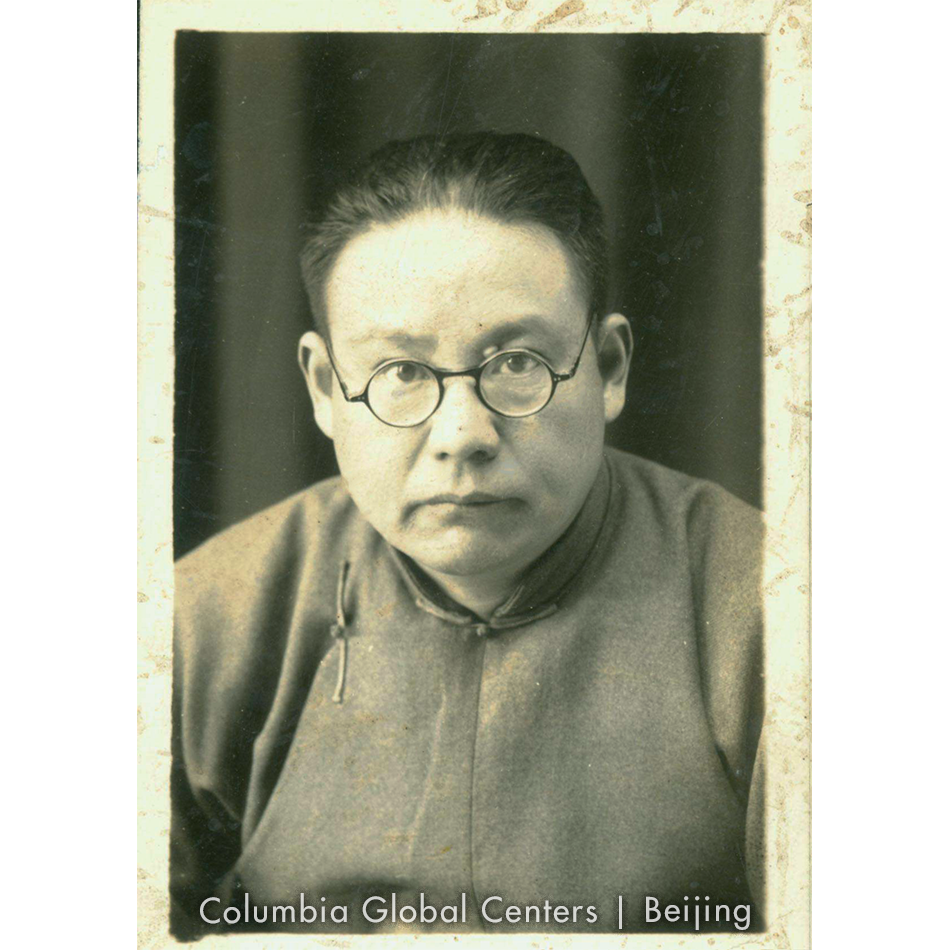
- Obtained a Bachelor of Arts degree at Columbia University in 1920, and was awarded the “University Medal for Excellence" by the university in 1934;
- Famous library scientist, bibliographer and library career activists, was amongst the first generation of professionals with modern library knowledge and skills in China’s library domain;
- Later hired as a professor of bibliography and director of the library at Imperial University of Peking;
- Served as the chairman and director of the Executive Committee of Library Society of China (LSC) and has made important contributions to cause, education and science research of librarianship in China.
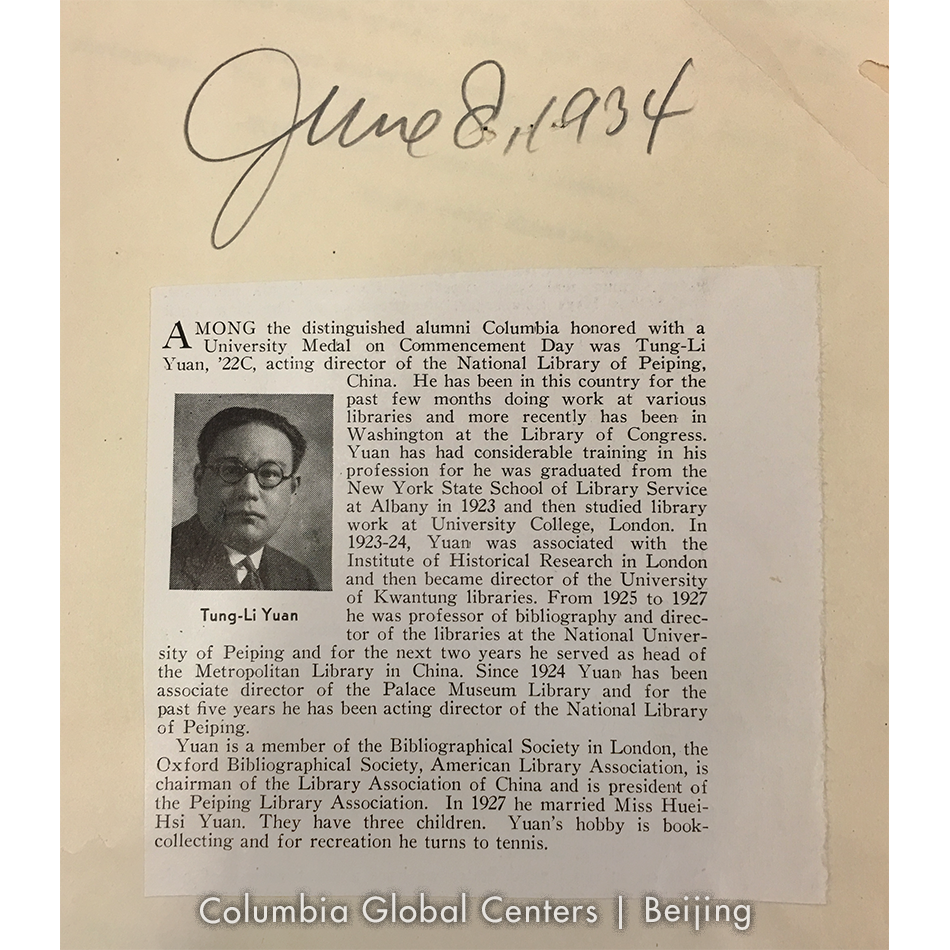
许地山 Xu Dishan
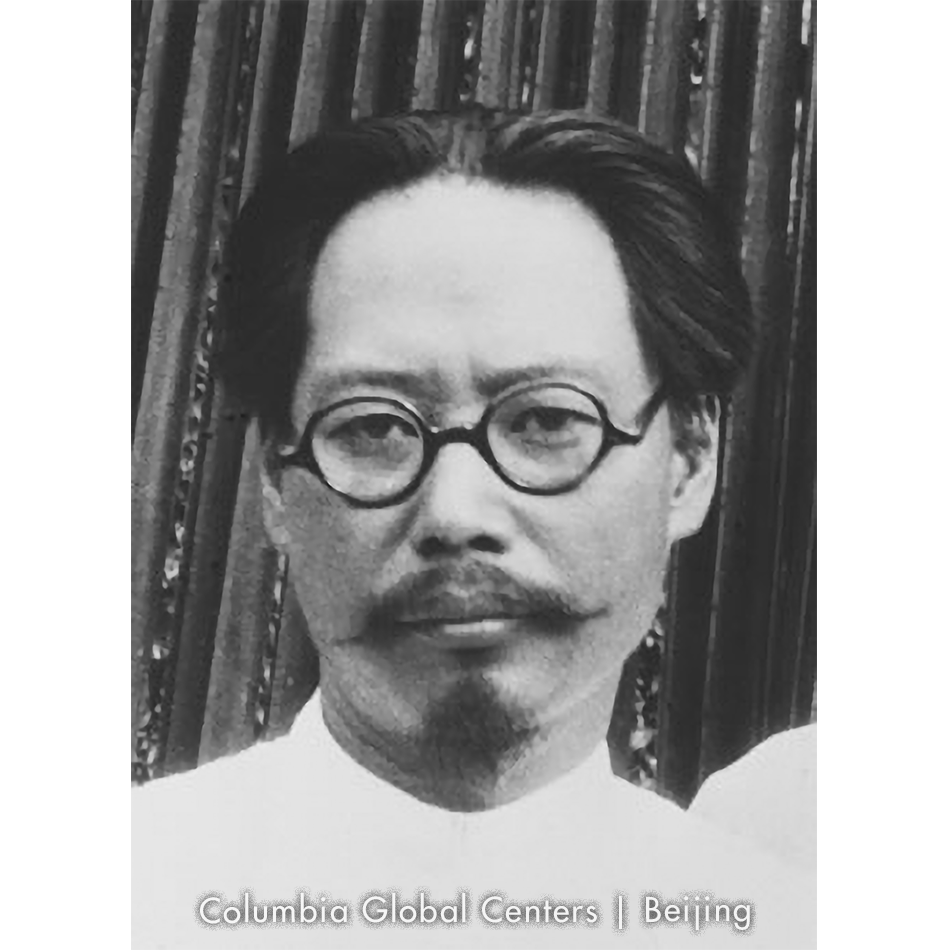
- Entered Columbia University to study Religious History and Comparative Religion in 1922, later obtained a Master of Arts (M.A.) degree;
- Famous modern Chinese novelist, essayist and advocate of "new literature" during the May Fourth Movement;
- Served as a professor at School of Literature and School of Religion at Yenching University, and devoted himself to literary creation;
- The first Chinese in the 20th century to teach Sanskrit in universities of China, and the pioneer of Indology in contemporary China.
吴文藻 Wu Wenzao
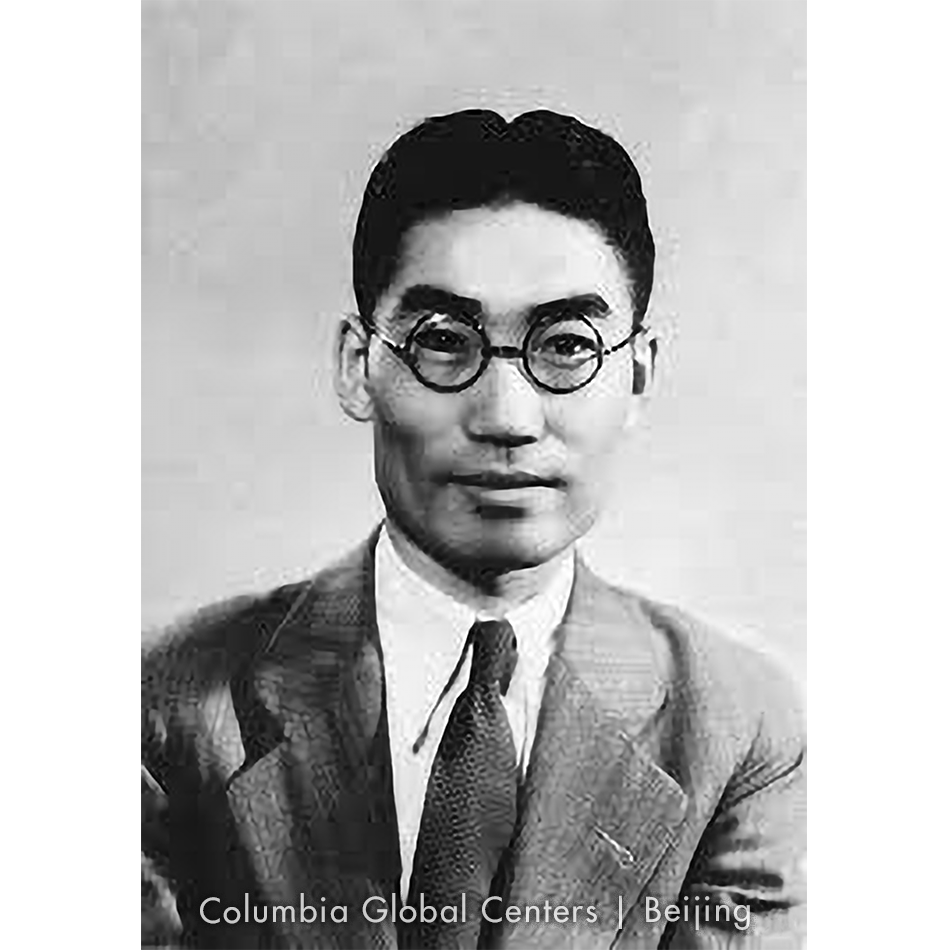
- Entered the Department of Sociology at Columbia University in 1923, received his Ph.D. in 1928 and was awarded "Best Foreign Student in the Last Ten Years";
- Chinese sociologists, anthropologists and ethnologists;
- The earliest Chinese advocate and active practitioner of Localization and Sinicization of sociology, anthropology and ethnology;
- Later served as a consultant for the Chinese Sociological Association (CSA) and the Association of Chinese Ethnology.
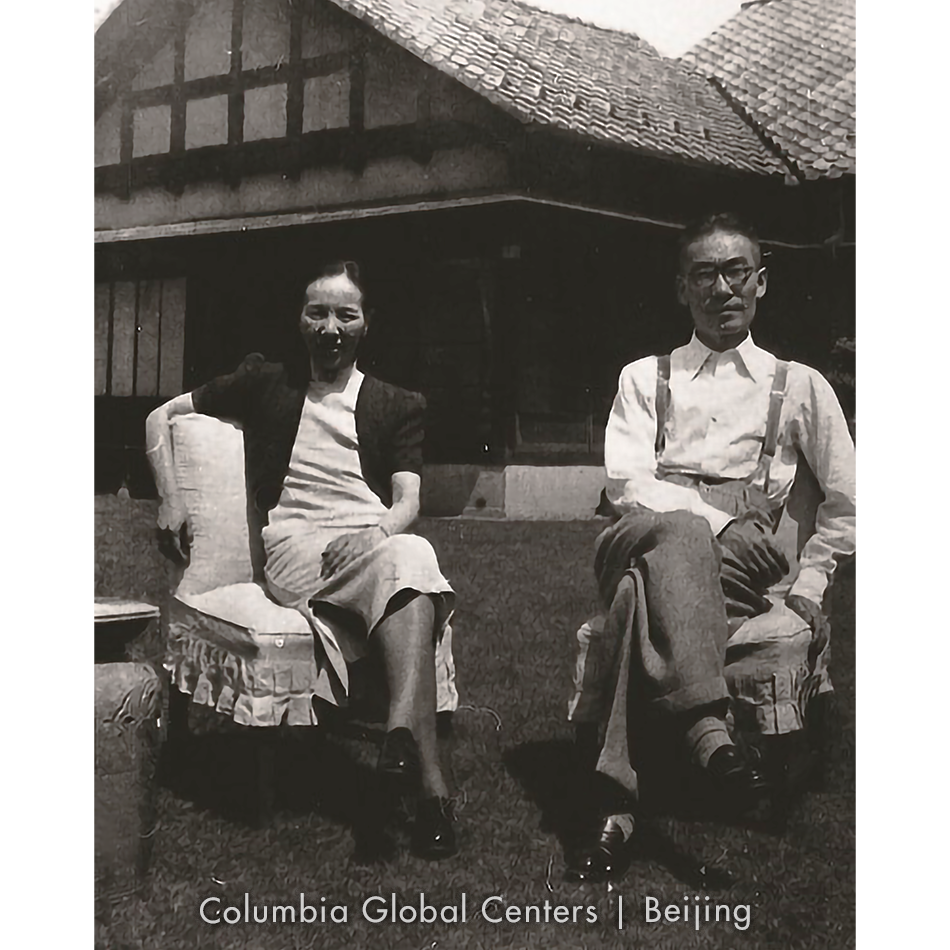
潘光旦 Pan Guangdan
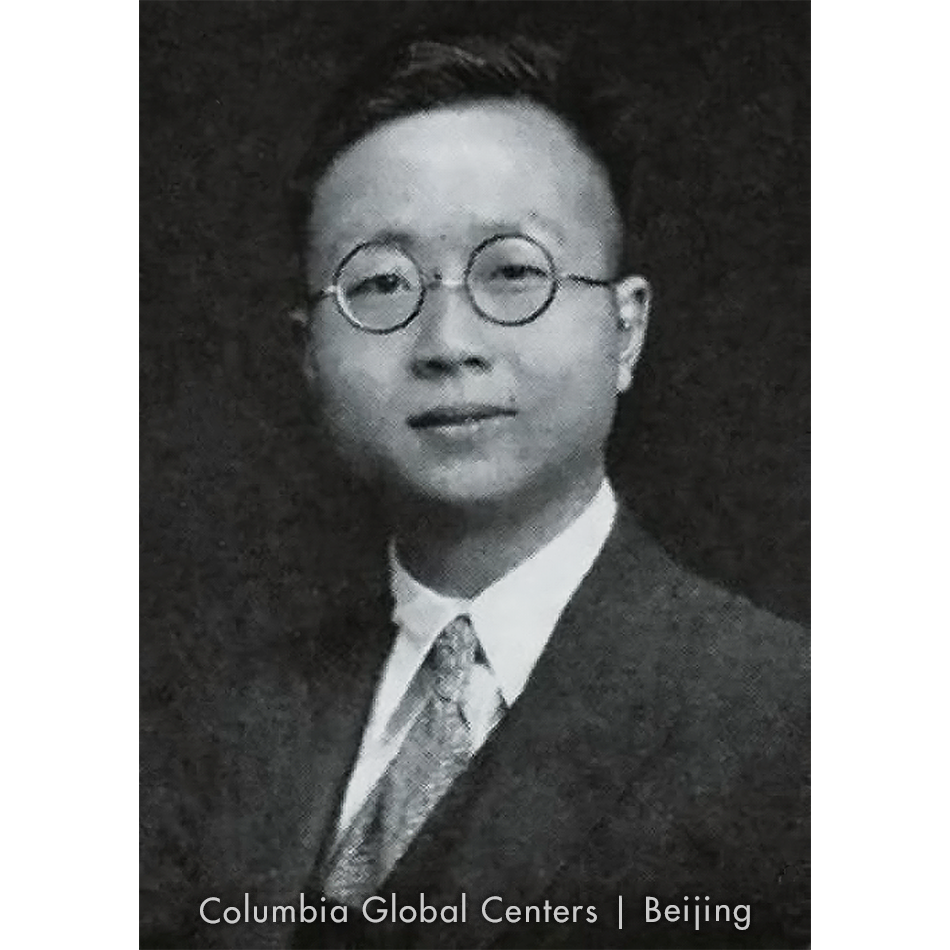
- Entered the Graduate School of Columbia University in 1924 and obtained a Master of Science;
- Sociologist, eugenicist, and ethnologist;
- Devoted his whole life to patriotic democracy, advocated the thought of democracy and freedom, and focused his studies on eugenics, the education system, marriage system, family issues, talent distribution etc.
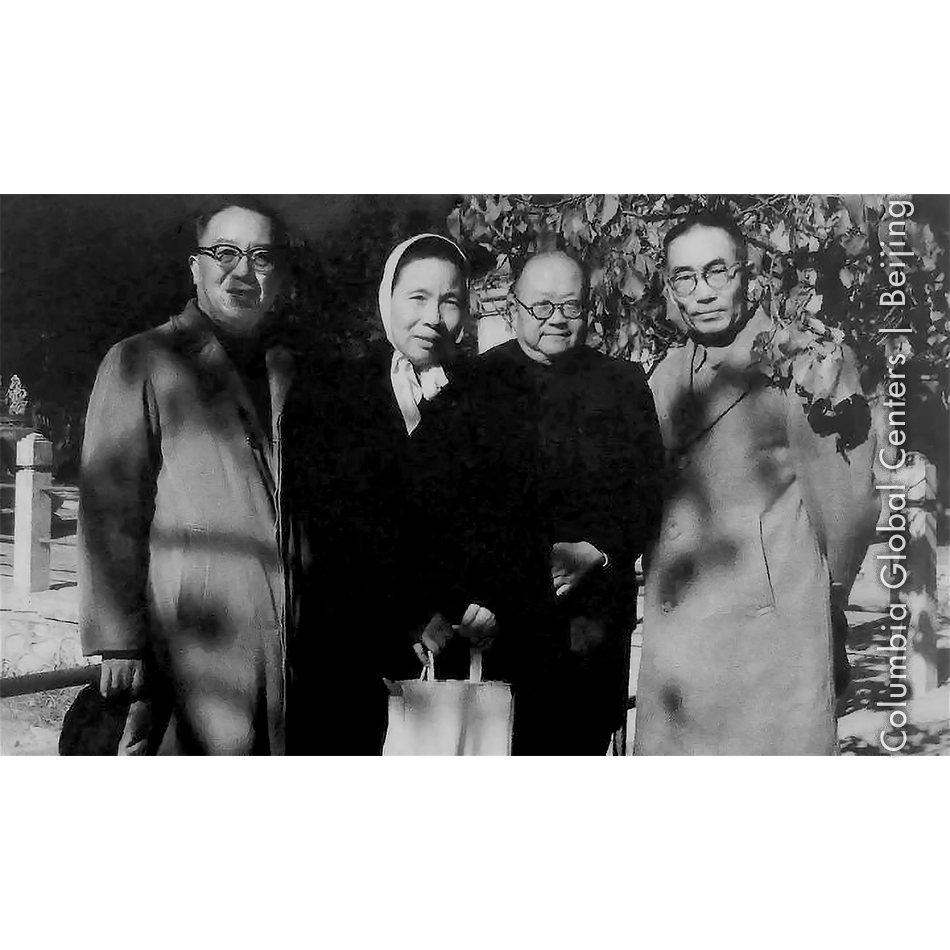
梁实秋 Liang Shih-chiu
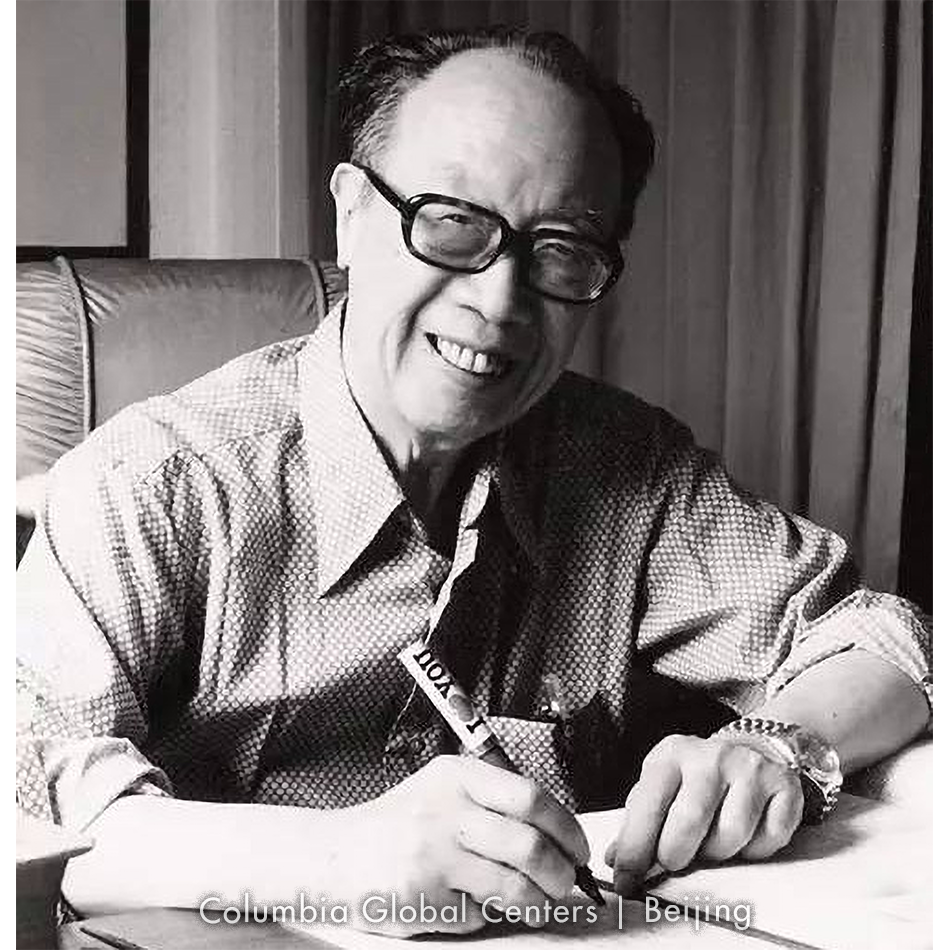
- Entered Columbia University in 1925 to pursue graduate studies;
- Famous literary critic and theorist, translator and lexicographer, was the first person to research and translate the complete works of Shakespeare into Chinese;
- Opened up the “Crescent Moon” Bookstore with Hu Shih and Xu Zhimo in 1927, established the “Crescent Moon” Journal in the following year.
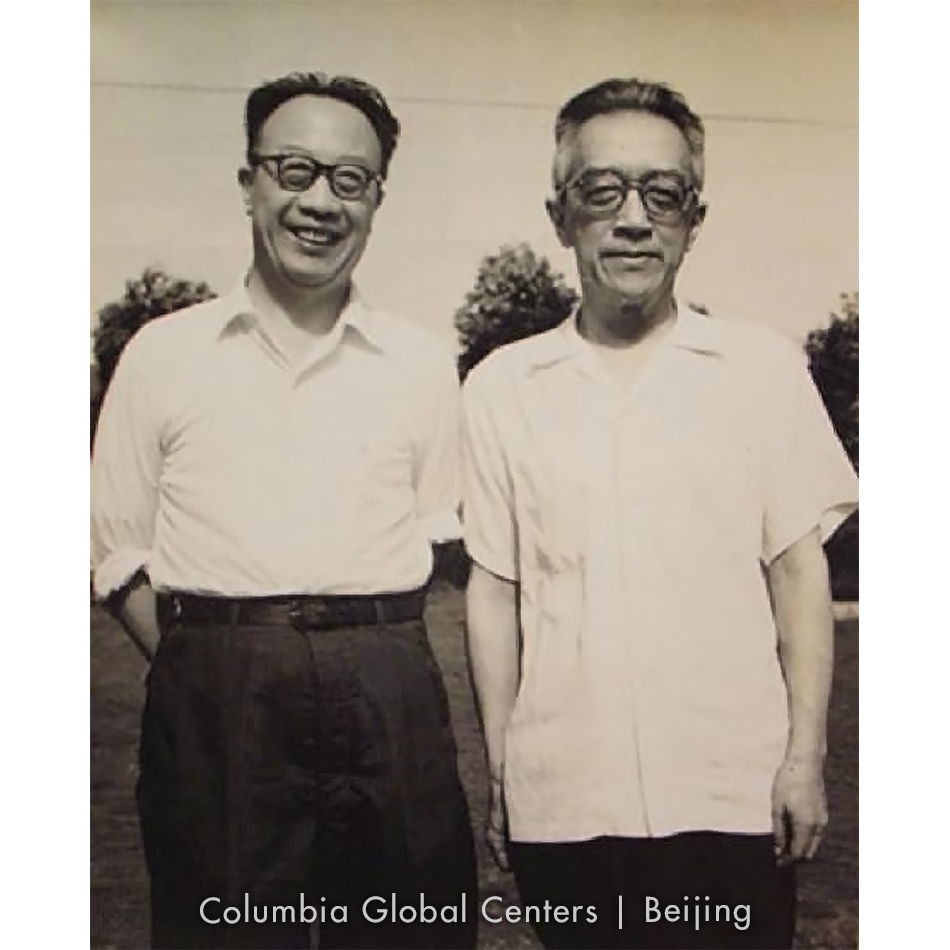
唐敖庆 Au-Chin Tang
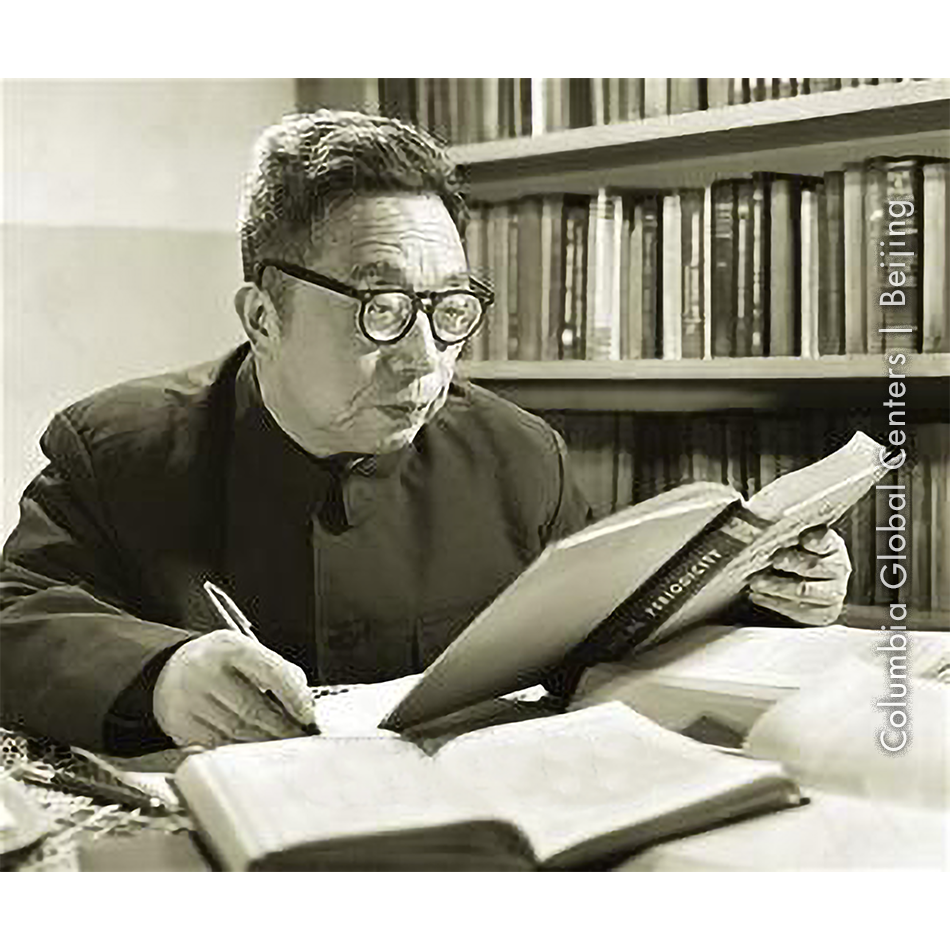
- Received his Ph.D. from Columbia University in 1949;
- Chinese theoretical chemist, educator, academician of Chinese Academy of Sciences, known as "the father of Chinese quantum chemistry";
- Presided over the establishment of the National Natural Science Foundation of China in February 1986, later served as honorary president of Jilin University, honorary director of the National Natural Science Foundation of China, and director of the National Natural Science Awards Committee;
- Hired as an academician of the International Academy of Quantum Molecular Science in 1981;
- Made outstanding contributions to the development of science funds with Chinese characteristics and the prosperity of China's scientific research.
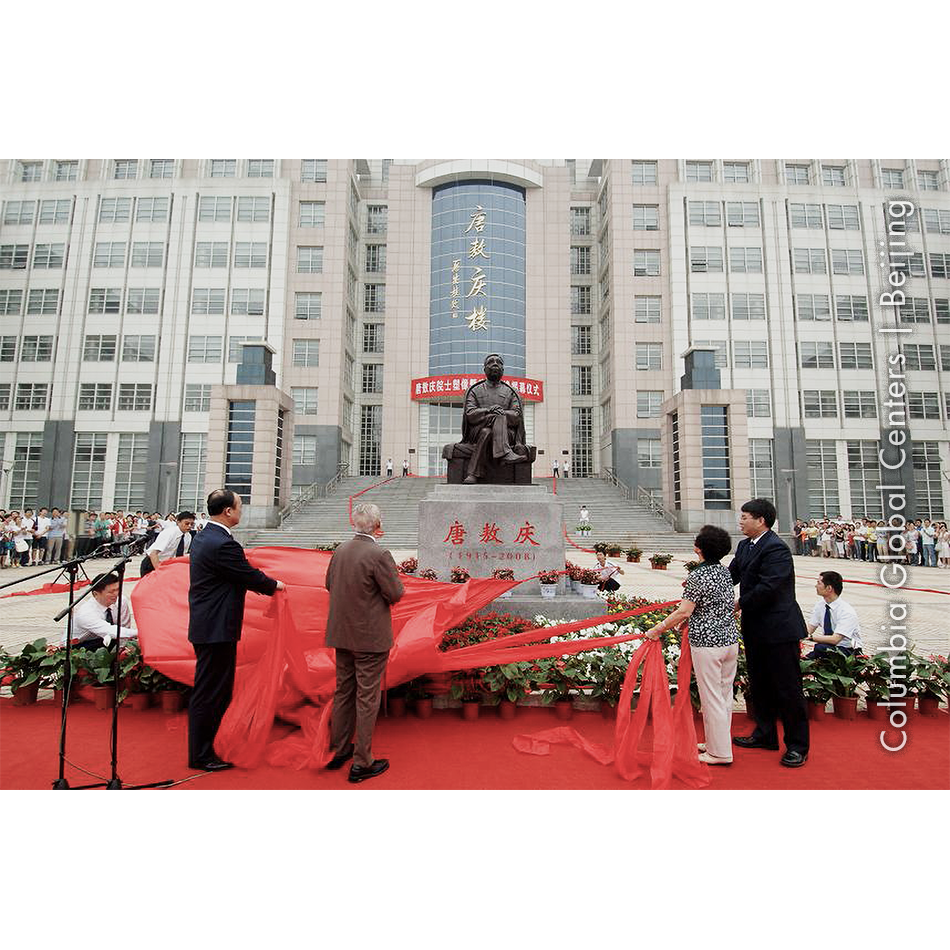
徐光宪 Xu Guangxian
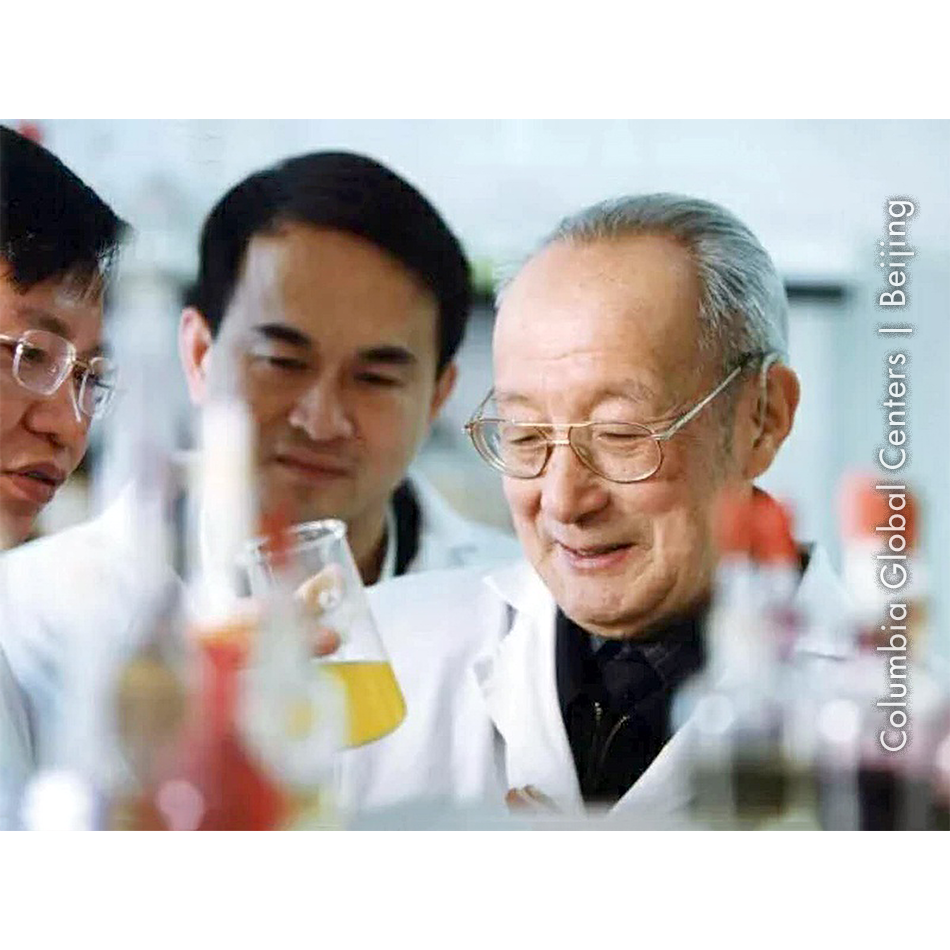
- Received a Ph.D. from Columbia University in 1951 under the tutelage of Professor C.D. Beckmann;
- Chinese physical chemist, inorganic chemist and educator;
- Academician of the Chinese Academy of Sciences, honorary director of the Academic Committee of the State Key Laboratory of Rare Earth Materials Chemistry and Application, known as the "Father of Rare Earth in China" and "Yuan Longping in the Rare Earth Circle";
- Established the Rare Earth Chemistry Research Center of Peking University and the State Key Laboratory of Rare Earth Materials Chemistry and Application, successively served as director, director of the academic committee and honorary director;
- Trained many engineers and technicians for China's rare earth industry.
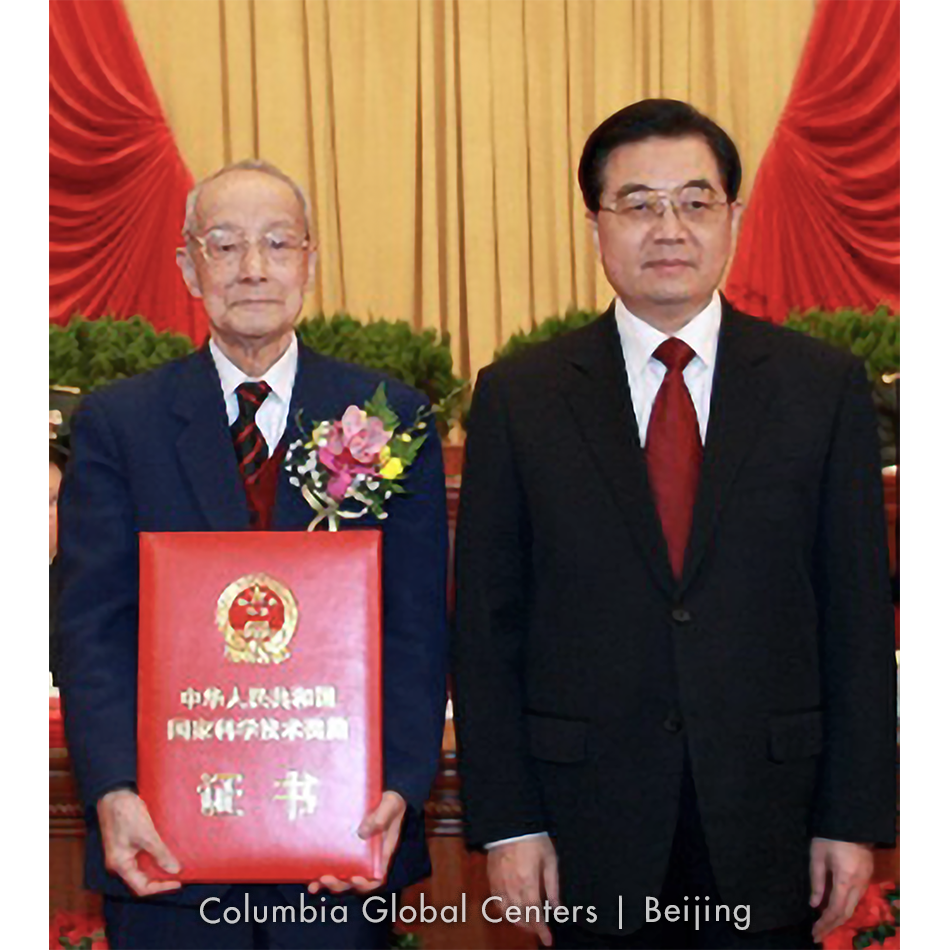
胡应洲 Clyde Y.C. Wu.
- Entered the Columbia University's College of Physicians and Surgeon in 1952 for a doctor degree;
- Served as a member of the Board of Trustees of Columbia University, chaired the Health Sciences Committee, also served on the CUMC Board of Advisors
- Founded several professorships, centers, lecture series and programs in Columbia University, with the latest establishment being the Wu Family China Center for Health Initiatives in 2016;
- Reconnected the partnership between Columbia University and Peking Union Medical College (PUMC) and kept expanding the program in the following years;
- The Wu Fellows Program enabled countless Chinese physician-scientists to acquire advanced medical training and perform research at Columbia University before returning to China for leadership positions.
Faculty of Chinese Origin
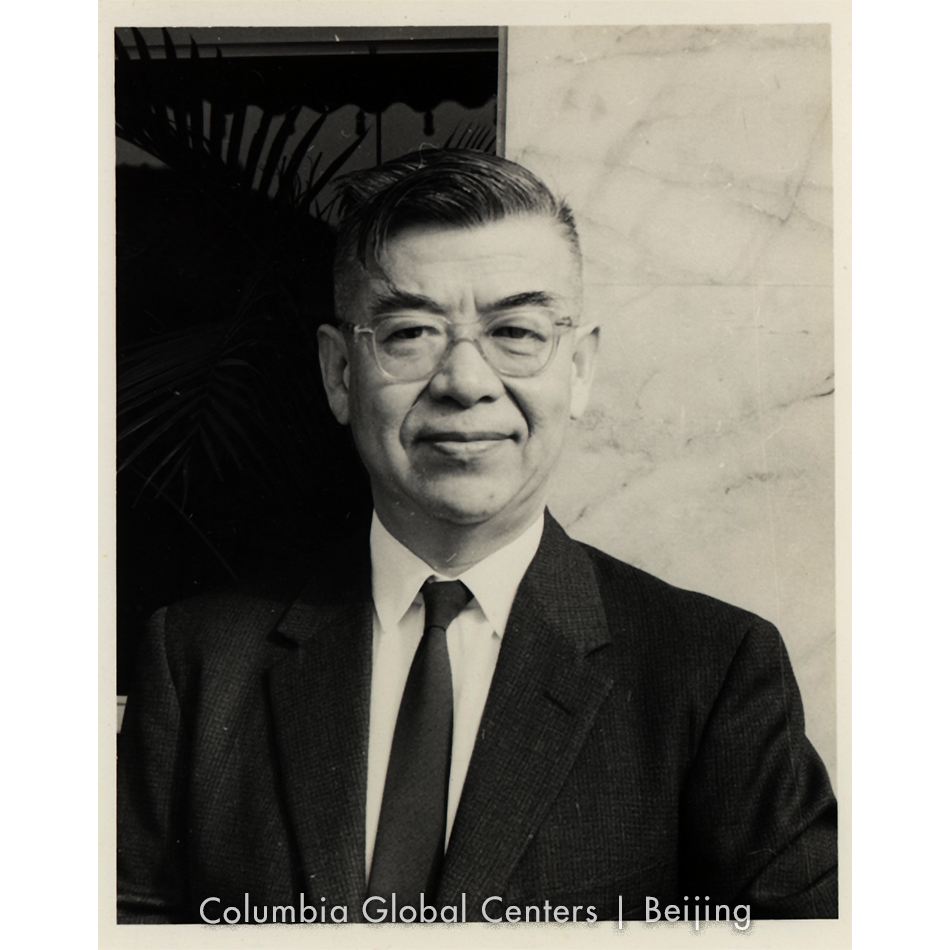
- Worked at Columbia University for two years since the fall of 1947, during which he served as a researcher at the university;
- Famous physicist and educator, known as the father of Chinese physics;
- Famous physicists Yang Chen-Ning, Tsung-Dao Lee and Zhu Guangya are all his students.
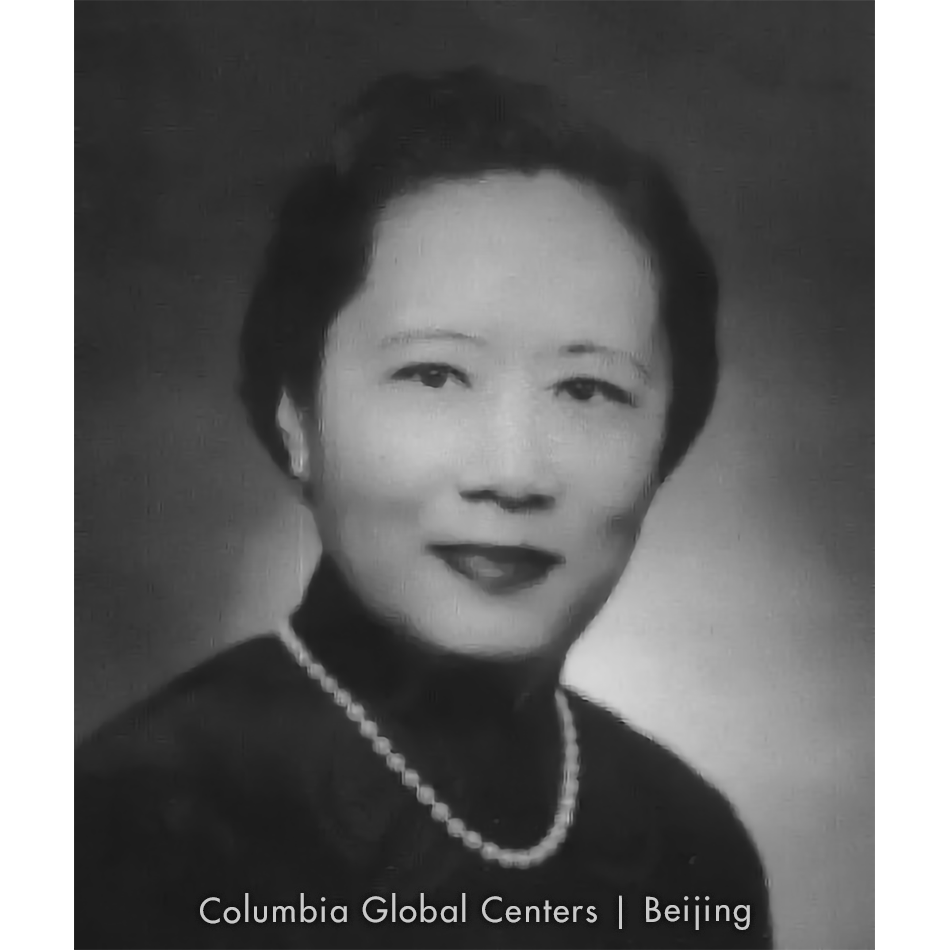
- Entered Columbia University in 1944, served as an associate professor in 1952, promoted to professor in 1958;
- Nuclear physicist, known as “Madam Curie of the East”, “Queen of Nuclear Physics”;
- Elected an academician of the Academia Sinica of the People's Republic of China in 1958;
- Received the Pupin Medal from Columbia University in 1991.
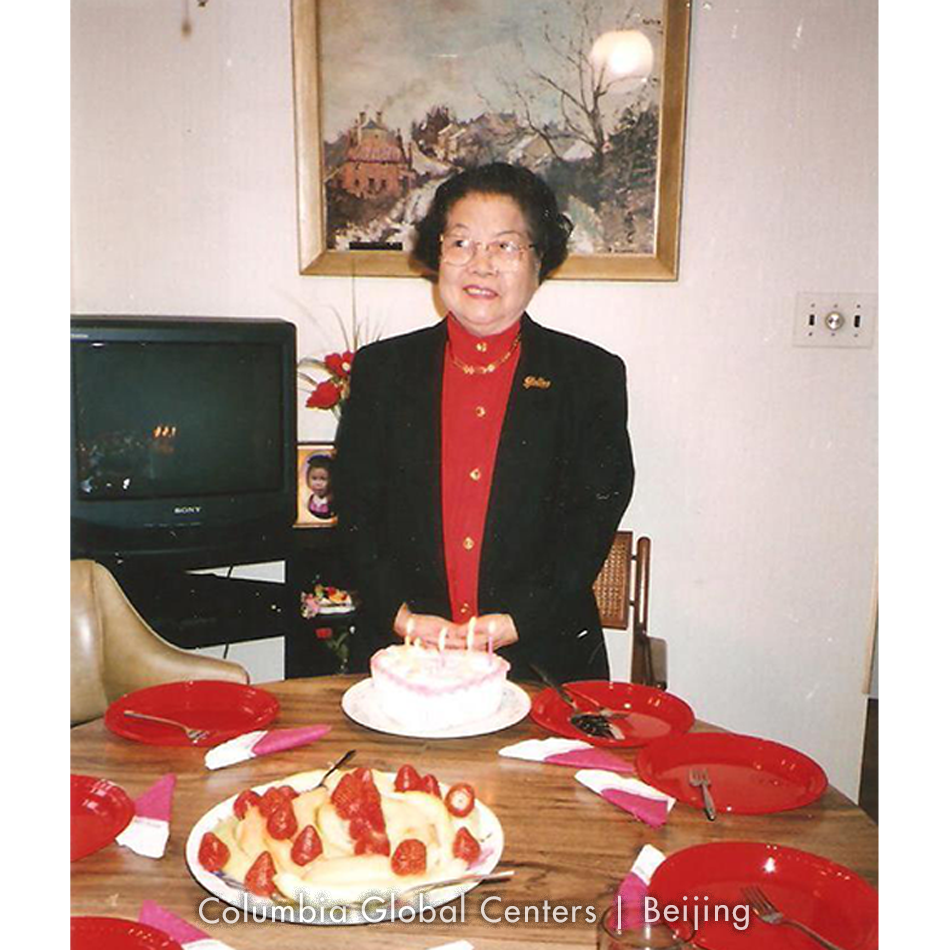
- Taught Chinese at Columbia University from 1953 to 1987;
- Michael Oksenberg and Kenneth Lieberthal and many other diplomats are among her distinguished students;
- Was the translator for President Nixon during his 1972 visit to China.
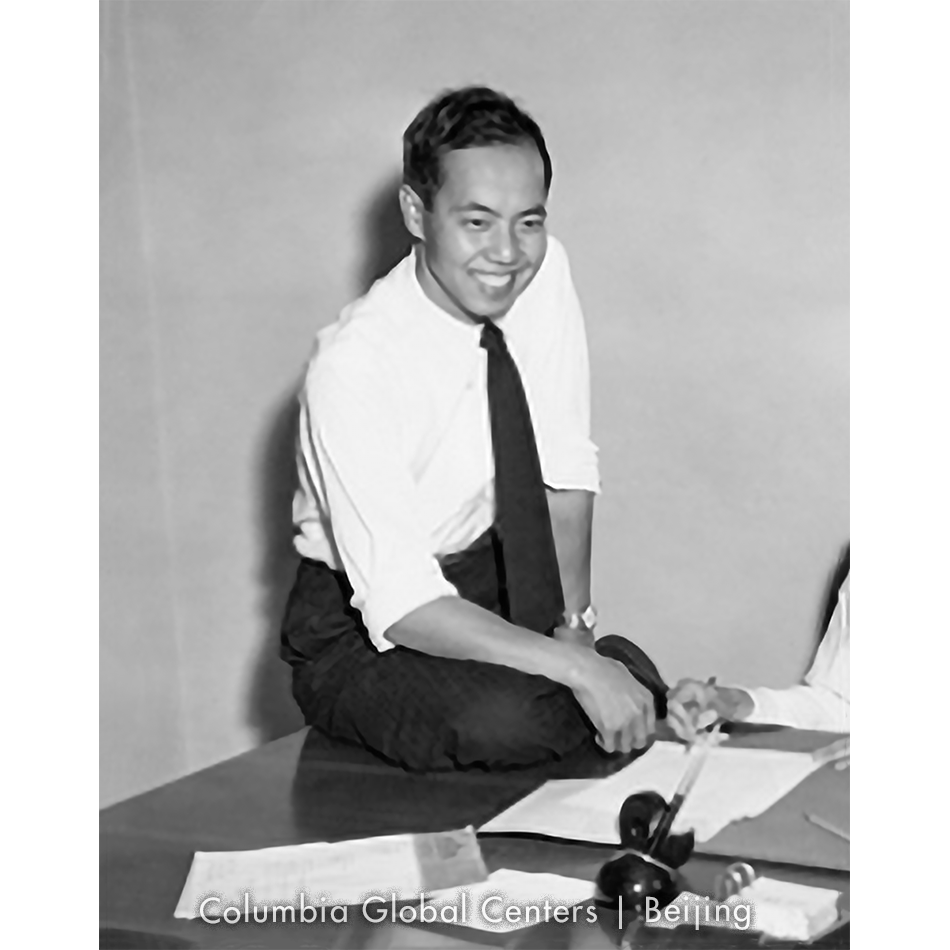
- Laureate of the Nobel Prize in Physics (1957)
- He is still an active professor in Columbia University until this day
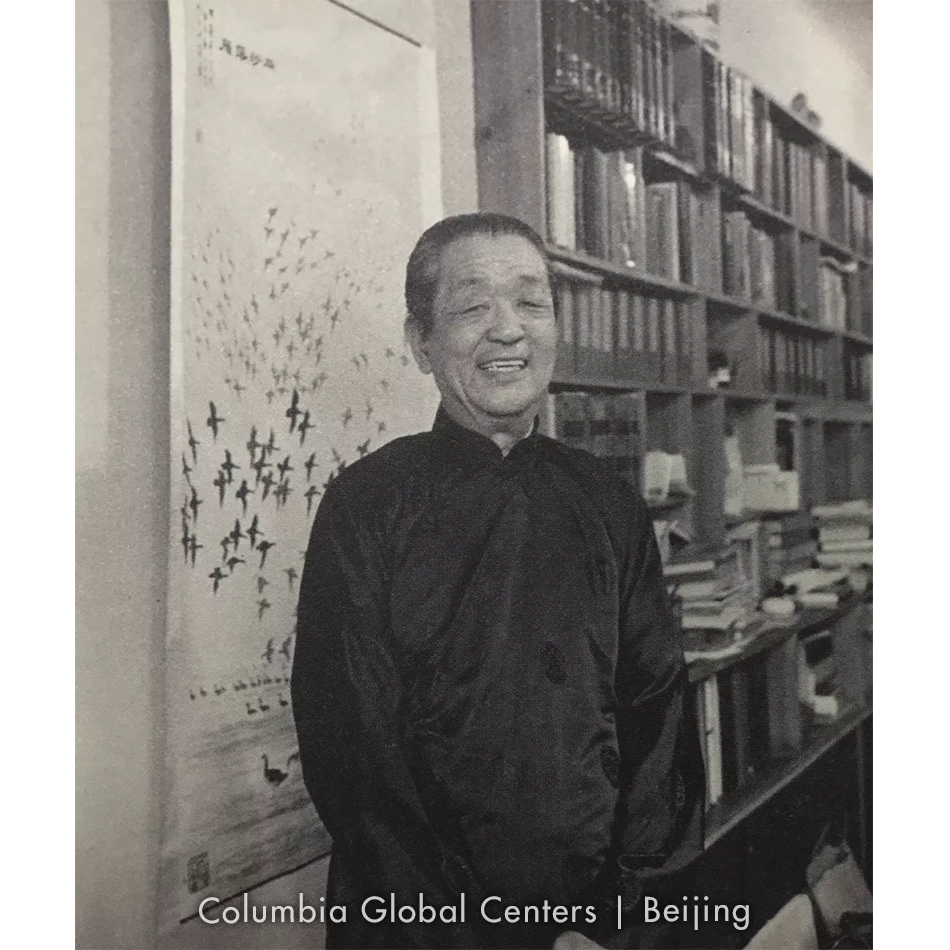
- Taught Chinese literature at the GSAS from 1955 to 1971;
- Was awarded the honorary title Professor Emeritus of Chinese in acknowledgment of his contribution to academia;
- Chiang's first book,The Chinese Eye, helped more westerners gain a better understanding of Chinese culture;
- In 2019, the University of Oxford awarded Jiang a blue plaque in recognition of his contribution to the cultural history of the United Kingdom and China. Of the 900+ blue plaques in London, only 3 were awarded to Chinese.
East Asia-Focused Institutes
-
The East Asian Library has its origins in 1902, when the University Trustees approved the establishment of a Department of Chinese, based on a donation made specifically for that purpose. Frederick Hirth was appointed the first Professor of Chinese at Columbia, as well as the first curator of the Chinese book collection.
-
The C. V. Starr East Asian Library is one of the major collections for the study of East Asia in the United States, with over 1,000,000 volumes of Chinese, Japanese, Korean, Tibetan, Mongol, Manchu, and Western-language materials and almost 7,500 periodical titles, and more than 55 newspapers.
-
The Chinese collection is particularly strong in history, philosophy, traditional literature, and increasingly film studies. The Japanese collection excels in literature, history, and philosophy. The Korean collection is deepest in history and is growing in literature. The Tibetan collection, which originally centered on traditional Tibetan subjects, has expanded to include modern Tibet as well. These primary materials are supported by an extensive collection of secondary materials on East Asian subjects in Western languages.
-
Columbia University has been designated as an East Asian National Resource Center (NRC) by the US Department of Education since 1960.
-
Columbia University's East Asian Institute (renamed the Weatherhead East Asian Institute in 2003) was founded in 1949 in the aftermath of World War II. The Weatherhead East Asian Institute serves as the home of Columbia's NRC and develops new initiatives and educational materials to expand the study of East Asia at Columbia and beyond.
-
Today the Institute is a dynamic hub for interdisciplinary and multinational scholarship and is actively engaged across the University, supporting teaching, research, and programming in the humanities, professional schools, and social sciences.
HONG YEN CHANG CENTER FOR CHINESE LEGAL STUDIES
(张康仁 中国法律研究中心)
-
As of January 1, 2021, As of January 1, 2021, Columbia Law School's Center for Chinese Legal Studies will be known as the Hong Yen Chang Center for Chinese Legal Studies (张康仁 中国法律研究中心), named in honor of the school's first Chinese graduate, Hong Yen Chang, who graduated from Columbia Law School in 1886 and later became the first Chinese American to be admitted as a lawyer in the United States (Read More).
-
The first academic center of its kind in the United States, Columbia Law's Center for Chinese Legal Studies was founded in 1983 by R. Randle "Randy" Edwards, Walter Gellhorn Professor Emeritus of Law, a preeminent authority on Chinese law. Under his leadership, the center produced influential scholarship, fostered scholarly exchanges between China and the United States, and trained generations of students in Chinese law.
-
Today, the center is a world-renowned intellectual hub, bringing together law students and scholars from around the world and supporting research and programming in Chinese Law and related topics. It also serves as a focal point for Chinese students and for China-related activity at Columbia.
Photos and images displayed on this site are from online sources and Columbia University Libraries and archives. They are for non-profit educational purpose only. Please contact us if there is any copyright related dispute over the contents shown above.
References:
1 Yung, Wing. My Life In China And America. Franklin Classics, An Imprint Of Creative Media Partners, 2018.
2 "Professor Tang Shaoyi-Tianjin University:". Tju.Edu.Cn, 2016, http://www.tju.edu.cn/english/info/1072/1284.htm.
3 Mariko, Takegami. "The Origins Of Modern Geology In China: The Work Of D. J. Macgowan And R. Pumpelly". Institute For Research In Humanities, Kyoto University, 2016, Accessed 12 Jan 2021.
4 "Sir Shouson Chow – Director Of Many Hong Kong Firms And Corporations – The Industrial History Of Hong Kong Group". Industrialhistoryhk.Org, 2019, https://industrialhistoryhk.org/sir-shousan-chow/.
5 Robyn, Chris. "Building The Bridge: The Chinese Education Mission To The United States: A Sino-American Historico-Cultural Synthesis, 1872-1881". 1996, Accessed 11 Jan 2021.
6 "Chinese Educational Mission | Earlychinesemit". Earlychinesemit.Mit.Edu, 2021, https://earlychinesemit.mit.edu/chinese-educational-mission#:~:text=%5B2%5D%20The%20students%20attended%20ten,United%20States%2C%201872%E2%80%9381.
7 "Center On Chinese Education | Teachers College Columbia University". Teachers College - Columbia University, 2021, https://www.tc.columbia.edu/coce/.
8 Ma, Xiaowen. "John Dewey's Contributions Remembered 100 Years Later | Columbia Global Centers". Globalcenters.Columbia.Edu, 2021, https://globalcenters.columbia.edu/news/john-deweys-contributions-remembered-100-years-later.
9 Barwick, John. "Zhang Boling | BDCC". Bdcconline.Net, 2021, http://bdcconline.net/en/stories/zhang-boling.
10 "Jiang Menglin | Peking University Library". Lib.Pku.Edu.Cn, 2021, https://www.lib.pku.edu.cn/portal/en/bggk/bgjs/lishiyange/jiangmenglin.
11 "Center On Chinese Education | Teachers College Columbia University". Teachers College - Columbia University, 2021, https://www.tc.columbia.edu/coce/.
12 "Statistics | ISSO". Isso.Columbia.Edu, 2020, https://isso.columbia.edu/content/statistics.
Tang Shaoyi 唐绍仪
[1]华侨华人历史文献档案馆. 近代史文化. http://www.zghqwx.com/zjxs.asp?whichpage=762.
[2]山大视点. 山东大学历史名人之一:唐绍仪校长. https://www.view.sdu.edu.cn/info/1011/38320.htm.
Wellington Koo顾维钧
[1]中华民国史事日志:1926年10月1日,北京内阁改组,顾维钧继杜锡珪代理国务总理并兼外交总长。
[2]纪念《联合国宪章》签署74周年,联大主席呼吁再次唤起《宪章》精神.国际司. http://www.mohrss.gov.cn/SYrlzyhshbzb/rdzt/gjzzrcfw/dtxx/201906/t20190627_321789.html.
Ma Yinchu马寅初
[1]北京大学社会学系. 社会学人类研究所-马寅初. http://www.shehui.pku.edu.cn/second/index.aspx?nodeid=20&page=ContentPage&contentid=1522.
Zhang Pengchun张彭春
[1]南开大学新闻网. 中华读书报:张彭春与“新月派". http://news.nankai.edu.cn/mtnk/system/2008/08/08/000017761.shtml.
[2]Columbia University. Chang, Peng-Chun. https://ccnmtl.columbia.edu/projects/mmt/udhr/biographies/217.html.
Kuo Ping-Wen郭秉文
[1]南京大学新闻网. 1949:从中央大学到南京大学(下). https://news.nju.edu.cn/mtcz/20091208/i96645.html.
[2]东南大学国际合作处. 纪念中国著名教育家郭秉文获得哥伦比亚大学教育学院博士学位100周年. https://oic.seu.edu.cn/_t129/2014/1030/c3255a106485/page.htm.
Dong Ze (Tse)董泽
[1]云南大学校史网. 历任校长-董泽. http://xsw.ynu.edu.cn/info/1008/1237.htm.
Jiang Menglin蒋梦麟
[1]北京大学图书馆. 蒋梦麟. https://www.lib.pku.edu.cn/portal/cn/bggk/bgjs/lishiyange/jiangmenglin.
Tao Xingzhi陶行知
[1]李盛平主编. 中国近现代人名大辞典. 北京:中国国际广播出版社. 1989.04: 604.
[1]陶行知年谱简编. 陶行知研究院-南京晓庄学院. http://tyy.njxzc.edu.cn/8b/d3/c4860a35795/page.htm.
[3]陶行知为渔家子弟创办“昆明学校”. 中国共产党新闻网. http://dangshi.people.com.cn/n/2013/0801/c85037-22408197.html.
[4]Centers on Chinese Education. Feature Article: Teachers College and Chinese Education. https://www.tc.columbia.edu/coce/about-us/feature-article-teachers-college-and-chinese-education/.
Hu Shih胡适
[1]易竹贤. 《胡适传》. 2005年4月第4版. 武汉: 湖北人民出版社. 2005
[2]胡礼忠.(2005).胡适、杜威与实验主义:哥伦比亚大学时期. 史林(04),85-91+124. doi:.
Jen Hung-chun任鸿隽
[1]杨翠华. 任鸿隽与中国近代的科学思想与事业. http://www.mh.sinica.edu.tw/MHDocument/PublicationDetail/PublicationDetail_772.pdf.
Jin Yuelin金岳霖
[1]中国社会科学网. 金岳霖晚年的几件事. http://www.cssn.cn/st/st_hzft/201601/t20160105_2812579.shtml.
Zhang Boling张伯苓
[1]新华网. 南开大学举办纪念张伯苓先生诞辰140周年纪念活动. http://www.xinhuanet.com//politics/2016-04/05/c_128865424.htm.
Hou Debang侯德榜
[1]清华大学. 清华名人名言之侯德榜:我的一切发明都属于祖国. https://www.tsinghua.edu.cn/info/1136/1859.htm.
Zhang Zhirang张志让
[1]复旦大学文库. 张志让. http://202.120.230.17/scholar/%E5%BC%A0%E5%BF%97%E8%AE%A9.
Xu Zhimo徐志摩
[1]韩石山. 徐志摩传[M].北京:十月文艺出版社,2000.
[2]中国文化研究院. 徐志摩. https://chiculture.org.hk/sc/china-five-thousand-years/2504.
[3]王纯磊.徐志摩在美国的留学岁月[J].档案与建设,2017(11):62-63.
Feng Youlan冯友兰
[1]复旦大学. 先生之风-冯友兰. http://fdjpkc.fudan.edu.cn/d201023/p10885c10871/list.htm.
Yuan T'ung-li袁同礼
[1]北京大学图书馆. 袁同礼资料. https://www.lib.pku.edu.cn/portal/cn/bggk/bgjs/lishiyange/yuantongli.
[2]中国图书馆学会. 中国图书馆学会简介. http://www.lsc.org.cn/cns/channels/1297.html.
[3]王成志(2012). 袁同礼先生和哥伦比亚大学. 天禄论丛:中国研究图书馆员学会学刊(简体中文),2(),150-163.
Xu Dishan许地山
[1]中国文化研究院. 五四文学新貌的作家. https://chiculture.org.hk/sc/china-five-thousand-years/422.
Wu Wenzao吴文藻
[1]人类学乾坤. 吴文藻先生. http://ca101.cn/news_show.aspx?id=179.
[2]吴文藻.吴文藻自传.晋阳学刊,1982(6):44-52.
[3]中国社会科学院民族学与人类学研究所. 机构人员-中国民族学学会. http://103.247.176.245/iea/depts-27.htm.
Pan Guangdan潘光旦
[1]潘光旦. (1997). 寻求中国人位育之道:潘光旦文选. 寻求中国人位育之道:潘光旦文选. 国际文化出版公司.
Liang Shih-chiu 梁实秋
[1]From a Cottager’s Sketchbook. Columbia University Press. http://cup.columbia.edu/book/from-a-cottagers-sketchbook/9789629962180
Au-Chin Tang唐敖庆
[1]中国科学院学部. 院士信息-唐敖庆. http://casad.cas.cn/sourcedb_ad_cas/zw2/ysxx/ygysmd/200906/t20090624_1809756.html.
Xu Guangxian徐光宪
[1]科技部门户. 2008年度国家最高科学技术获奖人. http://www.most.gov.cn/ztzl/gjkxjsjldh/jldh2008/jldh08jlgg/200901/t20090109_66615.htm.
[2]中国科学院学部. 院士信息-徐光宪. http://casad.cas.cn/sourcedb_ad_cas/zw2/ysxx/ygysmd/200906/t20090624_1802100.html.
[3]人民网. “稀土之父”徐光宪辞世,获博士学位当年便回国. http://edu.people.com.cn/n/2015/0428/c1006-26919668.html.
Wu Ta-you吴大猷
[1]吴大猷学术基金会. 关于吴大猷博士. https://www.phys.sinica.edu.tw/~tywufund/introduction.html.
Chien-Shiung Wu吴健雄
[1]Atomic Heritage Foundation. Chien-Shiung Wu. https://www.atomicheritage.org/profile/chien-shiung-wu.
[2]Columbia University in the City of New York. Famed Physicist Chien-Shiung Wu Dies at 84. http://www.columbia.edu/cu/record/archives/vol22/vol22_iss15/record2215.16.html.
[3]Columbia 250. Chien-Shiung Wu. https://c250.columbia.edu/c250_celebrates/remarkable_columbians/chien-shiung_wu.html.
